- Our Writers
- How to Order
- Assignment Writing Service
- Report Writing Service
- Buy Coursework
- Dissertation Writing Service
- Research Paper Writing Service
- All Essay Services
- Buy Research Paper
- Buy Term Paper
- Buy Dissertation
- Buy Case study
- Buy Presentation
- Buy Personal statement
Speech Writing
Speech Examples

20+ Outstanding Speech Examples for Your Help
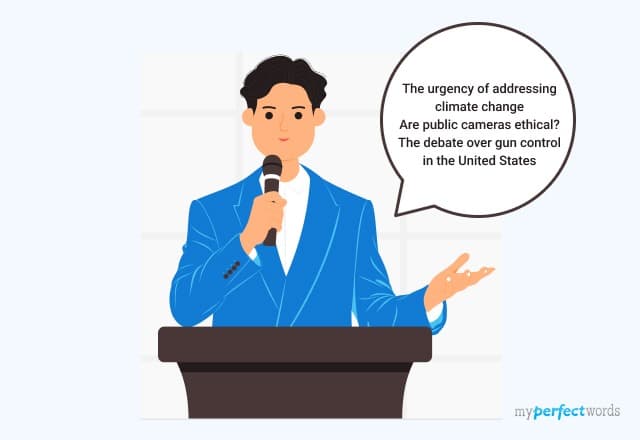
People also read
The 10 Key Steps for Perfect Speech Writing
Understanding Speech Format - Simple Steps for Outlining
How to Start A Speech - 13 Interesting Ideas & Examples
Common Types of Speeches that Every Speechwriter Should Know
Good Impromptu Speech Topics for Students
Entertaining Speech Topics for Your Next Debate
How to Write a Special Occasion Speech: Types, Tips, and Examples
Introduction Speech - A Step-by-Step Guide & Examples
How to Write the Best Acceptance Speech for Your Audience?
Presentation Speech - An Ultimate Writing Guide
Commemorative Speech - Writing Guide, Outline & Examples
Farewell Speech - Writing Tips & Examples
How to Write an Extemporaneous Speech? A Step-by-Step Guide
Crafting the Perfect Graduation Speech: A Guide with Examples
Public speaking can be daunting for students. They often struggle to start, engage the audience, and be memorable.
It's a fear of forgetting words or losing the audience's interest. This leads to anxiety and self-doubt.
You may wonder, "Am I boring them? Will they remember what I say? How can I make my speech better?"
The solution lies in speech examples. In this guide, we'll explore these examples to help students create captivating and memorable speeches with confidence. So, keep reading to find helpful examples!
- 1. Speech Examples
- 2. Tips to Write a Good Speech
Speech Examples
Talking in front of a bunch of audiences is not as easy as it seems. But, if you have some good content to deliver or share with the audience, the confidence comes naturally.
Before you start writing your speech, it is a good idea that you go through some good speech samples. The samples will help to learn how to start the speech and put information into a proper structure.
Speech Examples for Students
Speech writing is a huge part of academic life. These types of writing help enhance the creative writing skills of students.
Here is an amazing farewell speech sample for students to get you inspired.
Below, you will find other downloadable PDF samples.
Speech Examples for School
Every school and college has a student council. And every year, students elect themselves to be a part of the student council. It is mandatory to impress the student audience to get their votes. And for that, the candidate has to give an impressive speech.
Here are some short speech examples for students.
Speech Examples For Public Speaking
Speech Examples About Yourself
Speech Examples Short
Speech Examples For College Students
Speech For Student Council
Speech Examples Introduction
Speech Example For School
2 Minute Speech Examples
Persuasive Speech Examples
The main purpose of a speech is to persuade the audience or convince them of what you say. And when it comes to persuasive speech , the sole purpose of speech becomes more specific.
Persuasive Speech Example
Informative Speech Examples
Informative speeches are intended to inform the audience. These types of speeches are designed to provide a detailed description of the chosen topic.
Below we have provided samples of informative speech for you.
Informative Speech Example
Informative Speech Sample
Entertainment Speech Examples
Entertainment speeches are meant to entertain the audience. These types of speeches are funny, as well as interesting. The given speech samples will help you in writing an entertaining speech.
Entertainment Speech Example
Entertainment Speech Sample
Argumentative Speech Examples
Making a strong argument that is capable of convincing others is always difficult. And, when it comes to making a claim in an argumentative speech, it becomes more difficult.
Check out the argumentative speech sample that demonstrates explicitly how an argumentative speech needs to be written.
Argumentative Speech Example
Demonstration Speech Examples
The demonstrative speeches are intended to demonstrate or describe the speech topic in depth. Get inspired by the demonstrative speech sample given below and write a captivating demonstrative speech.
Demonstration Speech Example
Demonstration Speech Sample
Motivational Speech Examples
Motivational speeches are designed to motivate the audience to do something. Read out the sample motivational speech given below and learn the art of motivational speech writing.
Speech Examples About Life
Impromptu Speech Examples
Impromptu speech writing makes you nervous as you are not good at planning and organization.
Check out the sample impromptu speech and learn to make bullet points of your thoughts and plan your speech properly.
Graduation Speech Examples
Are you graduating soon and need to write a graduation farewell speech?
Below is a sample graduation speech for your help.
Wedding Speech Examples
“My best friend’s wedding is next week, and I’m the maid of honor. She asked me to give the maid of honor speech, but I’m not good at expressing emotions. I’m really stressed. I don’t know what to do.”
If you are one of these kinds of people who feel the same way, this sample is for you. Read the example given below and take help from it to write a special maid of honor speech.
Best Man Speech Examples
Father of The Bride Speech Example
Speech Essay Example
A speech essay is a type of essay that you write before writing a proper speech. It helps in organizing thoughts and information.
Here is a sample of speech essays for you to understand the difference between speech format and speech essay format.
Tips to Write a Good Speech
Reading some famous and incredible sample speeches before writing your own speech is really a good idea. The other way to write an impressive speech is to follow the basic tips given by professional writers.
- Audience Analysis: Understand your audience's interests, knowledge, and expectations. Tailor your speech to resonate with them.
- Clear Purpose: Define a clear and concise purpose for your speech. Ensure your audience knows what to expect right from the beginning.
- Engaging Opening: Start with a captivating hook – a story, question, quote, or surprising fact to grab your audience's attention.
- Main Message: Identify and convey your main message or thesis throughout your speech.
- Logical Structure: Organize your speech with a clear structure, including an introduction, body, and conclusion.
- Transitions: Use smooth transitions to guide your audience through different parts of your speech.
- Conversational Tone: Use simple, conversational language to make your speech accessible to everyone.
- Timing: Respect the allocated time and write the speech accordingly. An overly long or short speech can diminish the audience's engagement.
- Emotional Connection: Use storytelling and relatable examples to evoke emotions and connect with your audience.
- Call to Action (if appropriate): Encourage your audience to take action, change their thinking, or ponder new ideas.
- Practice Natural Pace: Speak at a natural pace, avoiding rushing or speaking too slowly.
So, now you know that effective communication is a powerful tool that allows you to inform, persuade, and inspire your audience. Throughout this blog, we've provided you with numerous examples and invaluable tips to help you craft a compelling speech.
And for those moments when you require a professionally written speech that truly stands out, remember that our team is here to help. We can rescue you from writer's block and deliver an outstanding speech whenever you need it.
With our professional essay writing service , you can be confident in your ability to communicate your message effectively and leave a lasting impact.
So, don't hesitate – place an order n ow and buy speech that will truly captivate your audience.
Frequently Asked Questions
What are some examples of good speeches.
Good speeches often leave a lasting impact due to their content, delivery, and emotional resonance. Examples include:
- Martin Luther King Jr.'s "I Have a Dream"
- Steve Jobs' 2005 Stanford Commencement Address
- Winston Churchill's "We Shall Fight on the Beaches"
What is a 5 minute speech?
A 5-minute speech is a brief address of about 600-800 words, designed to cover key points comprehensively while maintaining audience attention. This format is ideal for classroom presentations, briefings, or public events with limited time.
What is an example of a speech of introduction?
A speech of introduction is designed to welcome and introduce a speaker to an audience, providing relevant background and context. Here’s an example:
Ladies and Gentlemen,
It is my great pleasure to introduce our esteemed guest speaker, Dr. Jane Smith. A renowned environmental scientist with over 20 years of experience in climate change research, Dr. Smith has published groundbreaking studies on sustainable energy solutions and has been a pivotal voice in international climate policy. Today, she will share her insights on the latest developments in renewable energy and how we can all contribute to a more sustainable future. Please join me in welcoming Dr. Jane Smith.

Write Essay Within 60 Seconds!

Dr. Barbara is a highly experienced writer and author who holds a Ph.D. degree in public health from an Ivy League school. She has worked in the medical field for many years, conducting extensive research on various health topics. Her writing has been featured in several top-tier publications.

Paper Due? Why Suffer? That’s our Job!
Keep reading


How it works
Transform your enterprise with the scalable mindsets, skills, & behavior change that drive performance.
Explore how BetterUp connects to your core business systems.
We pair AI with the latest in human-centered coaching to drive powerful, lasting learning and behavior change.
Build leaders that accelerate team performance and engagement.
Unlock performance potential at scale with AI-powered curated growth journeys.
Build resilience, well-being and agility to drive performance across your entire enterprise.
Transform your business, starting with your sales leaders.
Unlock business impact from the top with executive coaching.
Foster a culture of inclusion and belonging.
Accelerate the performance and potential of your agencies and employees.
See how innovative organizations use BetterUp to build a thriving workforce.
Discover how BetterUp measurably impacts key business outcomes for organizations like yours.
A demo is the first step to transforming your business. Meet with us to develop a plan for attaining your goals.

- What is coaching?
Learn how 1:1 coaching works, who its for, and if it's right for you.
Accelerate your personal and professional growth with the expert guidance of a BetterUp Coach.
Types of Coaching
Navigate career transitions, accelerate your professional growth, and achieve your career goals with expert coaching.
Enhance your communication skills for better personal and professional relationships, with tailored coaching that focuses on your needs.
Find balance, resilience, and well-being in all areas of your life with holistic coaching designed to empower you.
Discover your perfect match : Take our 5-minute assessment and let us pair you with one of our top Coaches tailored just for you.

Research, expert insights, and resources to develop courageous leaders within your organization.
Best practices, research, and tools to fuel individual and business growth.
View on-demand BetterUp events and learn about upcoming live discussions.
The latest insights and ideas for building a high-performing workplace.
- BetterUp Briefing
The online magazine that helps you understand tomorrow's workforce trends, today.
Innovative research featured in peer-reviewed journals, press, and more.
Founded in 2022 to deepen the understanding of the intersection of well-being, purpose, and performance
We're on a mission to help everyone live with clarity, purpose, and passion.
Join us and create impactful change.
Read the buzz about BetterUp.
Meet the leadership that's passionate about empowering your workforce.

For Business
For Individuals
How to write a speech that your audience remembers

Whether in a work meeting or at an investor panel, you might give a speech at some point. And no matter how excited you are about the opportunity, the experience can be nerve-wracking .
But feeling butterflies doesn’t mean you can’t give a great speech. With the proper preparation and a clear outline, apprehensive public speakers and natural wordsmiths alike can write and present a compelling message. Here’s how to write a good speech you’ll be proud to deliver.
What is good speech writing?
Good speech writing is the art of crafting words and ideas into a compelling, coherent, and memorable message that resonates with the audience. Here are some key elements of great speech writing:
- It begins with clearly understanding the speech's purpose and the audience it seeks to engage.
- A well-written speech clearly conveys its central message, ensuring that the audience understands and retains the key points.
- It is structured thoughtfully, with a captivating opening, a well-organized body, and a conclusion that reinforces the main message.
- Good speech writing embraces the power of engaging content, weaving in stories, examples, and relatable anecdotes to connect with the audience on both intellectual and emotional levels.
Ultimately, it is the combination of these elements, along with the authenticity and delivery of the speaker , that transforms words on a page into a powerful and impactful spoken narrative.
What makes a good speech?
A great speech includes several key qualities, but three fundamental elements make a speech truly effective:
Clarity and purpose
Remembering the audience, cohesive structure.
While other important factors make a speech a home run, these three elements are essential for writing an effective speech.
The main elements of a good speech
The main elements of a speech typically include:
- Introduction: The introduction sets the stage for your speech and grabs the audience's attention. It should include a hook or attention-grabbing opening, introduce the topic, and provide an overview of what will be covered.
- Opening/captivating statement: This is a strong statement that immediately engages the audience and creates curiosity about the speech topics.
- Thesis statement/central idea: The thesis statement or central idea is a concise statement that summarizes the main point or argument of your speech. It serves as a roadmap for the audience to understand what your speech is about.
- Body: The body of the speech is where you elaborate on your main points or arguments. Each point is typically supported by evidence, examples, statistics, or anecdotes. The body should be organized logically and coherently, with smooth transitions between the main points.
- Supporting evidence: This includes facts, data, research findings, expert opinions, or personal stories that support and strengthen your main points. Well-chosen and credible evidence enhances the persuasive power of your speech.
- Transitions: Transitions are phrases or statements that connect different parts of your speech, guiding the audience from one idea to the next. Effective transitions signal the shifts in topics or ideas and help maintain a smooth flow throughout the speech.
- Counterarguments and rebuttals (if applicable): If your speech involves addressing opposing viewpoints or counterarguments, you should acknowledge and address them. Presenting counterarguments makes your speech more persuasive and demonstrates critical thinking.
- Conclusion: The conclusion is the final part of your speech and should bring your message to a satisfying close. Summarize your main points, restate your thesis statement, and leave the audience with a memorable closing thought or call to action.
- Closing statement: This is the final statement that leaves a lasting impression and reinforces the main message of your speech. It can be a call to action, a thought-provoking question, a powerful quote, or a memorable anecdote.
- Delivery and presentation: How you deliver your speech is also an essential element to consider. Pay attention to your tone, body language, eye contact , voice modulation, and timing. Practice and rehearse your speech, and try using the 7-38-55 rule to ensure confident and effective delivery.
While the order and emphasis of these elements may vary depending on the type of speech and audience, these elements provide a framework for organizing and delivering a successful speech.

How to structure a good speech
You know what message you want to transmit, who you’re delivering it to, and even how you want to say it. But you need to know how to start, develop, and close a speech before writing it.
Think of a speech like an essay. It should have an introduction, conclusion, and body sections in between. This places ideas in a logical order that the audience can better understand and follow them. Learning how to make a speech with an outline gives your storytelling the scaffolding it needs to get its point across.
Here’s a general speech structure to guide your writing process:
- Explanation 1
- Explanation 2
- Explanation 3
How to write a compelling speech opener
Some research shows that engaged audiences pay attention for only 15 to 20 minutes at a time. Other estimates are even lower, citing that people stop listening intently in fewer than 10 minutes . If you make a good first impression at the beginning of your speech, you have a better chance of interesting your audience through the middle when attention spans fade.
Implementing the INTRO model can help grab and keep your audience’s attention as soon as you start speaking. This acronym stands for interest, need, timing, roadmap, and objectives, and it represents the key points you should hit in an opening.
Here’s what to include for each of these points:
- Interest : Introduce yourself or your topic concisely and speak with confidence . Write a compelling opening statement using relevant data or an anecdote that the audience can relate to.
- Needs : The audience is listening to you because they have something to learn. If you’re pitching a new app idea to a panel of investors, those potential partners want to discover more about your product and what they can earn from it. Read the room and gently remind them of the purpose of your speech.
- Timing : When appropriate, let your audience know how long you’ll speak. This lets listeners set expectations and keep tabs on their own attention span. If a weary audience member knows you’ll talk for 40 minutes, they can better manage their energy as that time goes on.
- Routemap : Give a brief overview of the three main points you’ll cover in your speech. If an audience member’s attention starts to drop off and they miss a few sentences, they can more easily get their bearings if they know the general outline of the presentation.
- Objectives : Tell the audience what you hope to achieve, encouraging them to listen to the end for the payout.
Writing the middle of a speech
The body of your speech is the most information-dense section. Facts, visual aids, PowerPoints — all this information meets an audience with a waning attention span. Sticking to the speech structure gives your message focus and keeps you from going off track, making everything you say as useful as possible.
Limit the middle of your speech to three points, and support them with no more than three explanations. Following this model organizes your thoughts and prevents you from offering more information than the audience can retain.
Using this section of the speech to make your presentation interactive can add interest and engage your audience. Try including a video or demonstration to break the monotony. A quick poll or survey also keeps the audience on their toes.
Wrapping the speech up
To you, restating your points at the end can feel repetitive and dull. You’ve practiced countless times and heard it all before. But repetition aids memory and learning , helping your audience retain what you’ve told them. Use your speech’s conclusion to summarize the main points with a few short sentences.
Try to end on a memorable note, like posing a motivational quote or a thoughtful question the audience can contemplate once they leave. In proposal or pitch-style speeches, consider landing on a call to action (CTA) that invites your audience to take the next step.

How to write a good speech
If public speaking gives you the jitters, you’re not alone. Roughly 80% of the population feels nervous before giving a speech, and another 10% percent experiences intense anxiety and sometimes even panic.
The fear of failure can cause procrastination and can cause you to put off your speechwriting process until the last minute. Finding the right words takes time and preparation, and if you’re already feeling nervous, starting from a blank page might seem even harder.
But putting in the effort despite your stress is worth it. Presenting a speech you worked hard on fosters authenticity and connects you to the subject matter, which can help your audience understand your points better. Human connection is all about honesty and vulnerability, and if you want to connect to the people you’re speaking to, they should see that in you.
1. Identify your objectives and target audience
Before diving into the writing process, find healthy coping strategies to help you stop worrying . Then you can define your speech’s purpose, think about your target audience, and start identifying your objectives. Here are some questions to ask yourself and ground your thinking :
- What purpose do I want my speech to achieve?
- What would it mean to me if I achieved the speech’s purpose?
- What audience am I writing for?
- What do I know about my audience?
- What values do I want to transmit?
- If the audience remembers one take-home message, what should it be?
- What do I want my audience to feel, think, or do after I finish speaking?
- What parts of my message could be confusing and require further explanation?
2. Know your audience
Understanding your audience is crucial for tailoring your speech effectively. Consider the demographics of your audience, their interests, and their expectations. For instance, if you're addressing a group of healthcare professionals, you'll want to use medical terminology and data that resonate with them. Conversely, if your audience is a group of young students, you'd adjust your content to be more relatable to their experiences and interests.
3. Choose a clear message
Your message should be the central idea that you want your audience to take away from your speech. Let's say you're giving a speech on climate change. Your clear message might be something like, "Individual actions can make a significant impact on mitigating climate change." Throughout your speech, all your points and examples should support this central message, reinforcing it for your audience.
4. Structure your speech
Organizing your speech properly keeps your audience engaged and helps them follow your ideas. The introduction should grab your audience's attention and introduce the topic. For example, if you're discussing space exploration, you could start with a fascinating fact about a recent space mission. In the body, you'd present your main points logically, such as the history of space exploration, its scientific significance, and future prospects. Finally, in the conclusion, you'd summarize your key points and reiterate the importance of space exploration in advancing human knowledge.
5. Use engaging content for clarity
Engaging content includes stories, anecdotes, statistics, and examples that illustrate your main points. For instance, if you're giving a speech about the importance of reading, you might share a personal story about how a particular book changed your perspective. You could also include statistics on the benefits of reading, such as improved cognitive abilities and empathy.
6. Maintain clarity and simplicity
It's essential to communicate your ideas clearly. Avoid using overly technical jargon or complex language that might confuse your audience. For example, if you're discussing a medical breakthrough with a non-medical audience, explain complex terms in simple, understandable language.
7. Practice and rehearse
Practice is key to delivering a great speech. Rehearse multiple times to refine your delivery, timing, and tone. Consider using a mirror or recording yourself to observe your body language and gestures. For instance, if you're giving a motivational speech, practice your gestures and expressions to convey enthusiasm and confidence.
8. Consider nonverbal communication
Your body language, tone of voice, and gestures should align with your message . If you're delivering a speech on leadership, maintain strong eye contact to convey authority and connection with your audience. A steady pace and varied tone can also enhance your speech's impact.
9. Engage your audience
Engaging your audience keeps them interested and attentive. Encourage interaction by asking thought-provoking questions or sharing relatable anecdotes. If you're giving a speech on teamwork, ask the audience to recall a time when teamwork led to a successful outcome, fostering engagement and connection.
10. Prepare for Q&A
Anticipate potential questions or objections your audience might have and prepare concise, well-informed responses. If you're delivering a speech on a controversial topic, such as healthcare reform, be ready to address common concerns, like the impact on healthcare costs or access to services, during the Q&A session.
By following these steps and incorporating examples that align with your specific speech topic and purpose, you can craft and deliver a compelling and impactful speech that resonates with your audience.

Tools for writing a great speech
There are several helpful tools available for speechwriting, both technological and communication-related. Here are a few examples:
- Word processing software: Tools like Microsoft Word, Google Docs, or other word processors provide a user-friendly environment for writing and editing speeches. They offer features like spell-checking, grammar correction, formatting options, and easy revision tracking.
- Presentation software: Software such as Microsoft PowerPoint or Google Slides is useful when creating visual aids to accompany your speech. These tools allow you to create engaging slideshows with text, images, charts, and videos to enhance your presentation.
- Speechwriting Templates: Online platforms or software offer pre-designed templates specifically for speechwriting. These templates provide guidance on structuring your speech and may include prompts for different sections like introductions, main points, and conclusions.
- Rhetorical devices and figures of speech: Rhetorical tools such as metaphors, similes, alliteration, and parallelism can add impact and persuasion to your speech. Resources like books, websites, or academic papers detailing various rhetorical devices can help you incorporate them effectively.
- Speechwriting apps: Mobile apps designed specifically for speechwriting can be helpful in organizing your thoughts, creating outlines, and composing a speech. These apps often provide features like voice recording, note-taking, and virtual prompts to keep you on track.
- Grammar and style checkers: Online tools or plugins like Grammarly or Hemingway Editor help improve the clarity and readability of your speech by checking for grammar, spelling, and style errors. They provide suggestions for sentence structure, word choice, and overall tone.
- Thesaurus and dictionary: Online or offline resources such as thesauruses and dictionaries help expand your vocabulary and find alternative words or phrases to express your ideas more effectively. They can also clarify meanings or provide context for unfamiliar terms.
- Online speechwriting communities: Joining online forums or communities focused on speechwriting can be beneficial for getting feedback, sharing ideas, and learning from experienced speechwriters. It's an opportunity to connect with like-minded individuals and improve your public speaking skills through collaboration.
Remember, while these tools can assist in the speechwriting process, it's essential to use them thoughtfully and adapt them to your specific needs and style. The most important aspect of speechwriting remains the creativity, authenticity, and connection with your audience that you bring to your speech.

5 tips for writing a speech
Behind every great speech is an excellent idea and a speaker who refined it. But a successful speech is about more than the initial words on the page, and there are a few more things you can do to help it land.
Here are five more tips for writing and practicing your speech:
1. Structure first, write second
If you start the writing process before organizing your thoughts, you may have to re-order, cut, and scrap the sentences you worked hard on. Save yourself some time by using a speech structure, like the one above, to order your talking points first. This can also help you identify unclear points or moments that disrupt your flow.
2. Do your homework
Data strengthens your argument with a scientific edge. Research your topic with an eye for attention-grabbing statistics, or look for findings you can use to support each point. If you’re pitching a product or service, pull information from company metrics that demonstrate past or potential successes.
Audience members will likely have questions, so learn all talking points inside and out. If you tell investors that your product will provide 12% returns, for example, come prepared with projections that support that statement.
3. Sound like yourself
Memorable speakers have distinct voices. Think of Martin Luther King Jr’s urgent, inspiring timbre or Oprah’s empathetic, personal tone . Establish your voice — one that aligns with your personality and values — and stick with it. If you’re a motivational speaker, keep your tone upbeat to inspire your audience . If you’re the CEO of a startup, try sounding assured but approachable.
4. Practice
As you practice a speech, you become more confident , gain a better handle on the material, and learn the outline so well that unexpected questions are less likely to trip you up. Practice in front of a colleague or friend for honest feedback about what you could change, and speak in front of the mirror to tweak your nonverbal communication and body language .
5. Remember to breathe
When you’re stressed, you breathe more rapidly . It can be challenging to talk normally when you can’t regulate your breath. Before your presentation, try some mindful breathing exercises so that when the day comes, you already have strategies that will calm you down and remain present . This can also help you control your voice and avoid speaking too quickly.
How to ghostwrite a great speech for someone else
Ghostwriting a speech requires a unique set of skills, as you're essentially writing a piece that will be delivered by someone else. Here are some tips on how to effectively ghostwrite a speech:
- Understand the speaker's voice and style : Begin by thoroughly understanding the speaker's personality, speaking style, and preferences. This includes their tone, humor, and any personal anecdotes they may want to include.
- Interview the speaker : Have a detailed conversation with the speaker to gather information about their speech's purpose, target audience, key messages, and any specific points they want to emphasize. Ask for personal stories or examples they may want to include.
- Research thoroughly : Research the topic to ensure you have a strong foundation of knowledge. This helps you craft a well-informed and credible speech.
- Create an outline : Develop a clear outline that includes the introduction, main points, supporting evidence, and a conclusion. Share this outline with the speaker for their input and approval.
- Write in the speaker's voice : While crafting the speech, maintain the speaker's voice and style. Use language and phrasing that feel natural to them. If they have a particular way of expressing ideas, incorporate that into the speech.
- Craft a captivating opening : Begin the speech with a compelling opening that grabs the audience's attention. This could be a relevant quote, an interesting fact, a personal anecdote, or a thought-provoking question.
- Organize content logically : Ensure the speech flows logically, with each point building on the previous one. Use transitions to guide the audience from one idea to the next smoothly.
- Incorporate engaging stories and examples : Include anecdotes, stories, and real-life examples that illustrate key points and make the speech relatable and memorable.
- Edit and revise : Edit the speech carefully for clarity, grammar, and coherence. Ensure the speech is the right length and aligns with the speaker's time constraints.
- Seek feedback : Share drafts of the speech with the speaker for their feedback and revisions. They may have specific changes or additions they'd like to make.
- Practice delivery : If possible, work with the speaker on their delivery. Practice the speech together, allowing the speaker to become familiar with the content and your writing style.
- Maintain confidentiality : As a ghostwriter, it's essential to respect the confidentiality and anonymity of the work. Do not disclose that you wrote the speech unless you have the speaker's permission to do so.
- Be flexible : Be open to making changes and revisions as per the speaker's preferences. Your goal is to make them look good and effectively convey their message.
- Meet deadlines : Stick to agreed-upon deadlines for drafts and revisions. Punctuality and reliability are essential in ghostwriting.
- Provide support : Support the speaker during their preparation and rehearsal process. This can include helping with cue cards, speech notes, or any other materials they need.
Remember that successful ghostwriting is about capturing the essence of the speaker while delivering a well-structured and engaging speech. Collaboration, communication, and adaptability are key to achieving this.
Give your best speech yet
Learn how to make a speech that’ll hold an audience’s attention by structuring your thoughts and practicing frequently. Put the effort into writing and preparing your content, and aim to improve your breathing, eye contact , and body language as you practice. The more you work on your speech, the more confident you’ll become.
The energy you invest in writing an effective speech will help your audience remember and connect to every concept. Remember: some life-changing philosophies have come from good speeches, so give your words a chance to resonate with others. You might even change their thinking.
Boost your speech skills
Enhance your public speaking with personalized coaching tailored to your needs
Elizabeth Perry, ACC
Elizabeth Perry is a Coach Community Manager at BetterUp. She uses strategic engagement strategies to cultivate a learning community across a global network of Coaches through in-person and virtual experiences, technology-enabled platforms, and strategic coaching industry partnerships. With over 3 years of coaching experience and a certification in transformative leadership and life coaching from Sofia University, Elizabeth leverages transpersonal psychology expertise to help coaches and clients gain awareness of their behavioral and thought patterns, discover their purpose and passions, and elevate their potential. She is a lifelong student of psychology, personal growth, and human potential as well as an ICF-certified ACC transpersonal life and leadership Coach.
10+ interpersonal skills at work and ways to develop them
How to write an impactful cover letter for a career change, 6 presentation skills and how to improve them, what are analytical skills examples and how to level up, what is gig work and does it make the dream work, 18 effective strategies to improve your communication skills, discover how professional coaching can boost your career growth, a guide on how to find the right mentor for your career, how to be more persuasive: 6 tips for convincing others, similar articles, how to write an executive summary in 10 steps, how to pitch ideas: 8 tips to captivate any audience, how to give a good presentation that captivates any audience, anxious about meetings learn how to run a meeting with these 10 tips, writing an elevator pitch about yourself: a how-to plus tips, 9 elevator pitch examples for making a strong first impression, how to write a memo: 8 steps with examples, stay connected with betterup, get our newsletter, event invites, plus product insights and research..
3100 E 5th Street, Suite 350 Austin, TX 78702
- Platform Overview
- Integrations
- Powered by AI
- BetterUp Lead™
- BetterUp Manage™
- BetterUp Care®
- Sales Performance
- Diversity & Inclusion
- Case Studies
- Why BetterUp?
- About Coaching
- Find your Coach
- Career Coaching
- Communication Coaching
- Life Coaching
- News and Press
- Leadership Team
- Become a BetterUp Coach
- BetterUp Labs
- Center for Purpose & Performance
- Leadership Training
- Business Coaching
- Contact Support
- Contact Sales
- Privacy Policy
- Acceptable Use Policy
- Trust & Security
- Cookie Preferences
15 Powerful Speech Opening Lines (And How to Create Your Own)
Hrideep barot.
- Public Speaking , Speech Writing

Powerful speech opening lines set the tone and mood of your speech. It’s what grips the audience to want to know more about the rest of your talk.
The first few seconds are critical. It’s when you have maximum attention of the audience. And you must capitalize on that!
Instead of starting off with something plain and obvious such as a ‘Thank you’ or ‘Good Morning’, there’s so much more you can do for a powerful speech opening (here’s a great article we wrote a while ago on how you should NOT start your speech ).
To help you with this, I’ve compiled some of my favourite openings from various speakers. These speakers have gone on to deliver TED talks , win international Toastmaster competitions or are just noteworthy people who have mastered the art of communication.
After each speaker’s opening line, I have added how you can include their style of opening into your own speech. Understanding how these great speakers do it will certainly give you an idea to create your own speech opening line which will grip the audience from the outset!
Alright! Let’s dive into the 15 powerful speech openings…
Note: Want to take your communications skills to the next level? Book a complimentary consultation with one of our expert communication coaches. We’ll look under the hood of your hurdles and pick two to three growth opportunities so you can speak with impact!
1. Ric Elias
Opening: “Imagine a big explosion as you climb through 3,000 ft. Imagine a plane full of smoke. Imagine an engine going clack, clack, clack. It sounds scary. Well I had a unique seat that day. I was sitting in 1D.”
How to use the power of imagination to open your speech?
Putting your audience in a state of imagination can work extremely well to captivate them for the remainder of your talk.
It really helps to bring your audience in a certain mood that preps them for what’s about to come next. Speakers have used this with high effectiveness by transporting their audience into an imaginary land to help prove their point.
When Ric Elias opened his speech, the detail he used (3000 ft, sound of the engine going clack-clack-clack) made me feel that I too was in the plane. He was trying to make the audience experience what he was feeling – and, at least in my opinion, he did.
When using the imagination opening for speeches, the key is – detail. While we want the audience to wander into imagination, we want them to wander off to the image that we want to create for them. So, detail out your scenario if you’re going to use this technique.
Make your audience feel like they too are in the same circumstance as you were when you were in that particular situation.
2. Barack Obama
Opening: “You can’t say it, but you know it’s true.”
3. Seth MacFarlane
Opening: “There’s nowhere I would rather be on a day like this than around all this electoral equipment.” (It was raining)
How to use humour to open your speech?
When you use humour in a manner that suits your personality, it can set you up for a great speech. Why? Because getting a laugh in the first 30 seconds or so is a great way to quickly get the audience to like you.
And when they like you, they are much more likely to listen to and believe in your ideas.
Obama effortlessly uses his opening line to entice laughter among the audience. He brilliantly used the setting (the context of Trump becoming President) and said a line that completely matched his style of speaking.
Saying a joke without really saying a joke and getting people to laugh requires you to be completely comfortable in your own skin. And that’s not easy for many people (me being one of them).
If the joke doesn’t land as expected, it could lead to a rocky start.
Keep in mind the following when attempting to deliver a funny introduction:
- Know your audience: Make sure your audience gets the context of the joke (if it’s an inside joke among the members you’re speaking to, that’s even better!). You can read this article we wrote where we give you tips on how you can actually get to know your audience better to ensure maximum impact with your speech openings
- The joke should suit your natural personality. Don’t make it look forced or it won’t elicit the desired response
- Test the opening out on a few people who match your real audience. Analyze their response and tweak the joke accordingly if necessary
- Starting your speech with humour means your setting the tone of your speech. It would make sense to have a few more jokes sprinkled around the rest of the speech as well as the audience might be expecting the same from you
4. Mohammed Qahtani
Opening: Puts a cigarette on his lips, lights a lighter, stops just before lighting the cigarette. Looks at audience, “What?”
5. Darren Tay
Opening: Puts a white pair of briefs over his pants.
How to use props to begin your speech?
The reason props work so well in a talk is because in most cases the audience is not expecting anything more than just talking. So when a speaker pulls out an object that is unusual, everyone’s attention goes right to it.
It makes you wonder why that prop is being used in this particular speech.
The key word here is unusual . To grip the audience’s attention at the beginning of the speech, the prop being used should be something that the audience would never expect. Otherwise, it just becomes something that is common. And common = boring!
What Mohammed Qahtani and Darren Tay did superbly well in their talks was that they used props that nobody expected them to.
By pulling out a cigarette and lighter or a white pair of underwear, the audience can’t help but be gripped by what the speaker is about to do next. And that makes for a powerful speech opening.
6. Simon Sinek
Opening: “How do you explain when things don’t go as we assume? Or better, how do you explain when others are able to achieve things that seem to defy all of the assumptions?”
7. Julian Treasure
Opening: “The human voice. It’s the instrument we all play. It’s the most powerful sound in the world. Probably the only one that can start a war or say “I love you.” And yet many people have the experience that when they speak people don’t listen to them. Why is that? How can we speak powerfully to make change in the world?”
How to use questions to open a speech?
I use this method often. Starting off with a question is the simplest way to start your speech in a manner that immediately engages the audience.
But we should keep our questions compelling as opposed to something that is fairly obvious.
I’ve heard many speakers start their speeches with questions like “How many of us want to be successful?”
No one is going to say ‘no’ to that and frankly, I just feel silly raising my hand at such questions.
Simon Sinek and Jullian Treasure used questions in a manner that really made the audience think and make them curious to find out what the answer to that question is.
What Jullian Treasure did even better was the use of a few statements which built up to his question. This made the question even more compelling and set the theme for what the rest of his talk would be about.
So think of what question you can ask in your speech that will:
- Set the theme for the remainder of your speech
- Not be something that is fairly obvious
- Be compelling enough so that the audience will actually want to know what the answer to that question will be
8. Aaron Beverley
Opening: Long pause (after an absurdly long introduction of a 57-word speech title). “Be honest. You enjoyed that, didn’t you?”
How to use silence for speech openings?
The reason this speech opening stands out is because of the fact that the title itself is 57 words long. The audience was already hilariously intrigued by what was going to come next.
But what’s so gripping here is the way Aaron holds the crowd’s suspense by…doing nothing. For about 10 to 12 seconds he did nothing but stand and look at the audience. Everyone quietened down. He then broke this silence by a humorous remark that brought the audience laughing down again.
When going on to open your speech, besides focusing on building a killer opening sentence, how about just being silent?
It’s important to keep in mind that the point of having a strong opening is so that the audience’s attention is all on you and are intrigued enough to want to listen to the rest of your speech.
Silence is a great way to do that. When you get on the stage, just pause for a few seconds (about 3 to 5 seconds) and just look at the crowd. Let the audience and yourself settle in to the fact that the spotlight is now on you.
I can’t put my finger on it, but there is something about starting the speech off with a pure pause that just makes the beginning so much more powerful. It adds credibility to you as a speaker as well, making you look more comfortable and confident on stage.
If you want to know more about the power of pausing in public speaking , check out this post we wrote. It will give you a deeper insight into the importance of pausing and how you can harness it for your own speeches. You can also check out this video to know more about Pausing for Public Speaking:
9. Dan Pink
Opening: “I need to make a confession at the outset here. Little over 20 years ago, I did something that I regret. Something that I’m not particularly proud of. Something that in many ways I wish no one would ever know but that here I feel kind of obliged to reveal.”
10. Kelly McGonigal
Opening: “I have a confession to make. But first I want you to make a little confession to me.”
How to use a build-up to open your speech?
When there are so many amazing ways to start a speech and grip an audience from the outset, why would you ever choose to begin your speech with a ‘Good morning?’.
That’s what I love about build-ups. They set the mood for something awesome that’s about to come in that the audience will feel like they just have to know about.
Instead of starting a speech as it is, see if you can add some build-up to your beginning itself. For instance, in Kelly McGonigal’s speech, she could have started off with the question of stress itself (which she eventually moves on to in her speech). It’s not a bad way to start the speech.
But by adding the statement of “I have a confession to make” and then not revealing the confession for a little bit, the audience is gripped to know what she’s about to do next and find out what indeed is her confession.
11. Tim Urban
Opening: “So in college, I was a government major. Which means that I had to write a lot of papers. Now when a normal student writes a paper, they might spread the work out a little like this.”
12. Scott Dinsmore
Opening: “8 years ago, I got the worst career advice of my life.”
How to use storytelling as a speech opening?
“The most powerful person in the world is the storyteller.” Steve Jobs
Storytelling is the foundation of good speeches. Starting your speech with a story is a great way to grip the audience’s attention. It makes them yearn to want to know how the rest of the story is going to pan out.
Tim Urban starts off his speech with a story dating back to his college days. His use of slides is masterful and something we all can learn from. But while his story sounds simple, it does the job of intriguing the audience to want to know more.
As soon as I heard the opening lines, I thought to myself “If normal students write their paper in a certain manner, how does Tim write his papers?”
Combine such a simple yet intriguing opening with comedic slides, and you’ve got yourself a pretty gripping speech.
Scott Dismore’s statement has a similar impact. However, just a side note, Scott Dismore actually started his speech with “Wow, what an honour.”
I would advise to not start your talk with something such as that. It’s way too common and does not do the job an opening must, which is to grip your audience and set the tone for what’s coming.
13. Larry Smith
Opening: “I want to discuss with you this afternoon why you’re going to fail to have a great career.”
14. Jane McGonigal
Opening: “You will live 7.5 minutes longer than you would have otherwise, just because you watched this talk.”
How to use provocative statements to start your speech?
Making a provocative statement creates a keen desire among the audience to want to know more about what you have to say. It immediately brings everyone into attention.
Larry Smith did just that by making his opening statement surprising, lightly humorous, and above all – fearful. These elements lead to an opening statement which creates so much curiosity among the audience that they need to know how your speech pans out.
This one time, I remember seeing a speaker start a speech with, “Last week, my best friend committed suicide.” The entire crowd was gripped. Everyone could feel the tension in the room.
They were just waiting for the speaker to continue to know where this speech will go.
That’s what a hard-hitting statement does, it intrigues your audience so much that they can’t wait to hear more! Just a tip, if you do start off with a provocative, hard-hitting statement, make sure you pause for a moment after saying it.
Silence after an impactful statement will allow your message to really sink in with the audience.
Related article: 5 Ways to Grab Your Audience’s Attention When You’re Losing it!
15. Ramona J Smith
Opening: In a boxing stance, “Life would sometimes feel like a fight. The punches, jabs and hooks will come in the form of challenges, obstacles and failures. Yet if you stay in the ring and learn from those past fights, at the end of each round, you’ll be still standing.”
How to use your full body to grip the audience at the beginning of your speech?
In a talk, the audience is expecting you to do just that – talk. But when you enter the stage and start putting your full body into use in a way that the audience does not expect, it grabs their attention.
Body language is critical when it comes to public speaking. Hand gestures, stage movement, facial expressions are all things that need to be paid attention to while you’re speaking on stage. But that’s not I’m talking about here.
Here, I’m referring to a unique use of the body that grips the audience, like how Ramona did. By using her body to get into a boxing stance, imitating punches, jabs and hooks with her arms while talking – that’s what got the audience’s attention.
The reason I say this is so powerful is because if you take Ramona’s speech and remove the body usage from her opening, the entire magic of the opening falls flat.
While the content is definitely strong, without those movements, she would not have captured the audience’s attention as beautifully as she did with the use of her body.
So if you have a speech opening that seems slightly dull, see if you can add some body movement to it.
If your speech starts with a story of someone running, actually act out the running. If your speech starts with a story of someone reading, actually act out the reading.
It will make your speech opening that much more impactful.
Related article: 5 Body Language Tips to Command the Stage
Level up your public speaking in 15 minutes!
Get the exclusive Masterclass video delivered to your inbox to see immediate speaking results.
You have successfully joined our subscriber list.
Final Words
So there it is! 15 speech openings from some of my favourite speeches. Hopefully, these will act as a guide for you to create your own opening which is super impactful and sets you off on the path to becoming a powerful public speaker!
But remember, while a speech opening is super important, it’s just part of an overall structure.
If you’re serious about not just creating a great speech opening but to improve your public speaking at an overall level, I would highly recommend you to check out this course: Acumen Presents: Chris Anderson on Public Speaking on Udemy. Not only does it have specific lectures on starting and ending a speech, but it also offers an in-depth guide into all the nuances of public speaking.
Being the founder of TED Talks, Chris Anderson provides numerous examples of the best TED speakers to give us a very practical way of overcoming stage fear and delivering a speech that people will remember. His course has helped me personally and I would definitely recommend it to anyone looking to learn public speaking.
No one is ever “done” learning public speaking. It’s a continuous process and you can always get better. Keep learning, keep conquering and keep being awesome!
Lastly, if you want to know how you should NOT open your speech, we’ve got a video for you:
Enroll in our transformative 1:1 Coaching Program
Schedule a call with our expert communication coach to know if this program would be the right fit for you

Lost Voice? Here’s How to Recover Sore Throat and Speak Again

7 Keys to Emcee Like a Pro: Unlock Your Hosting Potential

8 Ways to Rise Above the Noise to Communicate Better

- [email protected]
- +91 98203 57888
Get our latest tips and tricks in your inbox always
Copyright © 2023 Frantically Speaking All rights reserved
Kindly drop your contact details so that we can arrange call back
Select Country Afghanistan Albania Algeria AmericanSamoa Andorra Angola Anguilla Antigua and Barbuda Argentina Armenia Aruba Australia Austria Azerbaijan Bahamas Bahrain Bangladesh Barbados Belarus Belgium Belize Benin Bermuda Bhutan Bosnia and Herzegovina Botswana Brazil British Indian Ocean Territory Bulgaria Burkina Faso Burundi Cambodia Cameroon Canada Cape Verde Cayman Islands Central African Republic Chad Chile China Christmas Island Colombia Comoros Congo Cook Islands Costa Rica Croatia Cuba Cyprus Czech Republic Denmark Djibouti Dominica Dominican Republic Ecuador Egypt El Salvador Equatorial Guinea Eritrea Estonia Ethiopia Faroe Islands Fiji Finland France French Guiana French Polynesia Gabon Gambia Georgia Germany Ghana Gibraltar Greece Greenland Grenada Guadeloupe Guam Guatemala Guinea Guinea-Bissau Guyana Haiti Honduras Hungary Iceland India Indonesia Iraq Ireland Israel Italy Jamaica Japan Jordan Kazakhstan Kenya Kiribati Kuwait Kyrgyzstan Latvia Lebanon Lesotho Liberia Liechtenstein Lithuania Luxembourg Madagascar Malawi Malaysia Maldives Mali Malta Marshall Islands Martinique Mauritania Mauritius Mayotte Mexico Monaco Mongolia Montenegro Montserrat Morocco Myanmar Namibia Nauru Nepal Netherlands Netherlands Antilles New Caledonia New Zealand Nicaragua Niger Nigeria Niue Norfolk Island Northern Mariana Islands Norway Oman Pakistan Palau Panama Papua New Guinea Paraguay Peru Philippines Poland Portugal Puerto Rico Qatar Romania Rwanda Samoa San Marino Saudi Arabia Senegal Serbia Seychelles Sierra Leone Singapore Slovakia Slovenia Solomon Islands South Africa South Georgia and the South Sandwich Islands Spain Sri Lanka Sudan Suriname Swaziland Sweden Switzerland Tajikistan Thailand Togo Tokelau Tonga Trinidad and Tobago Tunisia Turkey Turkmenistan Turks and Caicos Islands Tuvalu Uganda Ukraine United Arab Emirates United Kingdom United States Uruguay Uzbekistan Vanuatu Wallis and Futuna Yemen Zambia Zimbabwe land Islands Antarctica Bolivia, Plurinational State of Brunei Darussalam Cocos (Keeling) Islands Congo, The Democratic Republic of the Cote d'Ivoire Falkland Islands (Malvinas) Guernsey Holy See (Vatican City State) Hong Kong Iran, Islamic Republic of Isle of Man Jersey Korea, Democratic People's Republic of Korea, Republic of Lao People's Democratic Republic Libyan Arab Jamahiriya Macao Macedonia, The Former Yugoslav Republic of Micronesia, Federated States of Moldova, Republic of Mozambique Palestinian Territory, Occupied Pitcairn Réunion Russia Saint Barthélemy Saint Helena, Ascension and Tristan Da Cunha Saint Kitts and Nevis Saint Lucia Saint Martin Saint Pierre and Miquelon Saint Vincent and the Grenadines Sao Tome and Principe Somalia Svalbard and Jan Mayen Syrian Arab Republic Taiwan, Province of China Tanzania, United Republic of Timor-Leste Venezuela, Bolivarian Republic of Viet Nam Virgin Islands, British Virgin Islands, U.S.

- Get an instant price to have your English document edited by professionals.
English Editing Blog
10 famous speeches in English and what you can learn from them
Speech is an essential element of language, one that we all employ in our daily lives. What about a speech ?
A speech is a formal address, delivered to an audience, that seeks to convince, persuade, inspire or inform. From historic moments to the present day, the English language has given us some extraordinary examples of the spoken word. A powerful tool in the right – or wrong – hands, spoken English can, and has, changed the world.
We’ve chosen ten of the most famous speeches in English. They range from celebrated, world-changing pieces of rhetoric to our personal favourites, but most importantly they still rouse our emotions when we hear them today. We’ve examined each for the tricks of the oratory trade. After each speech you’ll find some bullet points outlining its most distinctive rhetorical features, and why a speech writer would include them.
Remember these celebrated rhetoricians the next time you have to give a speech in public – be this at a wedding, award ceremony or business conference.
Scroll down to the end of this post for our essential tips on crafting speeches.
1. Martin Luther King I Have a Dream 1963
We couldn’t have an article about speeches without mentioning this one. Incredibly famous and iconic, Martin Luther King changed the character of speech making.
I have a dream that one day down in Alabama, with its vicious racists, with its governor having his lips dripping with the words of interposition and nullification – one day right there in Alabama little black boys and black girls will be able to join hands with little white boys and white girls as sisters and brothers. I have a dream today. I have a dream that one day every valley shall be exalted and every hill and mountain shall be made low, the rough places will be made plain, and the crooked places will be made straight, and the glory of the Lord shall be revealed and all flesh shall see it together.
What makes this a great speech?
– Abstract nouns like “ dream ” are incredibly emotional. Our dreams are an intimate part of our subconscious and express our strongest desires. Dreams belong to the realm of fantasy; of unworldly, soaring experiences. King’s repetition of the simple sentence “I have a dream” evokes a picture in our minds of a world where complete equality and freedom exist.
– It fuses simplicity of language with sincerity : something that all persuasive speeches seek to do!
– Use of tenses: King uses the future tense (“will be able”, “shall be”, “will be made””), which gives his a dream certainty and makes it seem immediate and real.
– Thanks to its highly biblical rhetoric , King’s speech reads like a sermon. The last paragraph we’ve quoted here is packed with biblical language and imagery .
2. King George VI Radio Address 1939
This speech was brought back to life recently thanks to the film, The King’s Speech (2010). While George VI will never go down in history as one of the world’s gifted orators, his speech will certainly be remembered.
In this grave hour, perhaps the most fateful in history, I send to every household of my peoples, both at home and overseas, this message, spoken with the same depth of feeling for each one of you as if I were able to cross your threshold and speak to you myself. For the second time in the lives of most of us, we are at war. Over and over again, we have tried to find a peaceful way out of the differences between ourselves and those who are now our enemies, but it has been in vain.
– At only 404 words long, the speech is impressively economical with language. Its short length means that every word is significant, and commands its audiences’ attention.
– This is a great example of how speechwriters use superlatives . George VI says that this moment is “the most fateful in history”. Nothing gets peoples’ attention like saying this is the “most important” or “best”.
– “ We ”, “ us ” and “ I ”: This is an extremely personal speech. George VI is using the first person, “I”, to reach out to each person listening to the speech. He also talks in the third person: “we are at war”, to unite British people against the common enemy: “them”, or Germany.
3. Winston Churchill We shall fight on the beaches 1940
Churchill is an icon of great speech making. All his life Churchill struggled with a stutter that caused him difficulty pronouncing the letter “s”. Nevertheless, with pronunciation and rehearsal he became one of the most famous orators in history.
…we shall defend our Island, whatever the cost may be, we shall fight on the beaches, we shall fight on the landing grounds, we shall fight in the fields and in the streets, we shall fight in the hills; we shall never surrender, and even if, which I do not for a moment believe, this Island or a large part of it were subjugated and starving, then our Empire beyond the seas, armed and guarded by the British Fleet, would carry on the struggle, until, in God’s good time, the New World, with all its power and might, steps forth to the rescue and the liberation of the old.
What makes it a powerful speech?
– Structural repetition of the simple phrase “we shall…”
– Active verbs like “defend” and “fight” are extremely motivational, rousing Churchill’s audience’s spirits.
– Very long sentences build the tension of the speech up to its climax “the rescue and the liberation of the old”, sweeping listeners along. A similar thing happens in musical pieces: the composition weaves a crescendo, which often induces emotion in its audience.
4. Elizabeth I Speech to the Troops 1588
The “Virgin Queen”, Elizabeth I, made this speech at a pivotal moment in English history. It is a remarkable speech in extraordinary circumstances: made by a woman, it deals with issues of gender, sovereignty and nationality.
I am come amongst you, as you see, at this time, not for my recreation and disport, but being resolved, in the midst and heat of the battle, to live and die amongst you all; to lay down for my God, and for my kingdom, and my people, my honour and my blood, even in the dust. I know I have the body but of a weak and feeble woman; but I have the heart and stomach of a king, and of a king of England too, and think foul scorn that Parma or Spain, or any prince of Europe, should dare to invade the borders of my realm; to which rather than any dishonour shall grow by me, I myself will take up arms, I myself will be your general, judge, and rewarder of every one of your virtues in the field.
– Elizabeth puts aside differences in social status and says she will “live and die amongst (her troops)”. This gives her speech a very inclusive message .
– She uses antithesis , or contrasting ideas. To offset the problem of her femininity – of being a “weak and feeble woman” – she swiftly emphasises her masculine qualities: that she has the “heart and stomach of a king”.
– Elizabeth takes on the role of a protector : there is much repetition of the pronoun “I”, and “I myself” to show how active she will be during the battle.
5. Chief Joseph Surrender Speech 1877
We’ve included this speech because there is something extremely raw and humbling about Chief Joseph’s surrender. Combining vulnerability with pride, this is an unusual speech and deserves attention.
Tell General Howard I know his heart. What he told me before, I have it in my heart. I am tired of fighting. Our Chiefs are killed; Looking Glass is dead, Ta Hool Hool Shute is dead. The old men are all dead. It is the young men who say yes or no. He who led on the young men is dead. It is cold, and we have no blankets; the little children are freezing to death. My people, some of them, have run away to the hills, and have no blankets, no food. No one knows where they are – perhaps freezing to death. I want to have time to look for my children, and see how many of them I can find. Maybe I shall find them among the dead. Hear me, my Chiefs! I am tired; my heart is sick and sad. From where the sun now stands I will fight no more forever.
What makes this a good speech?
– This speech is a perfect example of a how a non-native speaker can make the English language their own. Chief Joesph’s rhetoric retains the feels and culture of a Native American Indian speaker, and is all the more moving for this.
– Simple, short sentences.
– Declarative sentences such as “I know his heart” and “It is cold” present a listener with hard facts that are difficult to argue against.
6. Emmeline Pankhurst Freedom or Death 1913
Traditionally silent, women tend to have been left out of rhetoric. All that changed, however, with the advent of feminism. In her struggle for the vote, Pankhurst and her fellow protesters were compelled to find a voice.
You have left it to women in your land, the men of all civilised countries have left it to women, to work out their own salvation. That is the way in which we women of England are doing. Human life for us is sacred, but we say if any life is to be sacrificed it shall be ours; we won’t do it ourselves, but we will put the enemy in the position where they will have to choose between giving us freedom or giving us death.
– Direct acknowledgement of her audience through use of the pronoun you .
– Pankhurst uses stark, irreconcilable contrasts to emphasise the suffragettes’ seriousness. Binary concepts like men/women, salvation/damnation, freedom/imprisonment and life/death play an important role in her speech.
7. John F. Kennedy The Decision to go the Moon 19 61
Great moments require great speeches. The simplicity of Kennedy’s rhetoric preserves a sense of wonder at going beyond human capabilities, at this great event for science and technology.
We choose to go to the moon. We choose to go to the moon in this decade and do the other things, not because they are easy, but because they are hard, because that goal will serve to organize and measure the best of our energies and skills, because that challenge is one that we are willing to accept, one we are unwilling to postpone, and one which we intend to win, and the others, too.
– Simple sentence structures: “We choose to go to the moon” = Subject + Verb + Complement. The grammatical simplicity of the sentence allows an audience to reflect on important concepts, i.e. choice. Repetition emphasises this.
– Kennedy uses demonstrative (or pointing) pronouns e.g. “ this decade”, “ that goal” to create a sense of urgency; to convey how close to success the US is.
8. Shakespeare The Tempest Act 3 Scene 2 c.1610
Of course, any list of great speeches would be incomplete without a mention of the master of rhetoric, the Bard himself. If you caught the London Olympic Opening Ceremony you would have noticed that Kenneth Branagh delivered Caliban’s speech, from The Tempest .
Be not afeard; the isle is full of noises, Sounds and sweet airs, that give delight and hurt not. Sometimes a thousand twangling instruments Will hum about mine ears, and sometime voices That, if I then had waked after long sleep, Will make me sleep again: and then, in dreaming, The clouds methought would open and show riches Ready to drop upon me that, when I waked, I cried to dream again.
– It expresses a wonder and uncertainty of the world, and an inability to comprehend its mystery.
– It is highly alliterative , a rhetorical trick that makes speech memorable and powerful.
– Shakespeare uses onomatopoeia (e.g. “twangling”, “hum”: words whose sound is like they are describing) to make Caliban’s speech evocative.
9. Shakespeare Henry V Act 3 Scene 1, 1598
One of rhetoric’s most primal functions is to transform terrified men into bloodthirsty soldiers. “Once more unto the breach” is a speech that does just that. It is a perfect example of how poetry is an inextricable element of rhetoric.
Once more unto the breach, dear friends, once more; Or close the wall up with our English dead. In peace there’s nothing so becomes a man As modest stillness and humility: But when the blast of war blows in our ears, Then imitate the action of the tiger; Stiffen the sinews, summon up the blood, Disguise fair nature with hard-favour’d rage
What makes this such a great rousing battle speech?
-Shakespeare uses some fantastic imagery in King Henry’s speech. His “dear friends”, or soldiers, are tigers, commanded to block their enemies’ way with their dead comrades. This appeals to ideals of masculinity that men should be fierce and strong.
– Orders and imperative verbs give the speaker authority.
– Repetition of key phrases and units of sound: the vowel sounds in the repeated phrase “once more” are echoed by the words “or” and “our”. This makes it an extraordinarily powerful piece of rhetoric to hear spoken.
10. William Lyon Phelps The Pleasure of Books 1933
This speech was read a year before Nazis began their systematic destruction of books that didn’t match Nazi ideals. As major advocates of books at English Trackers, we’re naturally inclined to love speeches about their importance.
A borrowed book is like a guest in the house; it must be treated with punctiliousness, with a certain considerate formality. You must see that it sustains no damage; it must not suffer while under your roof. You cannot leave it carelessly, you cannot mark it, you cannot turn down the pages, you cannot use it familiarly. And then, some day, although this is seldom done, you really ought to return it.
– Phelps personifies books in this speech; that is, he gives books human characteristics – like the capacity to “suffer”. Comparing a book to a guest creates novelty , which engages and holds the interest of a listener.
– This speech uses both modal verbs (“must”, “ought”) and prohibitions (“you cannot”) to demonstrate both proper and improper behaviour.
Some tips to bear in mind when writing a speech
– KISS : the golden rule of Keep It Short and Simple really does apply. Keep your sentences short, your grammar simple. Not only is this more powerful than long rambling prose, but you’re more likely hold your audience’s attention – and be able to actually remember what you’re trying to say!
– Rule of 3 : another golden rule. The human brain responds magically to things that come in threes. Whether it’s a list of adjectives, a joke, or your main points, it’s most effective if you keep it to this structure.
– Imagery : Metaphors, similes and description will help an audience to understand you, and keep them entertained.
– Pronouns : Use “we” to create a sense of unity, “them” for a common enemy, “you” if you’re reaching out to your audience, and “I” / “me” if you want to take control.
– Poetry : Repetition, rhyme and alliteration are sound effects, used by poets and orators alike. They make a speech much more memorable. Remember to also structure pauses and parentheses into a speech. This will vary the flow of sound, helping you to hold your audience’s attention.
– Jokes : Humour is powerful. Use it to perk up a sleepy audience, as well as a rhetorical tool. Laughter is based on people having common, shared assumptions – and can therefore be used to persuade.
– Key words : “Every”, “improved”, “natural”, “pure”, “tested’ and “recommended” will, according to some surveys, press the right buttons and get a positive response from your listeners.
About the Author: This post comes to you from guest blogger, Natalie. Currently blogging, editing and based in London, Natalie previously worked with the English Trackers team.
Give me more!
Check out our post on Seven Ways to Seriously Improve your English
If you’re applying for a job, read our tips on English Resumes – How to Avoid Five Common Written Mistakes
- Games, topic printables & more
- The 4 main speech types
- Example speeches
- Commemorative
- Declamation
- Demonstration
- Informative
- Introduction
- Student Council
- Speech topics
- Poems to read aloud
- How to write a speech
- Using props/visual aids
- Acute anxiety help
- Breathing exercises
- Letting go - free e-course
- Using self-hypnosis
- Delivery overview
- 4 modes of delivery
- How to make cue cards
- How to read a speech
- 9 vocal aspects
- Vocal variety
- Diction/articulation
- Pronunciation
- Speaking rate
- How to use pauses
- Eye contact
- Body language
- Voice image
- Voice health
- Public speaking activities and games
- About me/contact
Speech examples
Farewell, welcome, engagement, introduction, persuasive, maid of honor, thank you, icebreaker, and more!
By: Susan Dugdale
There are speech examples of many types on my site. If you have a speech to write and don't know where to begin, you're most welcome to use any of them to kick start your own creative process into action.
They're listed in alphabetical order: from birthday speeches through to welcome speeches.
Happy reading, Susan
Click the links to find the speech examples you want to read.
- Birthday speeches : 50th, 40th and 18th
- Christmas speeches : 3 examples for an office party
Demonstration speech sample
- Engagement party speeches : 5 sample toasts
- Eulogy samples : 70+ funeral speeches
- Farewell speeches : from a colleague leaving and to a colleague leaving
- Golden wedding speech
- Icebreaker speech for Toastmasters
- Introduction speeches : for a guest speaker, and for oneself
- Maid of honor speeches : 3 examples, including one for a sister
One minute speeches
- Persuasive speech sample
- Retirement speech sample
- Student Council : examples of President, Vice President, Secretary and Treasurer campaign speeches
- Thank you : an award acceptance speech example
- Tribute : a commemorative speech example
- Welcome speech examples : to an event, to a church, to a family
Birthday speeches
There are three birthday speeches for you to read.
50th birthday speech sample
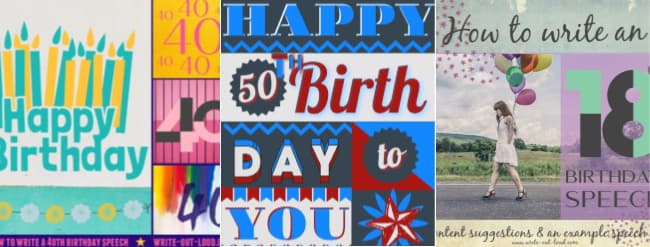
The first example is a 50th birthday speech for a man. It is written as if from a close male friend. You could call it a loving roast!
Here's the opening sentences:
"Good evening all. It's great to have you here. Most of you know my feeling on birthdays. Generally I say, what's the big deal?
By the time you've had over thirty, there should be a cease and desist order against them.
They're not unusual. Everybody has them and at the same rate as everybody else - one a year. They happen whether you want them to or not.
Believe me, I know. I've had quite a few and looking around this room I can see it's the same for others as well.
So why are we here?"
Read more: 50th birthday speech
40th birthday speech example
The second example is a 40 birthday speech for a daughter and the speech is written as if it comes from her mother.
These are the opening sentences:
"On behalf of the Martin family and Camille in particular, it is my pleasure to welcome you here tonight to her 40th birthday celebration.
We are delighted to have you with us and especial thanks to those who have traveled from afar.
Before we eat I am going to say a few words about my beautiful daughter. I've promised her two things. I'll keep it short and I won't embarrass her by telling tales she'd rather I forgot."
Read more: 40th birthday speech example
18th birthday speech sample
The third example is an 18th birthday speech of thanks . The speaker is thanking their family and friends for coming along to their 18th birthday celebration. It's a mix of humor and sincerity.
The speech begins like this:
"This is a moment I’ve waited a long time for. 18! I am an adult. Yep, I’ve come of age. Hard to believe, isn’t?
(Dad, you were not supposed to agree so quickly.)
I can now vote, drive a car, marry, buy alcohol, a lottery ticket and tobacco, get a tattoo, or join the military without having to ask permission. Let me see. Which one will I do first?
Perhaps a more honest question is, which of those will I continue to do without fear of getting caught?
And while you think about that, I’d like to say thank you."
Read more: 18th birthday speech
Christmas speech - an office party example
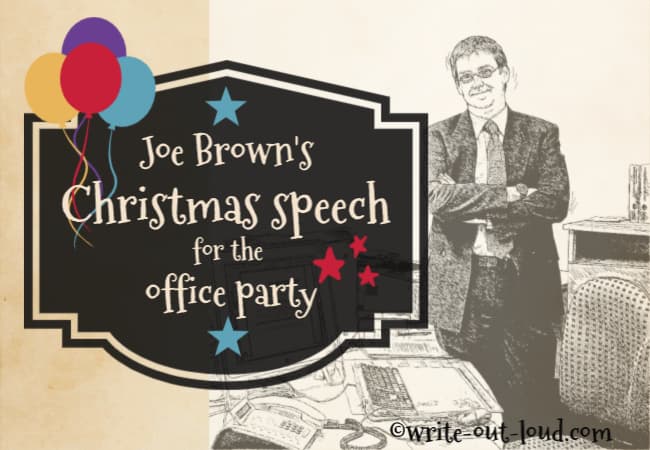
This example is a mix of notes, which the speaker Joe Brown will expand as he delivers the speech, and full text which he'll say as written. The speech follows the step by step process of an outline.
Here's an extract from the concluding sentences:
"It's been a tough year but I'm proud of what we accomplished together. Some businesses haven't been able to do what we have done.
Thanks to you we'll be going into the new year with strength, to build on our accomplishments and to consolidate our position.
Let's celebrate that. It's a gift to be grateful for."
To read more: Christmas office party speech example
2 short company Christmas party speech samples

You have the full text of these two short speeches to read. Both come in at between 2-3 minutes when delivered.
Here's an excerpt from one of them:
"OK, let's be honest; who thought we'd be gathered together for a heigh-ho-merry-old-time back in August? Remember? How can we possibly forget?!
- Martin and Co, one of our more significant customers, downsized their regular order by more than 50% - a move that caught us on the hop and had has us scrambling for a bit.
- There was a little more of that, when an opportunistic phishing expedition by some very clever clowns threatened to hold us to ransom."
For more please go to: 2 short company Christmas party speech samples .
This demonstration speech covers the process involved in learning to how to leave an effective voice mail message.
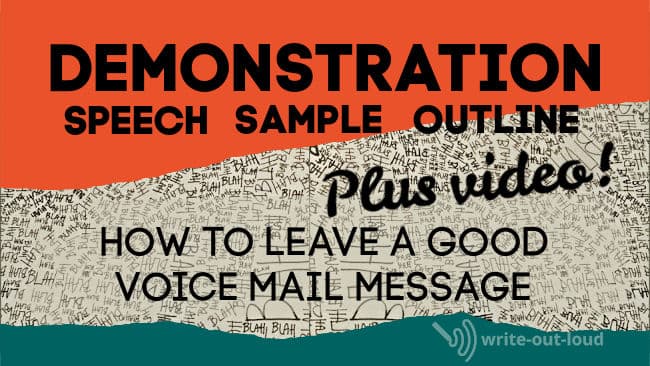
I've entered the text of the whole speech into a step by step outline template so that you can see the structure. Then I made a video (audio + slides) too, so you can hear as well as read it if you want to.
Here's the opening:
"How many important voice mail messages have you bumbled through after the beep? Does recalling them make you feel a little uncomfortable?
Yep, me too. I’ve blundered. Mumbled and muttered. If it were possible, I would have gladly saved the person I was calling the hassle of deleting those messages myself. Before they were heard."
Read more: sample demonstration speech
Engagement party speeches - 5 sample toasts
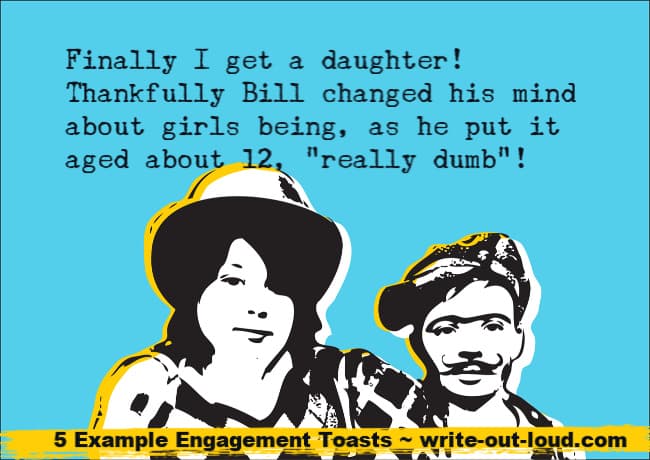
Here are five short (and sweet) engagement party speeches. They've been written from the point of view of a mother, a father, a friend, the groom and the bride-to-be.
The extract is the opening from the speech a mother might give:
"Mary welcome to the family!
While we're all delighted that Bill has shown such good sense in choosing you I've got an extra reason to celebrate. Finally I get a daughter! Thankfully Bill changed his mind about girls being, as he put it aged about 12, 'really dumb'."
To see all five speeches: engagement party toasts
Eulogy samples

We are extraordinarily blessed to be able offer over 70 eulogies for folk to read. These have been sent in by people from all over the world who intimately understand the need to see what others have written before beginning the task of writing a eulogy for a loved one of their own.
You'll find funeral speeches for mothers, fathers, aunts, uncles, cousins, friends, wives, husbands, sons, daughters, sisters, brothers, work colleagues...
Visit: eulogy examples
Two farewell speech examples
An example goodbye speech to colleagues .

This example farewell speech is written from the point of view of a person leaving their workplace: a goodbye speech to colleagues. It's upbeat and follows the suggested content guidelines you'll find when you visit the page. (There's a recording of it too.)
Here's part of the opening:
"Do you realize we've been sharing each other's company for 2920 days?
Eight years of fun times, challenging times and everything in between.
And today I am officially leaving you!"
Go to: farewell speech example : a goodbye speech to colleagues.
A sample farewell speech for a colleague leaving
Writing a farewell speech for a colleague who is leaving can be challenging. What do you put in? What do you leave out?
My example is the result of following a start to finish 7 step process for a speech to say goodbye to a co-worker.
Here's the introductory sentences:
"Who else has been marking off the days until Sam finally leaves us? It’s sad but from next Monday there’ll be a huge hole in our team. She’ll be basking in the sun on a beach in Bali and we’ll be wondering how we’re going to manage without her..."
To read more of the speech and to find out about the process of writing it click the link: farewell speech to a colleague leaving .

Golden wedding - 50th anniversary speech

What do white daisies, finding a stray coin down the back of the sofa, and motorbikes have in common?
Yes, they're all part of a golden wedding speech.
I've written this speech example as if it's being delivered by a man called Mark, to his much-loved wife of 50 years, Sarah.
Here's an excerpt from the beginning:
"After 50 years Sarah knows I am not good at romance or speaking about love. Those kind of words always got tangled on my tongue and caught between my teeth. They never did come out right, not as I intended anyway. Even when I proposed, it came out all wrong."
For more: 50th wedding anniversary speech example
An icebreaker speech for Toastmasters example

Ahh, the icebreaker speech! It's much loved by club members worldwide and whichever of the eleven Toastmaster pathways you choose when you join, this is always the first assignment.
My icebreaker example, 'Stepping up to speak out', was written to illustrate an easily followed, step by step, process for getting from topic choice to speech preparation and delivery.
The beginning of the speech goes like this:
"Would you be surprised to know I nearly didn't make it here tonight?
I wonder how many of you experienced a moment or two of panic before giving your icebreaker speech. Just nod to let me know. { pause - look around }
Thank you, that's very reassuring. You've survived, so probably I shall too.
I am here wobbling rather nervously in front of you for three main reasons which I'll share.
Here's the first."
For more: Icebreaker speech for Toastmasters
Samples of introduction speeches
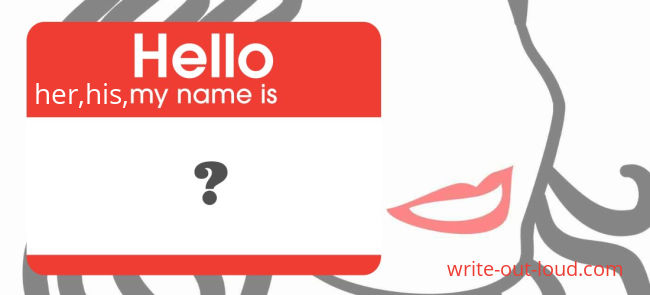
There two introduction speech examples for you to look at.
One is an example self introduction speech - the kind of brief 1-2 minute speech you are often expected to make to introduce yourself to a group of people you're meeting for the first time at some sort of workshop or similar event.
Here's the opening of that speech:
"Hi everybody!
I'm Masie Smith, Senior Marketing Executive, from Watts and Frederick in Smalltown, Bigstate.
It's great to be finally here. I've been dreaming about the opportunity and possibilities of working collectively and directly with each other for a long time now. Jane and Sam can attest to that. There's been hours put in balancing the schedules to make it happen.
Webinars and email are fine but nothing beats face to face ."
For more: self-introduction speech example
The second is an introduction speech in which you introduce a guest- speaker to an audience.
Here are the closing sentences. What's preceded them has carefully primed the audience to give the guest a warm welcome, by piling one piece of compelling biographical information on top of another.
"How she got from awkward tongue tied silence to an eloquent front line spokesperson is the story she will share with us tonight.
Ladies, I give you ... Rose Stephenson on speaking to lead."
For more: guest-speaker introduction example
Maid of Honor speech examples
There are three Maid of Honor (MOH) speeches for you to read: two from the point of view of a best friend, and one from the point of view of a sister.
You'll find step by step guidelines with examples to illustrate each part of the process of preparing a speech for yourself. Follow them carefully and you'll finish with a Maid of Honor speech you'll be proud to deliver.
Two Maid of Honor speech examples
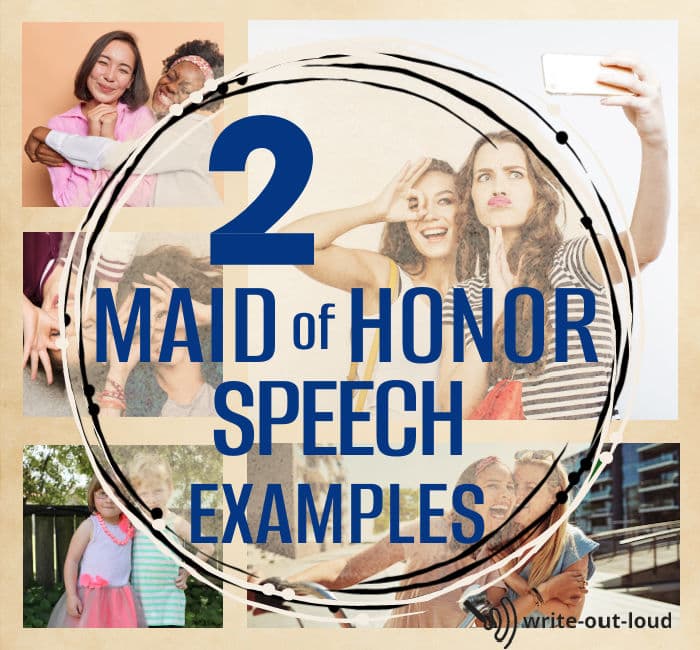
The first example is heartfelt, a speech written from the point of view of a close childhood friend. She's shared the best and most difficult of times with the bride.
Here are its opening sentences:
"Some one very wise, and obviously someone who knew Sonja and Mark said, “Don't marry a person you can live with. Marry somebody you can't live without."
That's what we're witnessing today – the union of two people who belong together. A perfect match!"
The second example is more light-hearted. It's a combination of sentiment and fun, and is written from the point of view of a trusted and loved friend.
Here's the beginning:
"Once in a while, in the middle of an ordinary life, love gives us a fairy tale.
That's what we're celebrating today: a story of true love, a dream come true.
My name is Felicity and it's my privilege to be Sarah’s Maid of Honor.
Sarah is my Best Friend. I know it's a cliché. However clichés become clichés for a very good reason, because they're true. She's my BFF: Best Friend Forever.
For her I would wear the gaudiest, frothiest taffeta maid of honor dress possible and still smile. Fortunately I don't have to."
For more see: Maid of Honor speech examples
A Maid of Honor speech for a sister example
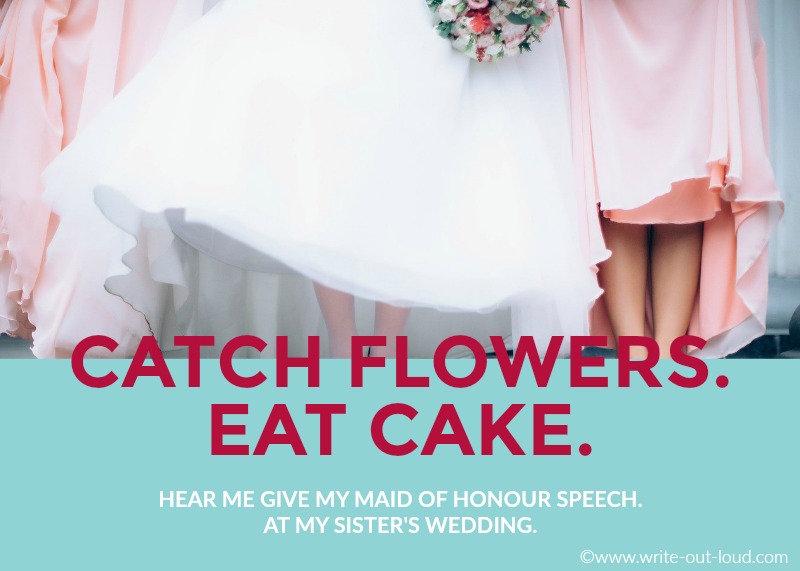
The opening segment of the speech is below. It recalls a loved childhood game which unites the past and present while drawing listeners in.
"What a day, Mary!
Remember when we were kids, how we dressed up in Mom’s old party dresses? Put a white table cloth on our heads and marched around, singing, “Here comes the bride, fair fat and wide.”?
My name is Jennifer, and this beautiful woman, this stunning bride – the antithesis of “fair fat and wide” is my beloved little sister.
We laughed ourselves silly over that game. Now here we are 25 years later.
Not laughing. Mary’s not wearing a table cloth. And this time it’s for real.
I am honored to be asked to speak. Thank you."
For more go to: maid of honor speech for a sister
As part of a page offering 150 one minute speech topics I wrote and then recorded three example speeches to demonstrate what you could do with a one minute speech.
One of those speeches was on the topic: 'What my work clothes say about me'.
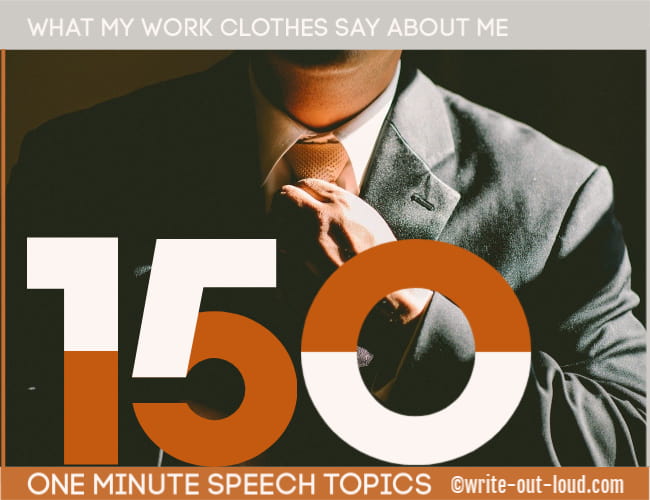
Here is the opening two paragraphs of that speech:
"Clothes make the man. Yes, we judge each other on what we wear. And have done forever.
For better, or for worse, in the western working world, nothing says dependable and professional as eloquently as a tailored grey business suit, a crisp white shirt and a pair of good shoes."
To read, and hear, all three speeches please visit: one minute speech topics *
* There is also a free downloadable printable one minute speech planner which will help you consolidate the process of putting a speech together with minimum fuss.
A persuasive speech example
Here's a persuasive speech example using Monroe's Motivated Sequence - a five step structural pattern frequently used by professional persuaders: politicians and marketers.
The topic is somber: suicide and its impact on those left behind. The purpose of the speech is to persuade listeners to learn more about the special needs of family members, friends and colleagues in the immediate aftermath of a suicide.
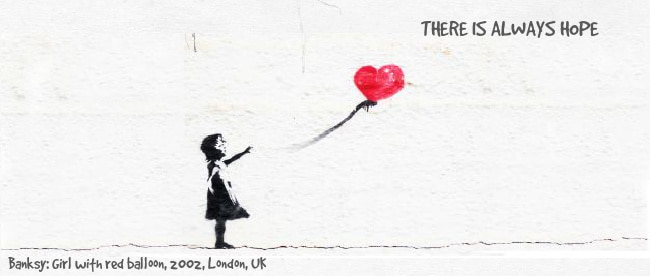
Here are the opening sentences:
"One fine Spring day I biked home from school and found a policemen guarding our backdoor. Through it came sounds I'll never forget; my quiet, well-mannered Mother screaming. He said, "You can't go in."
I kicked him in the shins and did. It was the 15th of September, three days before my thirteenth birthday and my father was dead. Killed by his own hand. Suicide."
Read more: persuasive speech example
A sample retirement speech
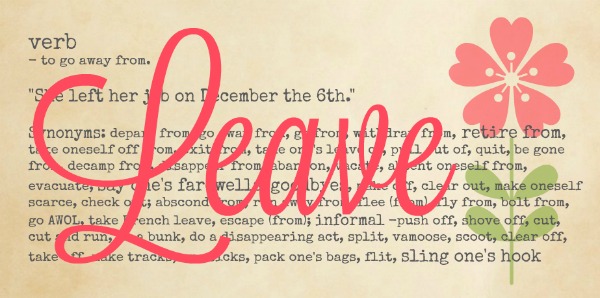
This retirement speech is an example of one that could be given by a teacher who's signing off after many years service in the same school.
Here's a taste of it:
"I've been asked what I'm going to do now. I'm going to do a lot of things and very few of them conform to the notion of retirement as a time of waiting for the inevitable end. Helen Hayes, put it this way: 'People who refuse to rest honorably on their laurels when they reach “retirement” age seem very admirable to me."
Read the whole speech: retirement speech sample
Sample student council speeches
This page has everything you need to help you prepare a winning student council speech: comprehensive guidelines, a template, example speeches and a printable speech planner and outline document.
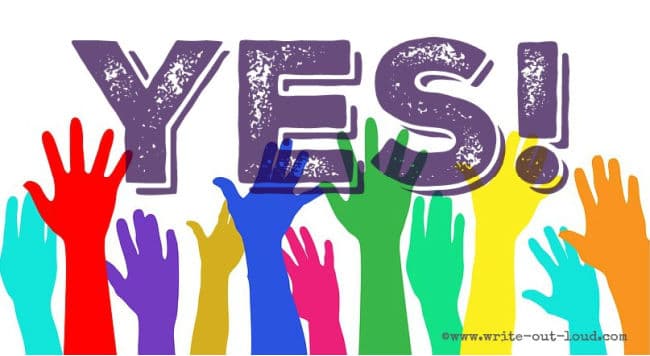
The speaker in my first example is running for president.
Here's the opening to her speech:
"I’ve got a question for you. I’m not asking you to shout your answer out, or raise your hand. All I’m asking is that you give it room in your mind. Let it sit for a bit, and have a think about it.
My question is – do you believe like I do, that all of us deserve the opportunity to make the best of ourselves? Not second best, 3 rd , or even, highly commended. The BEST."
Get the guidelines, the template, and read the whole speech: sample Student Council speech for President
And now I've added three more sample Student Council speeches:
- Student Council speech for Vice President
- Student Council speech for Secretary
- Student Council speech for Treasurer
Thank you speech sample
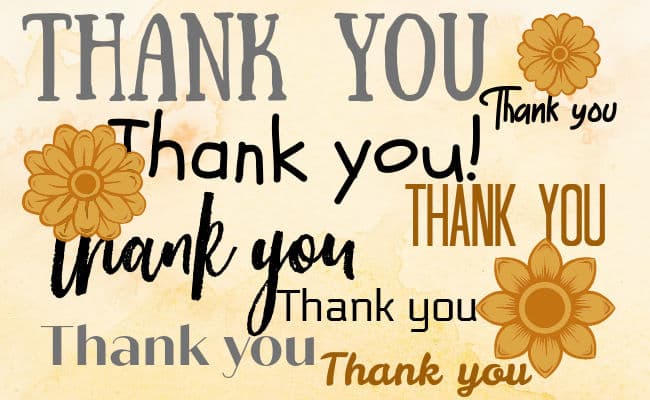
The example thank you speech expresses gratitude for being the recipient of a community service award.
"Who's considered the incredible power of thank you? Those two words express gratitude, humility, understanding, as well as acknowledgement.
I am here with you: my family, many of my friends and colleagues, because I need to say all of that, and then some more."
You'll find the full speech, and guidelines covering how to write a speech of thanks here: thank you speech example
An example tribute speech
A tribute speech may also be a commemorative speech. That is a speech celebrating, praising or paying tribute to the memory of: a person, a group, an institution, a thing, an event or even an idea. Or it could be a eulogy or funeral speech; a speech celebrating a person's life.
This example tribute speech was written in memory of my mother, Iris.

"My Mother's name marked her out as the goddess of the rainbow, a messenger for the ancient Olympian gods and carrier of faith, hope and wisdom.
She was Iris. And although the meaning of her name is rich in imagery and history that wasn't why her parent's called her that. Instead it was something much closer to home.
After her birth my grandmother saw iris flowering out her bedroom window. She was named for the regal beauty of their dark purple flowers."
Read more: sample tribute speech
Example welcome speeches
There are three welcome speech examples for you to read: welcome to an event, welcome to a church, and welcome to the family. All three come with guidelines to help you prepare a good welcome speech of your own.
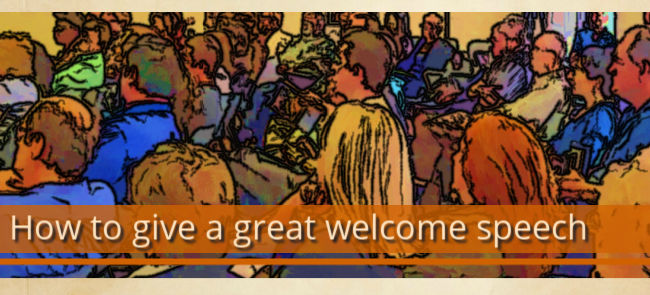
This example is welcoming listeners to an event. As part of that, the special guests are mentioned, as is, an outline of what's going to happen.
This is the opening:
"Sue-Ellen Thomas, Jim Smith, Jane Brown and all of our guests, welcome.
My name is April Molloy, and it's my privilege and pleasure on behalf of Parents United to welcome you here today.
We are delighted to have you with us to participate and share in our 5th annual Children's Day. Thank you for coming. That many of you have traveled long distances to be here serves as a reminder to us all just how important our work is."
You can read the rest here: sample welcome speech .
A church welcome speech example
This sample speech welcomes visitors to the congregation. Along with the speech you'll also find links to additional resources to assist.
Here's the opening passage:
"I want to take a moment to extend a very warm welcome to everyone who's visiting us for the first time this morning. Whether you're just having a look, or are searching out for a place to worship, we're delighted to have you here.
To give you some idea of what we're all about, I'll quickly sketch some of our foundational beliefs."
Read more: church welcome speech example
Example welcome to the family speech
This is a short, and sweet, speech welcoming a bride or groom-to-be into a family at an event arranged for that purpose. The template it uses is entirely flexible.
Mary {Replace the name Mary with the name of the person you are welcoming} - welcome to the family!
Family, tribe, clan, kin, group - call it what you will: it's us - all of us!
We're mothers, fathers, uncles, aunts, brothers, sisters, cousins, 3rd cousins, even 53rd cousins, old and young, generations of us, linked together through shared DNA and history.
Look around. The faces smiling back at you are now your people too."
See more: example welcome to the family speech
In addition to providing speech examples, I also custom write speeches.
If you have a speech to give for a special occasion that's coming up you may like to find out more, especially if you find writing stressful. ☺ Go to: speech writer for hire
speaking out loud
Subscribe for FREE weekly alerts about what's new For more see speaking out loud

Top 10 popular pages
- Welcome speech
- Demonstration speech topics
- Impromptu speech topic cards
- Thank you quotes
- Impromptu public speaking topics
- Farewell speeches
- Phrases for welcome speeches
- Student council speeches
- Free sample eulogies
From fear to fun in 28 ways
A complete one stop resource to scuttle fear in the best of all possible ways - with laughter.

Useful pages
- Search this site
- About me & Contact
- Blogging Aloud
- Free e-course
- Privacy policy
©Copyright 2006-24 www.write-out-loud.com
Designed and built by Clickstream Designs
Rice Speechwriting
Examples of a good speech: learning from 10 famous speeches, 10 famous speeches with examples of a good speech.
Great speeches have the power to move people, to inspire and motivate, and to create lasting change. They have the ability to capture the attention of an audience and leave a lasting impact. In this blog post, we will be discussing the power of speeches and how they can influence personal growth. We will also be analyzing famous speeches from some of history’s most iconic figures, including Martin Luther King Jr., John F. Kennedy, Winston Churchill, Susan B. Anthony, Mahatma Gandhi, and Nelson Mandela. Through these analyses, we will gain insights into the art of public speaking such as ethos, logos, and pathos in speeches, storytelling techniques in speeches, pacing and pauses in effective speech delivery, etc. By understanding what makes these speeches so powerful, we can apply those lessons to our own lives and discover how to become better communicators ourselves.
The Power of Speeches
Speeches possess the ability to inspire, motivate, and persuade individuals, making them a potent tool for conveying viewpoints. Engaging speeches employ visual aids and storytelling to captivate the audience, emphasizing the significance of language and nonverbal cues in delivery. With the integration of NLP terms like ‘own speech’ and ‘student council,’ public speaking skills can be nurtured, contributing to personal and professional growth within the context of this blog.
Why are speeches influential?
Speeches have a powerful influence, shaping opinions and educating audiences. They connect through persuasion, vulnerability, sincerity, and imagery. A good speech addresses people’s interests, values, or concerns. Clear, concise points backed by evidence make speeches influential. They can evoke strong emotions and stimulate critical thinking.
Personal growth through speeches
Giving a speech can be a life-changing, confidence-boosting opportunity. The use of grammar, storytelling, and imagery in speeches can profoundly impact personal growth. Public speaking can cultivate various speech skills such as persuasion, entertainment, and impromptu delivery. When addressing an audience, consider employing short sentences, maintaining eye contact, or utilizing oratorical styles for different occasions. Overcoming speech anxiety or writer’s block can lead to personal growth and a successful speech.
Analysing Famous Speeches
Analysing renowned speeches offers valuable insights into the orator’s persuasive techniques and speech type. The context of a famous speech, whether a maid of honor speech, eulogy, or tribute, significantly impacts its effectiveness. Understanding the speech type, be it informative, persuasive, or demonstrative, is crucial for analysis. Effective speeches are distinguished by the use of imagery, vulnerability, sincerity, and persuasive speech examples. Critical thinking of the audience is influenced by grammar, storytelling, and nonverbal communication in speeches.
The context of famous speeches
The context of famous speeches significantly impacts their effectiveness and resonance with the audience. Whether it’s a birthday party, debate speech, or any special occasion, understanding the audience’s interests, values, and concerns is crucial. The type of speech, be it motivational or entertaining, also plays a pivotal role in shaping the main points and persuasion. Successful speeches take into account the specific context and adapt the content to resonate with the audience’s expectations and emotions.
The impact of famous speeches
Famous speeches, whether a farewell address or a special occasion presentation, leave a profound and enduring impact on the audience. The success of a speech is reflected in audience engagement, critical thinking, and persuasion. Influential speeches, such as a maid of honor’s address or an oratorical presentation, have the power to inspire and educate people. The use of imagery, storytelling, and vulnerability in a speech enhances its emotional and persuasive impact. Additionally, speech types, audience attention, and visual aids all contribute to the powerful impact of a speech.
Lessons from Martin Luther King Jr.’s “I Have a Dream”
Martin Luther King Jr.’s iconic speech exemplifies the persuasive use of imagery and sincerity, effectively conveying a powerful message of hope and equality. The emotional impact was amplified by the use of repetition and storytelling, captivating a wide audience with a motivational speech. Analyzing this renowned speech reveals powerful persuasion techniques, demonstrating the influential impact of oratorical speech types and visual aids in captivating an audience.
The power of imagery in speeches
Imagery in speeches creates immersive, sensory experiences that deeply resonate with the audience. Effective imagery, vulnerability, or storytelling evokes intense emotions and helps to visualize abstract concepts. A compelling speech, be it a student council address or one’s own blog, utilizes imagery and persuasion to engage and captivate the listeners. The usage of the right words, nonverbal communication, or oratorical speech type further enhances the impact of imagery in a speech, leaving a lasting impression on the audience.
The use of repetition for emphasis
Repetition serves as a potent tool, reinforcing key points, building momentum, and emphasizing critical ideas in a speech. Martin Luther King Jr.’s persuasive use of repetition, vulnerability, or sincerity magnified the impact of his speech. The right words, visual aids, or storytelling combined with repetition enhance a speech’s persuasive effect. Similarly, a maid of honor speech, best speech, or successful speech may benefit from skillful repetition for emphasis, strengthening its influence on the audience.
Insights from John F. Kennedy’s Inaugural Address
John F. Kennedy’s inaugural speech showcased persuasive delivery, captivating the audience through powerful imagery and sincerity. It serves as a valuable example for crafting impactful speeches. Analyzing his address provides insights into the influence of oratorical speech and nonverbal communication. Kennedy’s speech engagement is a testament to the art of persuasion and the use of inspirational language in public speaking, offering valuable lessons for student council members crafting their own speeches for a blog.
The art of persuasion in speeches
Influencing opinions through speeches is a powerful tool. Capturing the audience’s attention and swaying their point of view is essential for a good speech. The use of the right words, imagery, and nonverbal communication is critical in persuasive speeches. Vulnerability, sincerity, and storytelling play a significant role in persuasion. Oratorical speech, grammar, and powerful imagery add impact to persuasive speeches, enhancing their effectiveness in swaying opinions.
The role of inspirational language
In speeches, motivational and uplifting language has the power to inspire and encourage audiences. The use of concise sentences, impactful imagery, and visual aids contributes to the effectiveness of a speech. Examples of speeches from various special occasions, like birthdays or farewells, highlight how inspirational language can resonate with people. Understanding the different types of speeches, such as motivational or entertaining, is essential for crafting a speech with the right tone. Additionally, integrating persuasive speech examples and informative speech techniques adds depth and impact to one’s own speech.
Understanding Winston Churchill’s “We Shall Fight on the Beaches”
Analyzing Winston Churchill’s “We Shall Fight on the Beaches” demonstrates the adept usage of ethos, logos, and pathos. A formal address, it effectively captivated the audience. Supported by critical thinking, persuasion, and a compelling argument, Churchill’s speech serves as a formal example, inspiring public speaking skills. The speech exemplifies good speech techniques, making it a noteworthy example for students to study.
The importance of a strong delivery
A compelling speech relies on a potent, convincing, and inspiring presentation. Whether it’s a persuasive, formal, or impromptu speech, the ability to command a speech is key. From entertaining speeches to debate or maid of honor speeches, a strong delivery captures the audience. Be it an impromptu or a farewell speech, a powerful delivery leaves a lasting impression, emphasizing the significance of mastering the art of delivery in public speaking.
The use of emotion to connect with the audience
Connecting with the audience through sincerity, vulnerability, and imagery is crucial in a speech. The use of emotion is a powerful tool, evoking powerful storytelling and persuasive speech techniques. Emotional speeches, such as eulogies or tributes, require a genuine connection to resonate with the audience. When emotion is effectively utilized, a speech becomes memorable and impactful, creating a lasting impression on the audience.
Deconstructing Susan B. Anthony’s “On Women’s Right to Vote”
Analyzing Susan B. Anthony’s speech reveals the persuasive power of ethos, logos, and pathos, creating a compelling argument. Her speech serves as a valuable example, inspiring critical thinking and persuasive speech techniques. Great speeches like Anthony’s motivate public speaking and captivate audiences. The main points, supported by critical thinking and persuasion, make her speech a powerful tool for advocacy and change.
The role of ethos, logos, and pathos in speeches
Critical components of persuasive speeches are ethos, logos, and pathos, which contribute to a compelling argument. The usage of these elements is exemplified in various types of speeches, such as eulogies, farewell speeches, and motivational speeches. Ethical persuasion and the integration of ethos, logos, and pathos are powerful tools in crafting a speech that resonates with the audience, regardless of the speech’s purpose or context. Understanding the application of these elements is essential in delivering an impactful and persuasive speech.
The power of a compelling argument
Crafting a speech, like a debate speech, or an impromptu speech, involves anchoring a compelling argument supported by critical thinking and persuasion. Persuasive speech techniques serve as a powerful tool to captivate the audience’s attention and influence their point of view. Similar to a motivational speech or a farewell speech, a compelling argument resonates with the audience, making it a key element in delivering an impactful speech and connecting with the listeners.
Interpreting Mahatma Gandhi’s “Quit India”
Mahatma Gandhi’s “Quit India” speech exemplifies the cultural context, persuasion, and critical thinking in great speeches. It serves as a formal example, motivating public speaking, persuasive speech, or a successful speech. Gandhi’s speech demonstrates the power of critical thinking and persuasion, supporting the main points with a compelling argument. Understanding types of speeches, like informative or persuasive speech, involves applying critical thinking and persuasion, influencing the audience’s perspective.
The impact of cultural context on speeches
The tone, language, and persuasion techniques in speeches are heavily influenced by the cultural context and the type of speech. Whether it’s a formal speech, persuasive speech, or a great speech, cultural context plays a pivotal role in shaping the speech’s persuasive nature. It’s important to acknowledge the impact of cultural context when crafting different types of speeches, such as entertaining speeches or farewell speeches. Sample speeches, like formal speech examples or persuasive speech examples, vividly illustrate this influence.
The effectiveness of simple language
Incorporating plain language in speeches enhances audience understanding and fosters a stronger connection. Relatable simplicity effectively conveys complex ideas while maintaining audience engagement. By avoiding jargon and convoluted terminology, speakers can ensure that their message resonates with the audience. This approach not only promotes comprehension but also establishes a sense of inclusivity, making the speech accessible to diverse audiences.
Delving into Nelson Mandela’s “I am Prepared to Die”
Mandela’s “I am Prepared to Die” exemplifies potent storytelling, authentically impactful. His adept use of pacing and pauses held the audience in rapture, as personal experiences lent depth and sincerity. Captivating imagery painted a vivid picture, making the speech resonate profoundly. This speech is a prime example of how student council members can learn from their own speech and improve their oratory skills for public speaking competitions and blog writing.
The importance of authenticity in speeches
Authentic speeches deeply resonate with the audience, fostering trust and connection while creating a compelling emotional impact. Speakers, by embracing authenticity, can connect on a human level, establishing a strong rapport with the audience. Incorporating personal experiences into their own speech allows for genuine and influential communication, making their message more relatable and engaging for the student council. This authenticity adds depth and sincerity to the blog, enhancing its overall impact.
The power of personal experiences in public speaking
Incorporating personal experiences in public speaking adds a relatable dimension to speeches and evokes empathy from the audience. Sharing personal stories fosters a genuine, sincere connection and enhances the speaker’s vulnerability. Additionally, personal anecdotes create a memorable, impactful speech that resonates with the audience. By drawing from their own experiences, speakers can establish authenticity, fostering trust and connection with the audience.
Learning from Other Famous Speeches
Analyzing the composition and arrangement of a speech reveals its effectiveness. Observing the speaker’s intonation and presentation is crucial. Identifying rhetorical elements like repetition and metaphors enriches the understanding. Context and audience analysis provides valuable insights. Unveiling the central message and its alignment with the speaker’s objectives is imperative for learning from renowned speeches.
The art of storytelling in speeches
Crafting a compelling speech involves weaving vivid imagery and metaphors to captivate the audience. A powerful opening and closing set the tone and leave a lasting impact. Strategic repetition emphasizes key points, while personal connections foster engagement. Structuring the speech for maximum impact ensures coherence and resonance. Additionally, humor can lighten the mood and create a relaxed atmosphere, enhancing the overall delivery for an impactful student council, own speech, or blog.
The role of pacing and pauses in effective speeches
Effective speeches rely on the skillful use of pacing and pauses. These elements help to capture and maintain the audience’s attention, emphasizing key points and engaging listeners. By studying historical speeches, one can observe how impactful pacing and pauses contribute to the overall delivery. Practicing and mastering pacing and pausing is crucial for delivering an impactful speech that resonates with the audience.
How do these famous speeches influence modern public speaking?
The influence of these timeless speeches extends to modern public speaking practices, setting a high standard for persuasive communication. They serve as a powerful tool for studying speechwriting and delivery, inspiring speakers to draw inspiration from the techniques employed in these famous speeches.
In conclusion, famous speeches have a profound impact on individuals and society as a whole. They inspire change, ignite passion, and challenge societal norms. By analyzing and understanding these speeches, we can learn valuable lessons on the art of persuasion, the power of storytelling, and the importance of authenticity. From Martin Luther King Jr.’s powerful imagery to Susan B. Anthony’s compelling arguments, each speech offers unique insights into effective public speaking. By incorporating these lessons into our own communication, we can become more influential and effective in conveying our ideas and inspiring others. So, take the time to study and learn from these famous speeches, and let their wisdom guide you in your own journey as a speaker.
Unlocking the Secrets: Steps in Speech Writing Mastery
Expert tips for choosing good speech topics.
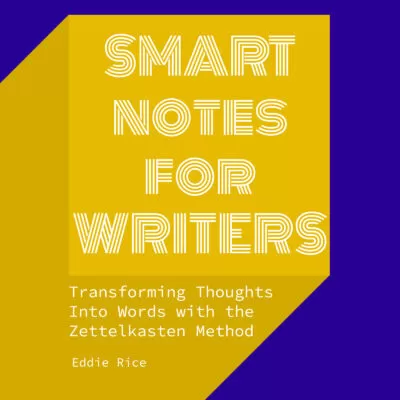
Popular Posts
How to write a retirement speech that wows: essential guide.
June 4, 2022
The Best Op Ed Format and Op Ed Examples: Hook, Teach, Ask (Part 2)
June 2, 2022
Inspiring Awards Ceremony Speech Examples
November 21, 2023
Short Award Acceptance Speech Examples: Inspiring Examples
Mastering the art of how to give a toast, best giving an award speech examples.
November 22, 2023
Uncategorized
40 famous persuasive speeches you need to hear.
Written by Kai Xin Koh
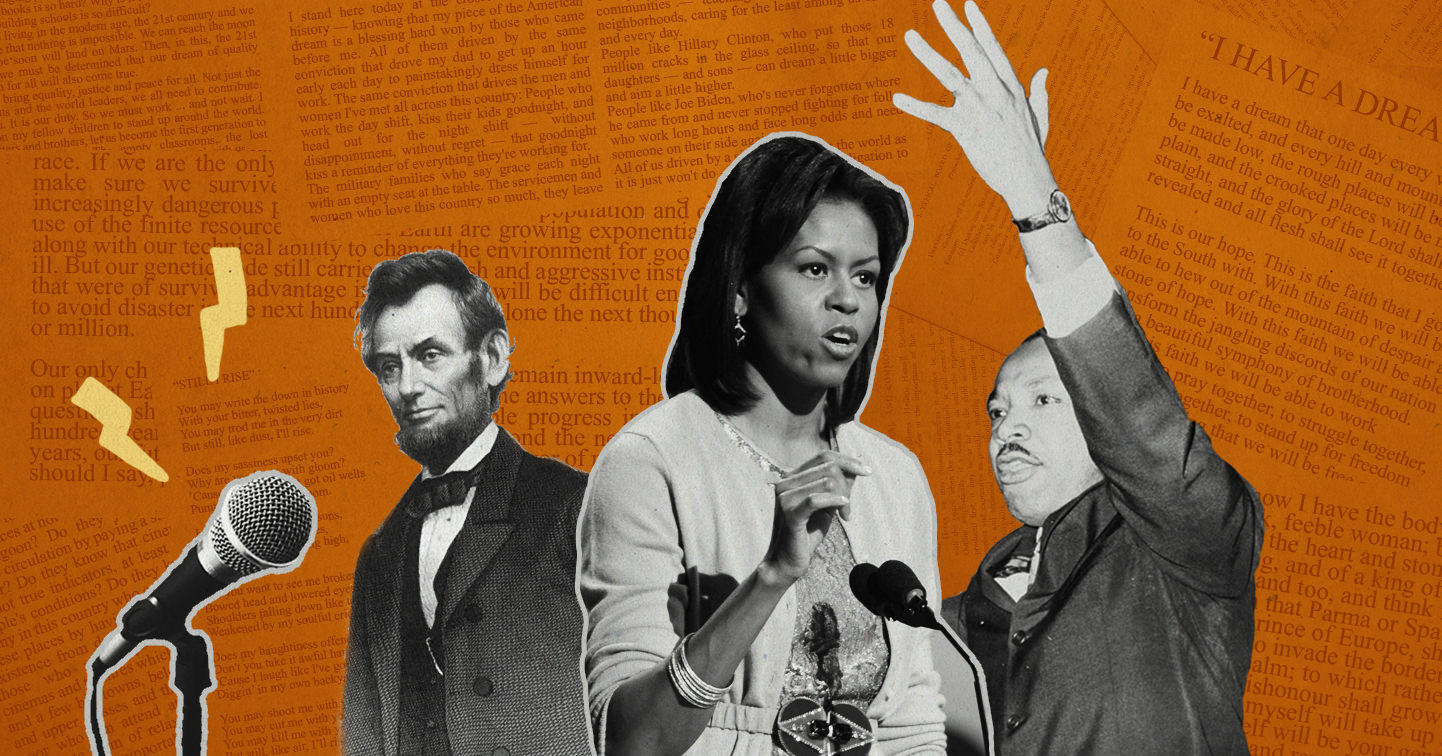
Across eras of calamity and peace in our world’s history, a great many leaders, writers, politicians, theorists, scientists, activists and other revolutionaries have unveiled powerful rousing speeches in their bids for change. In reviewing the plethora of orators across tides of social, political and economic change, we found some truly rousing speeches that brought the world to their feet or to a startling, necessary halt. We’ve chosen 40 of the most impactful speeches we managed to find from agents of change all over the world – a diversity of political campaigns, genders, positionalities and periods of history. You’re sure to find at least a few speeches in this list which will capture you with the sheer power of their words and meaning!
1. I have a dream by MLK
“I have a dream that one day down in Alabama, with its vicious racists, with its governor having his lips dripping with the words of interposition and nullification – one day right there in Alabama little black boys and black girls will be able to join hands with little white boys and white girls as sisters and brothers. I have a dream today. I have a dream that one day every valley shall be exalted, and every hill and mountain shall be made low, the rough places will be made plain, and the crooked places will be made straight, and the glory of the Lord shall be revealed and all flesh shall see it together. This is our hope. This is the faith that I go back to the South with. With this faith we will be able to hew out of the mountain of despair a stone of hope. With this faith we will be able to transform the jangling discords of our nation into a beautiful symphony of brotherhood. With this faith we will be able to work together, to pray together, to struggle together, to go to jail together, to stand up for freedom together, knowing that we will be free one day. This will be the day, this will be the day when all of God’s children will be able to sing with new meaning “My country ’tis of thee, sweet land of liberty, of thee I sing. Land where my father’s died, land of the Pilgrim’s pride, from every mountainside, let freedom ring!”
Unsurprisingly, Martin Luther King’s speech comes up top as the most inspiring speech of all time, especially given the harrowing conditions of African Americans in America at the time. In the post-abolition era when slavery was outlawed constitutionally, African Americans experienced an intense period of backlash from white supremacists who supported slavery where various institutional means were sought to subordinate African American people to positions similar to that of the slavery era. This later came to be known as the times of Jim Crow and segregation, which Martin Luther King powerfully voiced his vision for a day when racial discrimination would be a mere figment, where equality would reign.
2. Tilbury Speech by Queen Elizabeth I
“My loving people, We have been persuaded by some that are careful of our safety, to take heed how we commit our selves to armed multitudes, for fear of treachery; but I assure you I do not desire to live to distrust my faithful and loving people. Let tyrants fear. I have always so behaved myself that, under God, I have placed my chiefest strength and safeguard in the loyal hearts and good-will of my subjects; and therefore I am come amongst you, as you see, at this time, not for my recreation and disport, but being resolved, in the midst and heat of the battle, to live and die amongst you all; to lay down for my God, and for my kingdom, and my people, my honour and my blood, even in the dust. I know I have the body of a weak, feeble woman; but I have the heart and stomach of a king, and of a king of England too, and think foul scorn that Parma or Spain, or any prince of Europe, should dare to invade the borders of my realm; to which rather than any dishonour shall grow by me, I myself will take up arms, I myself will be your general, judge, and rewarder of every one of your virtues in the field. I know already, for your forwardness you have deserved rewards and crowns; and We do assure you on a word of a prince, they shall be duly paid. In the mean time, my lieutenant general shall be in my stead, than whom never prince commanded a more noble or worthy subject; not doubting but by your obedience to my general, by your concord in the camp, and your valour in the field, we shall shortly have a famous victory over these enemies of my God, of my kingdom, and of my people.”
While at war with Spain, Queen Elizabeth I was most renowned for her noble speech rallying the English troops against their comparatively formidable opponent. Using brilliant rhetorical devices like metonymy, meronymy, and other potent metaphors, she voiced her deeply-held commitment as a leader to the battle against the Spanish Armada – convincing the English army to keep holding their ground and upholding the sacrifice of war for the good of their people. Eventually against all odds, she led England to victory despite their underdog status in the conflict with her confident and masterful oratory.
3. Woodrow Wilson, address to Congress (April 2, 1917)
“The world must be made safe for democracy. Its peace must be planted upon the tested foundations of political liberty. We have no selfish ends to serve. We desire no conquest, no dominion. We seek no indemnities for ourselves, no material compensation for the sacrifices we shall freely make. We are but one of the champions of the rights of mankind. We shall be satisfied when those rights have been made as secure as the faith and the freedom of nations can make them. Just because we fight without rancor and without selfish object, seeking nothing for ourselves but what we shall wish to share with all free peoples, we shall, I feel confident, conduct our operations as belligerents without passion and ourselves observe with proud punctilio the principles of right and of fair play we profess to be fighting for. … It will be all the easier for us to conduct ourselves as belligerents in a high spirit of right and fairness because we act without animus, not in enmity toward a people or with the desire to bring any injury or disadvantage upon them, but only in armed opposition to an irresponsible government which has thrown aside all considerations of humanity and of right and is running amuck. We are, let me say again, the sincere friends of the German people, and shall desire nothing so much as the early reestablishment of intimate relations of mutual advantage between us—however hard it may be for them, for the time being, to believe that this is spoken from our hearts. We have borne with their present government through all these bitter months because of that friendship—exercising a patience and forbearance which would otherwise have been impossible. We shall, happily, still have an opportunity to prove that friendship in our daily attitude and actions toward the millions of men and women of German birth and native sympathy who live among us and share our life, and we shall be proud to prove it toward all who are in fact loyal to their neighbors and to the government in the hour of test. They are, most of them, as true and loyal Americans as if they had never known any other fealty or allegiance. They will be prompt to stand with us in rebuking and restraining the few who may be of a different mind and purpose. If there should be disloyalty, it will be dealt with with a firm hand of stern repression; but, if it lifts its head at all, it will lift it only here and there and without countenance except from a lawless and malignant few. It is a distressing and oppressive duty, gentlemen of the Congress, which I have performed in thus addressing you. There are, it may be, many months of fiery trial and sacrifice ahead of us. It is a fearful thing to lead this great peaceful people into war, into the most terrible and disastrous of all wars, civilization itself seeming to be in the balance. But the right is more precious than peace, and we shall fight for the things which we have always carried nearest our hearts—for democracy, for the right of those who submit to authority to have a voice in their own governments, for the rights and liberties of small nations, for a universal dominion of right by such a concert of free peoples as shall bring peace and safety to all nations and make the world itself at last free. To such a task we can dedicate our lives and our fortunes, everything that we are and everything that we have, with the pride of those who know that the day has come when America is privileged to spend her blood and her might for the principles that gave her birth and happiness and the peace which she has treasured. God helping her, she can do no other.”
On April 2, 1917, President Woodrow Wilson of the USA delivered his address to Congress, calling for declaration of war against what was at the time, a belligerent and aggressive Germany in WWI. Despite his isolationism and anti-war position earlier in his tenure as president, he convinced Congress that America had a moral duty to the world to step out of their neutral observer status into an active role of world leadership and stewardship in order to liberate attacked nations from their German aggressors. The idealistic values he preached in his speech left an indelible imprint upon the American spirit and self-conception, forming the moral basis for the country’s people and aspirational visions to this very day.
4. Ain’t I A Woman by Sojourner Truth
“That man over there says that women need to be helped into carriages, and lifted over ditches, and to have the best place everywhere. Nobody ever helps me into carriages, or over mud-puddles, or gives me any best place! And ain’t I a woman? Look at me! Look at my arm! I have ploughed and planted, and gathered into barns, and no man could head me! And ain’t I a woman? I could work as much and eat as much as a man – when I could get it – and bear the lash as well! And ain’t I a woman? I have borne thirteen children, and seen most all sold off to slavery, and when I cried out with my mother’s grief, none but Jesus heard me! And ain’t I a woman? … If the first woman God ever made was strong enough to turn the world upside down all alone, these women together ought to be able to turn it back , and get it right side up again! And now they is asking to do it, the men better let them.”
Hailing from a background of slavery and oppression, Sojourner Truth was one of the most revolutionary advocates for women’s human rights in the 1800s. In spite of the New York Anti-Slavery Law of 1827, her slavemaster refused to free her. As such, she fled, became an itinerant preacher and leading figure in the anti-slavery movement. By the 1850s, she became involved in the women’s rights movement as well. At the 1851 Women’s Rights Convention held in Akron, Ohio, she delivered her illuminating, forceful speech against discrimination of women and African Americans in the post-Civil War era, entrenching her status as one of the most revolutionary abolitionists and women’s rights activists across history.
5. The Gettsyburg Address by Abraham Lincoln
“Fondly do we hope, fervently do we pray, that this mighty scourge of war may speedily pass away. Yet, if God wills that it continue until all the wealth piled by the bondsman’s two hundred and fifty years of unrequited toil shall be sunk, and until every drop of blood drawn with the lash shall be paid by another drawn with the sword, as was said three thousand years ago, so still it must be said “the judgments of the Lord are true and righteous altogether.” With malice toward none, with charity for all, with firmness in the right as God gives us to see the right, let us strive on to finish the work we are in, to bind up the nation’s wounds, to care for him who shall have borne the battle and for his widow and his orphan, to do all which may achieve and cherish a just and lasting peace among ourselves and with all nations.”
President Abraham Lincoln had left the most lasting legacy upon American history for good reason, as one of the presidents with the moral courage to denounce slavery for the national atrocity it was. However, more difficult than standing up for the anti-slavery cause was the task of unifying the country post-abolition despite the looming shadows of a time when white Americans could own and subjugate slaves with impunity over the thousands of Americans who stood for liberation of African Americans from discrimination. He urged Americans to remember their common roots, heritage and the importance of “charity for all”, to ensure a “just and lasting peace” among within the country despite throes of racial division and self-determination.
6. Woman’s Rights to the Suffrage by Susan B Anthony
“For any State to make sex a qualification that must ever result in the disfranchisement of one entire half of the people is to pass a bill of attainder, or an ex post facto law, and is therefore a violation of the supreme law of the land. By it the blessings of liberty are for ever withheld from women and their female posterity. To them this government has no just powers derived from the consent of the governed. To them this government is not a democracy. It is not a republic. It is an odious aristocracy; a hateful oligarchy of sex; the most hateful aristocracy ever established on the face of the globe; an oligarchy of wealth, where the right govern the poor. An oligarchy of learning, where the educated govern the ignorant, or even an oligarchy of race, where the Saxon rules the African, might be endured; but this oligarchy of sex, which makes father, brothers, husband, sons, the oligarchs over the mother and sisters, the wife and daughters of every household–which ordains all men sovereigns, all women subjects, carries dissension, discord and rebellion into every home of the nation. Webster, Worcester and Bouvier all define a citizen to be a person in the United States, entitled to vote and hold office. The only question left to be settled now is: Are women persons? And I hardly believe any of our opponents will have the hardihood to say they are not. Being persons, then, women are citizens; and no State has a right to make any law, or to enforce any old law, that shall abridge their privileges or immunities. Hence, every discrimination against women in the constitutions and laws of the several States is today null and void, precisely as in every one against Negroes.”
Susan B. Anthony was a pivotal leader in the women’s suffrage movement who helped to found the National Woman Suffrage Association with Elizabeth Cady Stanton and fight for the constitutional right for women to vote. She courageously and relentlessly advocated for women’s rights, giving speeches all over the USA to convince people of women’s human rights to choice and the ballot. She is most well known for her act of righteous rebellion in 1872 when she voted in the presidential election illegally, for which she was arrested and tried unsuccessfully. She refused to pay the $100 fine in a bid to reject the demands of the American system she denounced as a ‘hateful oligarchy of sex’, sparking change with her righteous oratory and inspiring many others in the women’s suffrage movement within and beyond America.
7. Vladimir Lenin’s Speech at an International Meeting in Berne, February 8, 1916
“It may sound incredible, especially to Swiss comrades, but it is nevertheless true that in Russia, also, not only bloody tsarism, not only the capitalists, but also a section of the so-called or ex-Socialists say that Russia is fighting a “war of defence,” that Russia is only fighting against German invasion. The whole world knows, however, that for decades tsarism has been oppressing more than a hundred million people belonging to other nationalities in Russia; that for decades Russia has been pursuing a predatory policy towards China, Persia, Armenia and Galicia. Neither Russia, nor Germany, nor any other Great Power has the right to claim that it is waging a “war of defence”; all the Great Powers are waging an imperialist, capitalist war, a predatory war, a war for the oppression of small and foreign nations, a war for the sake of the profits of the capitalists, who are coining golden profits amounting to billions out of the appalling sufferings of the masses, out of the blood of the proletariat. … This again shows you, comrades, that in all countries of the world real preparations are being made to rally the forces of the working class. The horrors of war and the sufferings of the people are incredible. But we must not, and we have no reason whatever, to view the future with despair. The millions of victims who will fall in the war, and as a consequence of the war, will not fall in vain. The millions who are starving, the millions who are sacrificing their lives in the trenches, are not only suffering, they are also gathering strength, are pondering over the real cause of the war, are becoming more determined and are acquiring a clearer revolutionary understanding. Rising discontent of the masses, growing ferment, strikes, demonstrations, protests against the war—all this is taking place in all countries of the world. And this is the guarantee that the European War will be followed by the proletarian revolution against capitalism”
Vladimir Lenin remains to this day one of the most lauded communist revolutionaries in the world who brought the dangers of imperialism and capitalism to light with his rousing speeches condemning capitalist structures of power which inevitably enslave people to lives of misery and class stratification. In his genuine passion for the rights of the working class, he urged fellow comrades to turn the “imperialist war” into a “civil” or class war of the proletariat against the bourgeoisie. He encouraged the development of new revolutionary socialist organisations, solidarity across places in society so people could unite against their capitalist overlords, and criticised nationalism for its divisive effect on the socialist movement. In this speech especially, he lambasts “bloody Tsarism” for its oppression of millions of people of other nationalities in Russia, calling for the working class people to revolt against the Tsarist authority for the proletariat revolution to succeed and liberate them from class oppression.
8. I Have A Dream Speech by Mary Wollstonecraft
“If, I say, for I would not impress by declamation when Reason offers her sober light, if they be really capable of acting like rational creatures, let them not be treated like slaves; or, like the brutes who are dependent on the reason of man, when they associate with him; but cultivate their minds, give them the salutary, sublime curb of principle, and let them attain conscious dignity by feeling themselves only dependent on God. Teach them, in common with man, to submit to necessity, instead of giving, to render them more pleasing, a sex to morals. Further, should experience prove that they cannot attain the same degree of strength of mind, perseverance, and fortitude, let their virtues be the same in kind, though they may vainly struggle for the same degree; and the superiority of man will be equally clear, if not clearer; and truth, as it is a simple principle, which admits of no modification, would be common to both. Nay, the order of society as it is at present regulated would not be inverted, for woman would then only have the rank that reason assigned her, and arts could not be practised to bring the balance even, much less to turn it.”
In her vindication of the rights of women, Mary Wollstonecraft was one of the pioneers of the feminist movement back in 1792 who not only theorised and advocated revolutionarily, but gave speeches that voiced these challenges against a dominantly sexist society intent on classifying women as irrational less-than-human creatures to be enslaved as they were. In this landmark speech, she pronounces her ‘dream’ of a day when women would be treated as the rational, deserving humans they are, who are equal to man in strength and capability. With this speech setting an effective precedent for her call to equalize women before the law, she also went on to champion the provision of equal educational opportunities to women and girls, and persuasively argued against the patriarchal gender norms which prevented women from finding their own lot in life through their being locked into traditional institutions of marriage and motherhood against their will.
9. First Inaugural Speech by Franklin D Roosevelt
“So, first of all, let me assert my firm belief that the only thing we have to fear is…fear itself — nameless, unreasoning, unjustified terror which paralyzes needed efforts to convert retreat into advance. In every dark hour of our national life a leadership of frankness and of vigor has met with that understanding and support of the people themselves which is essential to victory. And I am convinced that you will again give that support to leadership in these critical days. … More important, a host of unemployed citizens face the grim problem of existence, and an equally great number toil with little return. Only a foolish optimist can deny the dark realities of the moment. Our greatest primary task is to put people to work. This is no unsolvable problem if we face it wisely and courageously. There are many ways in which it can be helped, but it can never be helped merely by talking about it. We must act and act quickly. … I am prepared under my constitutional duty to recommend the measures that a stricken Nation in the midst of a stricken world may require. These measures, or such other measures as the Congress may build out of its experience and wisdom, I shall seek, within my constitutional authority, to bring to speedy adoption. But in the event that the Congress shall fail to take one of these two courses, and in the event that the national emergency is still critical, I shall not evade the clear course of duty that will then confront me. I shall ask the Congress for the one remaining instrument to meet the crisis — broad Executive power to wage a war against the emergency, as great as the power that would be given to me if we were in fact invaded by a foreign foe.”
Roosevelt’s famous inaugural speech was delivered in the midst of a period of immense tension and strain under the Great Depression, where he highlighted the need for ‘quick action’ by Congress to prepare for government expansion in his pursuit of reforms to lift the American people out of devastating poverty. In a landslide victory, he certainly consolidated the hopes and will of the American people through this compelling speech.
10. The Hypocrisy of American Slavery by Frederick Douglass
“What to the American slave is your Fourth of July? I answer, a day that reveals to him more than all other days of the year, the gross injustice and cruelty to which he is the constant victim. To him your celebration is a sham; your boasted liberty an unholy license; your national greatness, swelling vanity; your sounds of rejoicing are empty and heartless; your shouts of liberty and equality, hollow mock; your prayers and hymns, your sermons and thanksgivings, with all your religious parade and solemnity, are to him mere bombast, fraud, deception, impiety, and hypocrisy – a thin veil to cover up crimes which would disgrace a nation of savages. There is not a nation of the earth guilty of practices more shocking and bloody than are the people of these United States at this very hour. Go search where you will, roam through all the monarchies and despotisms of the Old World, travel through South America, search out every abuse and when you have found the last, lay your facts by the side of the everyday practices of this nation, and you will say with me that, for revolting barbarity and shameless hypocrisy, America reigns without a rival.”
On 4 July 1852, Frederick Douglass gave this speech in Rochester, New York, highlighting the hypocrisy of celebrating freedom while slavery continues. He exposed the ‘revolting barbarity and shameless hypocrisy’ of slavery which had gone unabolished amidst the comparatively obscene celebration of independence and liberty with his potent speech and passion for the anti-abolition cause. After escaping from slavery, he went on to become a national leader of the abolitionist movement in Massachusetts and New York with his oratory and incisive antislavery writings. To this day, his fierce activism and devotion to exposing virulent racism for what it was has left a lasting legacy upon pro-Black social movements and the overall sociopolitical landscape of America.
11. Still I Rise by Maya Angelou
“You may write me down in history With your bitter, twisted lies, You may trod me in the very dirt But still, like dust, I’ll rise. Does my sassiness upset you? Why are you beset with gloom? ’Cause I walk like I’ve got oil wells Pumping in my living room. Just like moons and like suns, With the certainty of tides, Just like hopes springing high, Still I’ll rise. Did you want to see me broken? Bowed head and lowered eyes? Shoulders falling down like teardrops, Weakened by my soulful cries? Does my haughtiness offend you? Don’t you take it awful hard ’Cause I laugh like I’ve got gold mines Diggin’ in my own backyard. You may shoot me with your words, You may cut me with your eyes, You may kill me with your hatefulness, But still, like air, I’ll rise. Does my sexiness upset you? Does it come as a surprise That I dance like I’ve got diamonds At the meeting of my thighs? Out of the huts of history’s shame I rise Up from a past that’s rooted in pain I rise I’m a black ocean, leaping and wide, Welling and swelling I bear in the tide. Leaving behind nights of terror and fear I rise Into a daybreak that’s wondrously clear I rise Bringing the gifts that my ancestors gave, I am the dream and the hope of the slave. I rise I rise I rise.”
With her iconic poem Still I Rise , Maya Angelou is well-known for uplifting fellow African American women through her empowering novels and poetry and her work as a civil rights activist. Every bit as lyrical on the page, her recitation of Still I Rise continues to give poetry audiences shivers all over the world, inspiring women of colour everywhere to keep the good faith in striving for equality and peace, while radically believing in and empowering themselves to be agents of change. A dramatic reading of the poem will easily showcase the self-belief, strength and punch that it packs in the last stanza on the power of resisting marginalization.
12. Their Finest Hour by Winston Churchill
“What General Weygand called the Battle of France is over. I expect that the Battle of Britain is about to begin. Upon this battle depends the survival of Christian civilization. Upon it depends our own British life, and the long continuity of our institutions and our Empire. The whole fury and might of the enemy must very soon be turned on us. Hitler knows that he will have to break us in this Island or lose the war. If we can stand up to him, all Europe may be free and the life of the world may move forward into broad, sunlit uplands. But if we fail, then the whole world, including the United States, including all that we have known and cared for, will sink into the abyss of a new Dark Age made more sinister, and perhaps more protracted, by the lights of perverted science. Let us therefore brace ourselves to our duties, and so bear ourselves that, if the British Empire and its Commonwealth last for a thousand years, men will still say, “This was their finest hour.””
In the darkest shadows cast by war, few leaders have been able to step up to the mantle and effectively unify millions of citizens for truly sacrificial causes. Winston Churchill was the extraordinary exception – lifting 1940 Britain out of the darkness with his hopeful, convicted rhetoric to galvanise the English amidst bleak, dreary days of war and loss. Through Britain’s standalone position in WWII against the Nazis, he left his legacy by unifying the nation under shared sacrifices of the army and commemorating their courage.
13. A Room of One’s Own by Virginia Woolf
“Life for both sexes – and I looked at them (through a restaurant window while waiting for my lunch to be served), shouldering their way along the pavement – is arduous, difficult, a perpetual struggle. It calls for gigantic courage and strength. More than anything, perhaps, creatures of illusion as we are, it calls for confidence in oneself. Without self-confidence we are babes in the cradle. And how can we generate this imponderable quality, which is yet so invaluable, most quickly? By thinking that other people are inferior to oneself. By feeling that one has some innate superiority – it may be wealth, or rank, a straight nose, or the portrait of a grandfather by Romney – for there is no end to the pathetic devices of the human imagination – over other people. Hence the enormous importance to a patriarch who has to conquer, who has to rule, of feeling that great numbers of people, half the human race indeed, are by nature inferior to himself. It must indeed be one of the great sources of his power….Women have served all these centuries as looking-glasses possessing the magic and delicious power of reflecting the figure of man at twice its natural size. Without that power probably the earth would still be swamp and jungle. The glories of all our wars would be on the remains of mutton bones and bartering flints for sheepskins or whatever simple ornament took our unsophisticated taste. Supermen and Fingers of Destiny would never have existed. The Czar and the Kaiser would never have worn their crowns or lost them. Whatever may be their use in civilised societies, mirrors are essential to all violent and heroic action. That is why Napoleon and Mussolini both insist so emphatically upon the inferiority of women, for if they were not inferior, they would cease to enlarge. That serves to explain in part the necessity that women so often are to men. And it serves to explain how restless they are under her criticism; how impossible it is for her to say to them this book is bad, this picture is feeble, or whatever it may be, without giving far more pain and rousing far more anger than a man would do who gave the same criticism. For if she begins to tell the truth, the figure in the looking-glass shrinks; his fitness in life is diminished. How is he to go on giving judgment, civilising natives, making laws, writing books, dressing up and speechifying at banquets, unless he can see himself at breakfast and at dinner at least twice the size he really is?”
In this transformational speech , Virginia Woolf pronounces her vision that ‘a woman must have money and a room of her own if she is to write fiction’. She calls out the years in which women have been deprived of their own space for individual development through being chained to traditional arrangements or men’s prescriptions – demanding ‘gigantic courage’ and ‘confidence in oneself’ to brave through the onerous struggle of creating change for women’s rights. With her steadfast, stolid rhetoric and radical theorization, she paved the way for many women’s rights activists and writers to forge their own paths against patriarchal authority.
14. Inaugural Address by John F Kennedy
“In the long history of the world, only a few generations have been granted the role of defending freedom in its hour of maximum danger. I do not shrink from this responsibility–I welcome it. I do not believe that any of us would exchange places with any other people or any other generation. The energy, the faith, the devotion which we bring to this endeavor will light our country and all who serve it–and the glow from that fire can truly light the world. And so, my fellow Americans: ask not what your country can do for you–ask what you can do for your country. My fellow citizens of the world: ask not what America will do for you, but what together we can do for the freedom of man. Finally, whether you are citizens of America or citizens of the world, ask of us here the same high standards of strength and sacrifice which we ask of you. With a good conscience our only sure reward, with history the final judge of our deeds, let us go forth to lead the land we love, asking His blessing and His help, but knowing that here on earth God’s work must truly be our own.”
For what is probably the most historically groundbreaking use of parallelism in speech across American history, President JFK placed the weighty task of ‘asking what one can do for their country’ onto the shoulders of each American citizen. Using an air of firmness in his rhetoric by declaring his commitment to his countrymen, he urges each American to do the same for the broader, noble ideal of freedom for all. With his crucial interrogation of a citizen’s moral duty to his nation, President JFK truly made history.
15. Atoms for Peace Speech by Dwight Eisenhower
“To pause there would be to confirm the hopeless finality of a belief that two atomic colossi are doomed malevolently to eye each other indefinitely across a trembling world. To stop there would be to accept helplessly the probability of civilization destroyed, the annihilation of the irreplaceable heritage of mankind handed down to us from generation to generation, and the condemnation of mankind to begin all over again the age-old struggle upward from savagery towards decency, and right, and justice. Surely no sane member of the human race could discover victory in such desolation. Could anyone wish his name to be coupled by history with such human degradation and destruction?Occasional pages of history do record the faces of the “great destroyers”, but the whole book of history reveals mankind’s never-ending quest for peace and mankind’s God-given capacity to build. It is with the book of history, and not with isolated pages, that the United States will ever wish to be identified. My country wants to be constructive,not destructive. It wants agreements, not wars, among nations. It wants itself to live in freedom and in the confidence that the peoples of every other nation enjoy equally the right of choosing their own way of life. So my country’s purpose is to help us to move out of the dark chamber of horrors into the light, to find a way by which the minds of men, the hopes of men, the souls of men everywhere, can move forward towards peace and happiness and well-being.”
On a possibility as frightful and tense as nuclear war, President Eisenhower managed to convey the gravity of the world’s plight in his measured and persuasive speech centred on the greater good of mankind. Using rhetorical devices such as the three-part paratactical syntax which most world leaders are fond of for ingraining their words in the minds of their audience, he centers the discourse of the atomic bomb on those affected by such a world-changing decision in ‘the minds, hopes and souls of men everywhere’ – effectively putting the vivid image of millions of people’s fates at stake in the minds of his audience. Being able to make a topic as heavy and fraught with moral conflict as this as eloquent as he did, Eisenhower definitely ranks among some of the most skilled orators to date.
16. The Transformation of Silence into Language and Action by Audre Lorde
“I was going to die, if not sooner then later, whether or not I had ever spoken myself. My silences had not protected me. Your silence will not protect you. But for every real word spoken, for every attempt I had ever made to speak those truths for which I am still seeking, I had made contact with other women while we examined the words to fit a world in which we all believed, bridging our differences. What are the words you do not have yet? What do you need to say? What are the tyrannies you swallow day by day and attempt to make your own, until you will sicken and die of them, still in silence? Perhaps for some of you here today, I am the face of one of your fears. Because I am a woman, because I am black, because I am myself, a black woman warrior poet doing my work, come to ask you, are you doing yours?”
Revolutionary writer, feminist and civil rights activist Audre Lorde first delivered this phenomenal speech at Lesbian and Literature panel of the Modern Language Association’s December 28, 1977 meeting, which went on to feature permanently in her writings for its sheer wisdom and truth. Her powerful writing and speech about living on the margins of society has enlightened millions of people discriminated across various intersections, confronting them with the reality that they must speak – since their ‘silence will not protect’ them from further marginalization. Through her illuminating words and oratory, she has reminded marginalized persons of the importance of their selfhood and the radical capacity for change they have in a world blighted by prejudice and division.
17. 1965 Cambridge Union Hall Speech by James Baldwin
“What is dangerous here is the turning away from – the turning away from – anything any white American says. The reason for the political hesitation, in spite of the Johnson landslide is that one has been betrayed by American politicians for so long. And I am a grown man and perhaps I can be reasoned with. I certainly hope I can be. But I don’t know, and neither does Martin Luther King, none of us know how to deal with those other people whom the white world has so long ignored, who don’t believe anything the white world says and don’t entirely believe anything I or Martin is saying. And one can’t blame them. You watch what has happened to them in less than twenty years.”
Baldwin’s invitation to the Cambridge Union Hall is best remembered for foregrounding the unflinching differences in white and African Americans’ ‘system of reality’ in everyday life. Raising uncomfortable truths about the insidious nature of racism post-civil war, he provides several nuggets of thought-provoking wisdom on the state of relations between the oppressed and their oppressors, and what is necessary to mediate such relations and destroy the exploitative thread of racist hatred. With great frankness, he admits to not having all the answers but provides hard-hitting wisdom on engagement to guide activists through confounding times nonetheless.
18. I Am Prepared to Die by Nelson Mandela
“Above all, My Lord, we want equal political rights, because without them our disabilities will be permanent. I know this sounds revolutionary to the whites in this country, because the majority of voters will be Africans. This makes the white man fear democracy. But this fear cannot be allowed to stand in the way of the only solution which will guarantee racial harmony and freedom for all. It is not true that the enfranchisement of all will result in racial domination. Political division, based on colour, is entirely artificial and, when it disappears, so will the domination of one colour group by another. The ANC has spent half a century fighting against racialism. When it triumphs as it certainly must, it will not change that policy. This then is what the ANC is fighting. Our struggle is a truly national one. It is a struggle of the African people, inspired by our own suffering and our own experience. It is a struggle for the right to live. During my lifetime I have dedicated my life to this struggle of the African people. I have fought against white domination, and I have fought against black domination. I have cherished the ideal of a democratic and free society in which all persons will live together in harmony and with equal opportunities. It is an ideal for which I hope to live for and to see realised. But, My Lord, if it needs be, it is an ideal for which I am prepared to die.”
Apartheid is still considered one of these most devastating events of world history, and it would not have ended without the crucial effort and words of Nelson Mandela during his courageous political leadership. In this heartbreaking speech , he voices his utter devotion to the fight against institutionalised racism in African society – an ideal for which he was ‘prepared to die for’. Mandela continues to remind us today of his moral conviction in leading, wherein the world would likely to be a better place if all politicians had the same resolve and genuine commitment to human rights and the abolition of oppression as he did.
19. Critique on British Imperialism by General Aung San
“Do they form their observations by seeing the attendances at not very many cinemas and theatres of Rangoon? Do they judge this question of money circulation by paying a stray visit to a local bazaar? Do they know that cinemas and theatres are not true indicators, at least in Burma, of the people’s conditions? Do they know that there are many in this country who cannot think of going to these places by having to struggle for their bare existence from day to day? Do they know that those who nowadays patronise or frequent cinemas and theatres which exist only in Rangoon and a few big towns, belong generally to middle and upper classes and the very few of the many poor who can attend at all are doing so as a desperate form of relaxation just to make them forget their unsupportable existences for the while whatever may be the tomorrow that awaits them?”
Under British colonial rule, one of the most legendary nationalist leaders emerged from the ranks of the thousands of Burmese to boldly lead them towards independence, out of the exploitation and control under the British. General Aung San’s speech criticising British social, political and economic control of Burma continues to be scathing, articulate, and relevant – especially given his necessary goal of uniting the Burmese natives against their common oppressor. He successfully galvanised his people against the British, taking endless risks through nationalist speeches and demonstrations which gradually bore fruit in Burma’s independence.
20. Nobel Lecture by Mother Teresa
“I believe that we are not real social workers. We may be doing social work in the eyes of the people, but we are really contemplatives in the heart of the world. For we are touching the Body Of Christ 24 hours. We have 24 hours in this presence, and so you and I. You too try to bring that presence of God in your family, for the family that prays together stays together. And I think that we in our family don’t need bombs and guns, to destroy to bring peace–just get together, love one another, bring that peace, that joy, that strength of presence of each other in the home. And we will be able to overcome all the evil that is in the world. There is so much suffering, so much hatred, so much misery, and we with our prayer, with our sacrifice are beginning at home. Love begins at home, and it is not how much we do, but how much love we put in the action that we do. It is to God Almighty–how much we do it does not matter, because He is infinite, but how much love we put in that action. How much we do to Him in the person that we are serving.”
In contemporary culture, most people understand Mother Teresa to be the epitome of compassion and kindness. However, if one were to look closer at her speeches from the past, one would discover not merely her altruistic contributions, but her keen heart for social justice and the downtrodden. She wisely and gracefully remarks that ‘love begins at home’ from the individual actions of each person within their private lives, which accumulate into a life of goodness and charity. For this, her speeches served not just consolatory value or momentary relevance, as they still inform the present on how we can live lives worth living.
21. June 9 Speech to Martial Law Units by Deng Xiaoping
“This army still maintains the traditions of our old Red Army. What they crossed this time was in the true sense of the expression a political barrier, a threshold of life and death. This was not easy. This shows that the People’s Army is truly a great wall of iron and steel of the party and state. This shows that no matter how heavy our losses, the army, under the leadership of the party, will always remain the defender of the country, the defender of socialism, and the defender of the public interest. They are a most lovable people. At the same time, we should never forget how cruel our enemies are. We should have not one bit of forgiveness for them. The fact that this incident broke out as it did is very worthy of our pondering. It prompts us cool-headedly to consider the past and the future. Perhaps this bad thing will enable us to go ahead with reform and the open policy at a steadier and better — even a faster — pace, more speedily correct our mistakes, and better develop our strong points.”
Mere days before the 4 June 1989 Tiananmen Square uprising, Chinese Communist Party leader Deng Xiaoping sat with six party elders (senior officials) and the three remaining members of the Politburo Standing Committee, the paramount decision-making body in China’s government. The meeting was organised to discuss the best course of action for restoring social and political order to China, given the sweeping economic reforms that had taken place in the past decade that inevitably resulted in some social resistance from the populace. Deng then gave this astute and well-regarded speech, outlining the political complexities in shutting down student protests given the context of reforms encouraging economic liberalization already taking place, as aligned with the students’ desires. It may not be the most rousing or inflammatory of speeches, but it was certainly persuasive in voicing the importance of taking a strong stand for the economic reforms Deng was implementing to benefit Chinese citizens in the long run. Today, China is an economic superpower, far from its war-torn developing country status before Deng’s leadership – thanks to his foresight in ensuring political stability would allow China to enjoy the fruits of the massive changes they adapted to.
22. Freedom or Death by Emmeline Pankhurst
“You won your freedom in America when you had the revolution, by bloodshed, by sacrificing human life. You won the civil war by the sacrifice of human life when you decided to emancipate the negro. You have left it to women in your land, the men of all civilised countries have left it to women, to work out their own salvation. That is the way in which we women of England are doing. Human life for us is sacred, but we say if any life is to be sacrificed it shall be ours; we won’t do it ourselves, but we will put the enemy in the position where they will have to choose between giving us freedom or giving us death. Now whether you approve of us or whether you do not, you must see that we have brought the question of women’s suffrage into a position where it is of first rate importance, where it can be ignored no longer. Even the most hardened politician will hesitate to take upon himself directly the responsibility of sacrificing the lives of women of undoubted honour, of undoubted earnestness of purpose. That is the political situation as I lay it before you today.”
In 1913 after Suffragette Emily Davison stepped in front of King George V’s horse at the Epsom Derby and suffered fatal injuries, Emmeline Pankhurst delivered her speech to Connecticut as a call to action for people to support the suffragette movement. Her fortitude in delivering such a sobering speech on the state of women’s rights is worth remembering for its invaluable impact and contributions to the rights we enjoy in today’s world.
23. Quit India by Mahatma Gandhi
“We shall either free India or die in the attempt; we shall not live to see the perpetuation of our slavery. Every true Congressman or woman will join the struggle with an inflexible determination not to remain alive to see the country in bondage and slavery. Let that be your pledge. Keep jails out of your consideration. If the Government keep me free, I will not put on the Government the strain of maintaining a large number of prisoners at a time, when it is in trouble. Let every man and woman live every moment of his or her life hereafter in the consciousness that he or she eats or lives for achieving freedom and will die, if need be, to attain that goal. Take a pledge, with God and your own conscience as witness, that you will no longer rest till freedom is achieved and will be prepared to lay down your lives in the attempt to achieve it. He who loses his life will gain it; he who will seek to save it shall lose it. Freedom is not for the coward or the faint-hearted.”
Naturally, the revolutionary activist Gandhi had to appear in this list for his impassioned anti-colonial speeches which rallied Indians towards independence. Famous for leading non-violent demonstrations, his speeches were a key element in gathering Indians of all backgrounds together for the common cause of eliminating their colonial masters. His speeches were resolute, eloquent, and courageous, inspiring the hope and admiration of many not just within India, but around the world.
24. 1974 National Book Award Speech by Adrienne Rich, Alice Walker, Audre Lorde
“The statement I am going to read was prepared by three of the women nominated for the National Book Award for poetry, with the agreement that it would be read by whichever of us, if any, was chosen.We, Audre Lorde, Adrienne Rich, and Alice Walker, together accept this award in the name of all the women whose voices have gone and still go unheard in a patriarchal world, and in the name of those who, like us, have been tolerated as token women in this culture, often at great cost and in great pain. We believe that we can enrich ourselves more in supporting and giving to each other than by competing against each other; and that poetry—if it is poetry—exists in a realm beyond ranking and comparison. We symbolically join together here in refusing the terms of patriarchal competition and declaring that we will share this prize among us, to be used as best we can for women. We appreciate the good faith of the judges for this award, but none of us could accept this money for herself, nor could she let go unquestioned the terms on which poets are given or denied honor and livelihood in this world, especially when they are women. We dedicate this occasion to the struggle for self-determination of all women, of every color, identification, or derived class: the poet, the housewife, the lesbian, the mathematician, the mother, the dishwasher, the pregnant teen-ager, the teacher, the grandmother, the prostitute, the philosopher, the waitress, the women who will understand what we are doing here and those who will not understand yet; the silent women whose voices have been denied us, the articulate women who have given us strength to do our work.”
Adrienne Rich, Audre Lorde, and Alice Walker wrote this joint speech to be delivered by Adrienne Rich at the 1974 National Book Awards, based on their suspicions that the first few African American lesbian women to be nominated for the awards would be snubbed in favour of a white woman nominee. Their suspicions were confirmed, and Adrienne Rich delivered this socially significant speech in solidarity with her fellow nominees, upholding the voices of the ‘silent women whose voices have been denied’.
25. Speech to 20th Congress of the CPSU by Nikita Khruschev
“Considering the question of the cult of an individual, we must first of all show everyone what harm this caused to the interests of our Party. Vladimir Ilyich Lenin had always stressed the Party’s role and significance in the direction of the socialist government of workers and peasants; he saw in this the chief precondition for a successful building of socialism in our country. Pointing to the great responsibility of the Bolshevik Party, as ruling Party of the Soviet state, Lenin called for the most meticulous observance of all norms of Party life; he called for the realization of the principles of collegiality in the direction of the Party and the state. Collegiality of leadership flows from the very nature of our Party, a Party built on the principles of democratic centralism. “This means,” said Lenin, “that all Party matters are accomplished by all Party members – directly or through representatives – who, without any exceptions, are subject to the same rules; in addition, all administrative members, all directing collegia, all holders of Party positions are elective, they must account for their activities and are recallable.””
This speech is possibly the most famed Russian speech for its status as a ‘secret’ speech delivered only to the CPSU at the time, which was eventually revealed to the public. Given the unchallenged political legacy and cult of personality which Stalin left in the Soviet Union, Nikita Khruschev’s speech condemning the authoritarian means Stalin had resorted to to consolidate power as un-socialist was an important mark in Russian history.
26. The Struggle for Human Rights by Eleanor Roosevelt
“It is my belief, and I am sure it is also yours, that the struggle for democracy and freedom is a critical struggle, for their preservation is essential to the great objective of the United Nations to maintain international peace and security. Among free men the end cannot justify the means. We know the patterns of totalitarianism — the single political party, the control of schools, press, radio, the arts, the sciences, and the church to support autocratic authority; these are the age-old patterns against which men have struggled for three thousand years. These are the signs of reaction, retreat, and retrogression. The United Nations must hold fast to the heritage of freedom won by the struggle of its people; it must help us to pass it on to generations to come. The development of the ideal of freedom and its translation into the everyday life of the people in great areas of the earth is the product of the efforts of many peoples. It is the fruit of a long tradition of vigorous thinking and courageous action. No one race and on one people can claim to have done all the work to achieve greater dignity for human beings and great freedom to develop human personality. In each generation and in each country there must be a continuation of the struggle and new steps forward must be taken since this is preeminently a field in which to stand still is to retreat.”
Eleanor Roosevelt has been among the most well-loved First Ladies for good reason – her eloquence and gravitas in delivering every speech convinced everyone of her suitability for the oval office. In this determined and articulate speech , she outlines the fundamental values that form the bedrock of democracy, urging the rest of the world to uphold human rights regardless of national ideology and interests.
27. The Ballot or The Bullet by Malcolm X
“And in this manner, the organizations will increase in number and in quantity and in quality, and by August, it is then our intention to have a black nationalist convention which will consist of delegates from all over the country who are interested in the political, economic and social philosophy of black nationalism. After these delegates convene, we will hold a seminar; we will hold discussions; we will listen to everyone. We want to hear new ideas and new solutions and new answers. And at that time, if we see fit then to form a black nationalist party, we’ll form a black nationalist party. If it’s necessary to form a black nationalist army, we’ll form a black nationalist army. It’ll be the ballot or the bullet. It’ll be liberty or it’ll be death.”
Inarguably, the revolutionary impact Malcolm X’s fearless oratory had was substantial in his time as a radical anti-racist civil rights activist. His speeches’ emancipatory potential put forth his ‘theory of rhetorical action’ where he urges Black Americans to employ both the ballot and the bullet, strategically without being dependent on the other should the conditions of oppression change. A crucial leader in the fight for civil rights, he opened the eyes of thousands of Black Americans, politicising and convincing them of the necessity of fighting for their democratic rights against white supremacists.
28. Living the Revolution by Gloria Steinem
“The challenge to all of us, and to you men and women who are graduating today, is to live a revolution, not to die for one. There has been too much killing, and the weapons are now far too terrible. This revolution has to change consciousness, to upset the injustice of our current hierarchy by refusing to honor it, and to live a life that enforces a new social justice. Because the truth is none of us can be liberated if other groups are not.”
In an unexpected commencement speech delivered at Vassar College in 1970, Gloria Steinem boldly makes a call to action on behalf of marginalized groups in need of liberation to newly graduated students. She proclaimed it the year of Women’s Liberation and forcefully highlighted the need for a social revolution to ‘upset the injustice of the current hierarchy’ in favour of human rights – echoing the hard-hitting motto on social justice, ‘until all of us are free, none of us are free’.
29. The Last Words of Harvey Milk by Harvey Milk
“I cannot prevent some people from feeling angry and frustrated and mad in response to my death, but I hope they will take the frustration and madness and instead of demonstrating or anything of that type, I would hope that they would take the power and I would hope that five, ten, one hundred, a thousand would rise. I would like to see every gay lawyer, every gay architect come out, stand up and let the world know. That would do more to end prejudice overnight than anybody could imagine. I urge them to do that, urge them to come out. Only that way will we start to achieve our rights. … All I ask is for the movement to continue, and if a bullet should enter my brain, let that bullet destroy every closet door…”
As the first openly gay elected official in the history of California, Harvey Milk’s entire political candidature was in itself a radical statement against the homophobic status quo at the time. Given the dangerous times he was in as an openly gay man, he anticipated that he would be assassinated eventually in his political career. As such, these are some of his last words which show the utter devotion he had to campaigning against homophobia while representing the American people, voicing his heartbreaking wish for the bullet that would eventually kill him to ‘destroy every closet door’.
30. Black Power Address at UC Berkeley by Stokely Carmichael
“Now we are now engaged in a psychological struggle in this country, and that is whether or not black people will have the right to use the words they want to use without white people giving their sanction to it; and that we maintain, whether they like it or not, we gonna use the word “Black Power” — and let them address themselves to that; but that we are not going to wait for white people to sanction Black Power. We’re tired waiting; every time black people move in this country, they’re forced to defend their position before they move. It’s time that the people who are supposed to be defending their position do that. That’s white people. They ought to start defending themselves as to why they have oppressed and exploited us.”
A forceful and impressive orator, Stokely Carmichael was among those at the forefront of the civil rights movement, who was a vigorous socialist organizer as well. He led the Black Power movement wherein he gave this urgent, influential speech that propelled Black Americans forward in their fight for constitutional rights in the 1960s.
31. Speech on Vietnam by Lyndon Johnson
“The true peace-keepers are those men who stand out there on the DMZ at this very hour, taking the worst that the enemy can give. The true peace-keepers are the soldiers who are breaking the terrorist’s grip around the villages of Vietnam—the civilians who are bringing medical care and food and education to people who have already suffered a generation of war. And so I report to you that we are going to continue to press forward. Two things we must do. Two things we shall do. First, we must not mislead the enemy. Let him not think that debate and dissent will produce wavering and withdrawal. For I can assure you they won’t. Let him not think that protests will produce surrender. Because they won’t. Let him not think that he will wait us out. For he won’t. Second, we will provide all that our brave men require to do the job that must be done. And that job is going to be done. These gallant men have our prayers-have our thanks—have our heart-felt praise—and our deepest gratitude. Let the world know that the keepers of peace will endure through every trial—and that with the full backing of their countrymen, they are going to prevail.”
During some of the most harrowing periods of human history, the Vietnam War, American soldiers were getting soundly defeated by the Vietnamese in guerrilla warfare. President Lyndon Johnson then issued this dignified, consolatory speech to encourage patriotism and support for the soldiers putting their lives on the line for the nation.
32. A Whisper of AIDS by Mary Fisher
“We may take refuge in our stereotypes, but we cannot hide there long, because HIV asks only one thing of those it attacks. Are you human? And this is the right question. Are you human? Because people with HIV have not entered some alien state of being. They are human. They have not earned cruelty, and they do not deserve meanness. They don’t benefit from being isolated or treated as outcasts. Each of them is exactly what God made: a person; not evil, deserving of our judgment; not victims, longing for our pity people, ready for support and worthy of compassion. We must be consistent if we are to be believed. We cannot love justice and ignore prejudice, love our children and fear to teach them. Whatever our role as parent or policymaker, we must act as eloquently as we speak else we have no integrity. My call to the nation is a plea for awareness. If you believe you are safe, you are in danger. Because I was not hemophiliac, I was not at risk. Because I was not gay, I was not at risk. Because I did not inject drugs, I was not at risk. The lesson history teaches is this: If you believe you are safe, you are at risk. If you do not see this killer stalking your children, look again. There is no family or community, no race or religion, no place left in America that is safe. Until we genuinely embrace this message, we are a nation at risk.”
Back when AIDS research was still undeveloped, the stigma of contracting HIV was even more immense than it is today. A celebrated artist, author and speaker, Mary Fisher became an outspoken activist for those with HIV/AIDS, persuading people to extend compassion to the population with HIV instead of stigmatizing them – as injustice has a way of coming around to people eventually. Her bold act of speaking out for the community regardless of the way they contracted the disease, their sexual orientation or social group, was an influential move in advancing the human rights of those with HIV and spreading awareness on the discrimination they face.
33. Freedom from Fear by Aung San Suu Kyi
“The quintessential revolution is that of the spirit, born of an intellectual conviction of the need for change in those mental attitudes and values which shape the course of a nation’s development. A revolution which aims merely at changing official policies and institutions with a view to an improvement in material conditions has little chance of genuine success. Without a revolution of the spirit, the forces which produced the iniquities of the old order would continue to be operative, posing a constant threat to the process of reform and regeneration. It is not enough merely to call for freedom, democracy and human rights. There has to be a united determination to persevere in the struggle, to make sacrifices in the name of enduring truths, to resist the corrupting influences of desire, ill will, ignorance and fear. Saints, it has been said, are the sinners who go on trying. So free men are the oppressed who go on trying and who in the process make themselves fit to bear the responsibilities and to uphold the disciplines which will maintain a free society. Among the basic freedoms to which men aspire that their lives might be full and uncramped, freedom from fear stands out as both a means and an end. A people who would build a nation in which strong, democratic institutions are firmly established as a guarantee against state-induced power must first learn to liberate their own minds from apathy and fear.”
Famous for her resoluteness and fortitude in campaigning for democracy in Burma despite being put under house arrest by the military government, Aung San Suu Kyi’s speeches have been widely touted as inspirational. In this renowned speech of hers, she delivers a potent message to Burmese to ‘liberate their minds from apathy and fear’ in the struggle for freedom and human rights in the country. To this day, she continues to tirelessly champion the welfare and freedom of Burmese in a state still overcome by vestiges of authoritarian rule.
34. This Is Water by David Foster Wallace
“Our own present culture has harnessed these forces in ways that have yielded extraordinary wealth and comfort and personal freedom. The freedom all to be lords of our tiny skull-sized kingdoms, alone at the centre of all creation. This kind of freedom has much to recommend it. But of course there are all different kinds of freedom, and the kind that is most precious you will not hear much talk about much in the great outside world of wanting and achieving…. The really important kind of freedom involves attention and awareness and discipline, and being able truly to care about other people and to sacrifice for them over and over in myriad petty, unsexy ways every day. That is real freedom. That is being educated, and understanding how to think. The alternative is unconsciousness, the default setting, the rat race, the constant gnawing sense of having had, and lost, some infinite thing.”
Esteemed writer David Foster Wallace gave a remarkably casual yet wise commencement speech at Kenyon College in 2005 on the importance of learning to think beyond attaining a formal education. He encouraged hundreds of students to develop freedom of thought, a heart of sacrificial care for those in need of justice, and a consciousness that would serve them in discerning the right choices to make within a status quo that is easy to fall in line with. His captivating speech on what it meant to truly be ‘educated’ tugged at the hearts of many young and critical minds striving to achieve their dreams and change the world.
35. Questioning the Universe by Stephen Hawking
“This brings me to the last of the big questions: the future of the human race. If we are the only intelligent beings in the galaxy, we should make sure we survive and continue. But we are entering an increasingly dangerous period of our history. Our population and our use of the finite resources of planet Earth are growing exponentially, along with our technical ability to change the environment for good or ill. But our genetic code still carries the selfish and aggressive instincts that were of survival advantage in the past. It will be difficult enough to avoid disaster in the next hundred years, let alone the next thousand or million. Our only chance of long-term survival is not to remain inward-looking on planet Earth, but to spread out into space. The answers to these big questions show that we have made remarkable progress in the last hundred years. But if we want to continue beyond the next hundred years, our future is in space. That is why I am in favor of manned — or should I say, personned — space flight.”
Extraordinary theoretical physicist, cosmologist, and author Stephen Hawking was a considerable influence upon modern physics and scientific research at large, inspiring people regardless of physical ability to aspire towards expanding knowledge in the world. In his speech on Questioning the Universe, he speaks of the emerging currents and issues in the scientific world like that of outer space, raising and answering big questions that have stumped great thinkers for years.

36. 2008 Democratic National Convention Speech by Michelle Obama
“I stand here today at the crosscurrents of that history — knowing that my piece of the American dream is a blessing hard won by those who came before me. All of them driven by the same conviction that drove my dad to get up an hour early each day to painstakingly dress himself for work. The same conviction that drives the men and women I’ve met all across this country: People who work the day shift, kiss their kids goodnight, and head out for the night shift — without disappointment, without regret — that goodnight kiss a reminder of everything they’re working for. The military families who say grace each night with an empty seat at the table. The servicemen and women who love this country so much, they leave those they love most to defend it. The young people across America serving our communities — teaching children, cleaning up neighborhoods, caring for the least among us each and every day. People like Hillary Clinton, who put those 18 million cracks in the glass ceiling, so that our daughters — and sons — can dream a little bigger and aim a little higher. People like Joe Biden, who’s never forgotten where he came from and never stopped fighting for folks who work long hours and face long odds and need someone on their side again. All of us driven by a simple belief that the world as it is just won’t do — that we have an obligation to fight for the world as it should be. That is the thread that connects our hearts. That is the thread that runs through my journey and Barack’s journey and so many other improbable journeys that have brought us here tonight, where the current of history meets this new tide of hope. That is why I love this country.”
Ever the favourite modern First Lady of America, Michelle Obama has delivered an abundance of iconic speeches in her political capacity, never forgetting to foreground the indomitable human spirit embodied in American citizens’ everyday lives and efforts towards a better world. The Obamas might just have been the most articulate couple of rhetoricians of their time, making waves as the first African American president and First Lady while introducing important policies in their period of governance.
37. The Audacity of Hope by Barack Obama
“I’m not talking about blind optimism here — the almost willful ignorance that thinks unemployment will go away if we just don’t think about it, or the health care crisis will solve itself if we just ignore it. That’s not what I’m talking about. I’m talking about something more substantial. It’s the hope of slaves sitting around a fire singing freedom songs; the hope of immigrants setting out for distant shores; the hope of a young naval lieutenant bravely patrolling the Mekong Delta; the hope of a millworker’s son who dares to defy the odds; the hope of a skinny kid with a funny name who believes that America has a place for him, too. Hope — Hope in the face of difficulty. Hope in the face of uncertainty. The audacity of hope! In the end, that is God’s greatest gift to us, the bedrock of this nation. A belief in things not seen. A belief that there are better days ahead.”
Now published into a book, Barack Obama’s heart-capturing personal story of transformational hope was first delivered as a speech on the merits of patriotic optimism and determination put to the mission of concrete change. He has come to be known as one of the most favoured and inspiring presidents in American history, and arguably the most skilled orators ever.
38. “Be Your Own Story” by Toni Morrison
“But I’m not going to talk anymore about the future because I’m hesitant to describe or predict because I’m not even certain that it exists. That is to say, I’m not certain that somehow, perhaps, a burgeoning ménage a trois of political interests, corporate interests and military interests will not prevail and literally annihilate an inhabitable, humane future. Because I don’t think we can any longer rely on separation of powers, free speech, religious tolerance or unchallengeable civil liberties as a matter of course. That is, not while finite humans in the flux of time make decisions of infinite damage. Not while finite humans make infinite claims of virtue and unassailable power that are beyond their competence, if not their reach. So, no happy talk about the future. … Because the past is already in debt to the mismanaged present. And besides, contrary to what you may have heard or learned, the past is not done and it is not over, it’s still in process, which is another way of saying that when it’s critiqued, analyzed, it yields new information about itself. The past is already changing as it is being reexamined, as it is being listened to for deeper resonances. Actually it can be more liberating than any imagined future if you are willing to identify its evasions, its distortions, its lies, and are willing to unleash its secrets.”
Venerated author and professor Toni Morrison delivered an impressively articulate speech at Wellesley College in 2004 to new graduates, bucking the trend by discussing the importance of the past in informing current and future ways of living. With her brilliance and eloquence, she blew the crowd away and renewed in them the capacity for reflection upon using the past as a talisman to guide oneself along the journey of life.
39. Nobel Speech by Malala Yousafzai
“Dear brothers and sisters, the so-called world of adults may understand it, but we children don’t. Why is it that countries which we call “strong” are so powerful in creating wars but so weak in bringing peace? Why is it that giving guns is so easy but giving books is so hard? Why is it that making tanks is so easy, but building schools is so difficult? As we are living in the modern age, the 21st century and we all believe that nothing is impossible. We can reach the moon and maybe soon will land on Mars. Then, in this, the 21st century, we must be determined that our dream of quality education for all will also come true. So let us bring equality, justice and peace for all. Not just the politicians and the world leaders, we all need to contribute. Me. You. It is our duty. So we must work … and not wait. I call upon my fellow children to stand up around the world. Dear sisters and brothers, let us become the first generation to decide to be the last. The empty classrooms, the lost childhoods, wasted potential-let these things end with us.”
At a mere 16 years of age, Malala Yousafzai gave a speech on the severity of the state of human rights across the world, and wowed the world with her passion for justice at her tender age. She displayed tenacity and fearlessness speaking about her survival of an assassination attempt for her activism for gender equality in the field of education. A model of courage to us all, her speech remains an essential one in the fight for human rights in the 21st century.
40. Final Commencement Speech by Michelle Obama
“If you are a person of faith, know that religious diversity is a great American tradition, too. In fact, that’s why people first came to this country — to worship freely. And whether you are Muslim, Christian, Jewish, Hindu, Sikh — these religions are teaching our young people about justice, and compassion, and honesty. So I want our young people to continue to learn and practice those values with pride. You see, our glorious diversity — our diversities of faiths and colors and creeds — that is not a threat to who we are, it makes us who we are. So the young people here and the young people out there: Do not ever let anyone make you feel like you don’t matter, or like you don’t have a place in our American story — because you do. And you have a right to be exactly who you are. But I also want to be very clear: This right isn’t just handed to you. No, this right has to be earned every single day. You cannot take your freedoms for granted. Just like generations who have come before you, you have to do your part to preserve and protect those freedoms. … It is our fundamental belief in the power of hope that has allowed us to rise above the voices of doubt and division, of anger and fear that we have faced in our own lives and in the life of this country. Our hope that if we work hard enough and believe in ourselves, then we can be whatever we dream, regardless of the limitations that others may place on us. The hope that when people see us for who we truly are, maybe, just maybe they, too, will be inspired to rise to their best possible selves.”
Finally, we have yet another speech by Michelle Obama given in her final remarks as First Lady – a tear-inducing event for many Americans and even people around the world. In this emotional end to her political tenure, she gives an empowering, hopeful, expressive speech to young Americans, exhorting them to take hold of its future in all their diversity and work hard at being their best possible selves.
Amidst the bleak era of our current time with Trump as president of the USA, not only Michelle Obama, but all 40 of these amazing speeches can serve as sources of inspiration and hope to everyone – regardless of their identity or ambitions. After hearing these speeches, which one’s your favorite? Let us know in the comments below!
Article Written By: Kai Xin Koh
You may also like….

How To Prepare An Awesome Business Presentation
by Kai Xin Koh
Business presentations are inescapable in today’s world, where entrepreneurship and innovation are at the heart of businesses. With limited...
Sign Up for Winning With Stories!
- First Name *
- Name This field is for validation purposes and should be left unchanged.
Speech Structure: The Complete OBC Guide
What makes a great speech? The content, of course, but also the structure. All great speakers overlay their content on a well-known structure.
Your speech structure is the glue that binds your points together. Without it, you cannot really have the impact you desire to have on the audience.
The beauty of this is that a good structure is so subtle it is almost invisible. Its effectiveness is only evident in its impact.
Speech writing can be intimidating for some, however, we have incorporated plenty of speech examples to get a complete understanding. We aim to explain a proper structure that can be applied to any of your speeches.
There are four things you need to keep in mind about this:

Table of Contents
What is the purpose of your speech?
Can too much content be harmful, who is the audience, informative speech, persuasive speech, argumentative speech, demonstration speech, humorous speech, strong statement, visual prop or demonstration, personal anecdote, problem or strong statement, summary on writing your introduction:, credibility, cause and effect:, problems and solutions:, lucky number three, summary on writing your body:, call to action, inspirational, key takeaway, summary of writing your conclusion:, meta description:, picking the right topic.
The content of a speech can largely determine how the audience receives it. For this, you will need to accurately assess who is going to be listening to your speech. There are some questions you need to ask before sitting down to write this speech.
Do you intend to introduce a concept or argue on a controversial topic? Is your purpose of imparting knowledge or guiding the audience through a demonstration? It is essential to have your intentions cleared; otherwise, you can risk creating a speech with no direction.
We understand that as daunting as speaking can be, it is, at the same time, fascinating. When you pick a topic that you are passionate about, it is easy to find yourself packing the speech with all kinds of information. However, in doing so, you can overwhelm your audience.
There is such a thing as too much information. You need to make sure that whatever information you do include is impactful and influential. Aim for something short but memorable. Pick one takeaway message and gear your speech towards that objective.
While it is vital to pick a topic that interests you, it is equally important to make sure that it can grab the audience’s attention. What is the target demographic for your speech? What is the setting for this speech? Is it a particularly controversial topic?
This is important because as humans, most people are likely to be more interested in your presentation if it benefits them somehow. At the same time, you have to consider the setting.
For instance: an office setting would not be the right setting for a controversial social speech. If your speech includes demonstration and requires volunteers, you need to ensure that this is an audience willing to participate.
Do you understand the various types of speeches?
Before you pen down your presentation, stop to wonder whether you understand the different types of speeches. Understanding what kind of speech you are going for can help you better structure it for maximum efficiency:
An informative speech intends to explain complex topics to your audience by providing engaging information. This can include objects, events, procedures, and more. It is better if you pick a topic that you are interested in so that your enthusiasm shines through.
When you give an informative speech, you are merely trying to educate your audiences about a particular topic. You refrain from becoming too argumentative as it might come across too strong for your listeners. If this is the type of speech you intend to give, you can check out 100 Informative Speech Topics and Ideas to make your job easier.
A persuasive speech intends to convince the audiences of your viewpoint. It uses compelling points to sway the listener’s opinions. The primary purpose of this type of speech is to affect the audiences’ thought process and persuade them to think about changing how they feel about a topic.
Some examples of a persuasive speech can be a politician’s speech, an animal activist’s speech, and so on. As you can see, the goal here is to persuade and obtain something ultimately. A politician might want to sway your vote in their favor, whereas ani activist has a cause that they’d like to advocate for.
If this is the type of speech you intend to give, you can check out 237 Easy Persuasive Speech Topics and Guide to better plan your speech.
An argumentative speech is more or less a persuasive speech. However, a persuasive speech does not always have to be argumentative. The purpose of an argumentative is to alter how the audience views a subject.
Changing the audience’s opinion is not an easy job. This is why you need to not only pick a persuasive topic but also believe in it. You need a strong claim along with irrefutable points to support it.
The best argumentative speeches utilize issues relating to current events. You can see this in the media in the form of mostly social, ethical, political, or religious arguments. Your arguments should make use of logic and realistic examples. Some examples of this type of speech can be: Dress codes shouldn’t be mandatory, Space exploration is a waste of money, etc.
If you’d like to see more topic ideas for an argumentative speech, you can browse the 200 Argumentative Speech Topics and ideas: A Complete Guide .
A demonstration speech, true to its name, demonstrates to the audience how something works. This type of presentation is more common for high school or college students. It makes use of props and useful body language to properly guide the audience through an activity.
This type of speech can fall under informative speech as you are informing the listeners on a task. While this type of speech is considered a basic speech, it is an excellent way to practice your expository speaking.
If this is the type of speech you’d like to give, here’s a list of 279 Demonstration Speech Topics and Ideas: A Complete Guide , so that you can better perfect your speech.
A humorous speech is the perfect light-hearted solution for adding a fun twist to your speech. This type of presentation aims to entertain the audience. A humorous speech can incorporate any of the above examples. It is, thus, very versatile. And what’s more? You get to have just as much fun delivering it!
The thing to keep in mind with this kind of speech is that you need to pick a proper topic. You intend to garner a joyful response to its best not to pick a sensitive topic. To help you out, you can browse the 300 Funny Speech Topics to Tickle Some Funny Bones! to structure your humorous speech.
Writing the Introduction (Opening)
The introduction of your speech is vital to the success of your speech. It is what sets the tone of your entire speech. It determines whether or not you grab the attention of the listeners. You will get only one chance to charm your audience and make sure they follow the rest of your speech.
So, how can you make this happen? There are a few different ways you can approach this:
Asking a question is an excellent way to grab your audience’s attention. It piques their curiosity and ensures that they will listen to get an answer to said question. The question can be either rhetorical or literal. For instance, “Have you ever wondered what it’d be like to live in a world without technology?” or “Have you ever felt broken-hearted?”.
Either the audience resonates with your question, or it generates curiosity. This is also a great way to get some audience participation. If you say, “With a show of hands, how many of us here have tried to change our habits and failed?” you can not only garner interest but also physically get the audience invested in your speech.
A question is a great way to get your listeners thinking about your topic while introducing your topic, all in a matter of seconds!
A strong statement is also an excellent way to create a compelling introduction. You must know Martin Luther King’s iconic, “I have a dream.” The intensity that radiates from that sentence immediately captures an audiences’ attention and creates a commanding presence.
Similarly, an excellent example of this type of opening is from Larry Smith’s speech. “I want to discuss with you this afternoon why you’re going to fail to have a great career.” This immediately generates intrigue and curiosity. That’s what you’re going for.
This statement does not have to just be cold facts. It can be a part of a personal story as well. For instance, the statement “Last week, I found out that my childhood friend got in a car accident” is bound to create a powerful silence. If your speech has such a strong emotive statement, you can use it in your introduction to engage your audience better.
Another helpful tip that goes with a strong statement in silence. Give your listener’s a chance to absorb the statement that you have put in front of them with a couple of seconds of silence before diving in further.
A prop can be a fantastic addition to your speech. Not only does it help emphasize your point, but it also helps the audience stay focused on your speech. Props are especially good for a demonstrative speech. Or you can simply incorporate demonstrations as part of your speech.
Body language speaks much louder than words can for us humans. This is why using colorful bags, a deck of cards, colored papers, etc. can be so effective as an opener for your speech. Once, I attended a speech where the speaker brought a heavy bag and simply set it on the table, talking about the bag. The audience was hooked, waiting eagerly till the end to find out what was in the bag.
A quotation can be the perfect way to capture your audience’s attention. It also helps set a tone for the speech that is to come. The quote you pick can be a well-known saying such as “They say all that glitters is not gold, well I beg to differ.” Doing so, you can ignite curiosity.
Similarly, you can also quote a person or a publication and tie it to your speech. For instance, for a motivational speech, you can take the example of someone like Bill Gates- “Your most unhappy customers are your greatest source of learning.” When you use a quote from a big name, you will definitely get people wanting to hear and learn more.
Humor is always a great tool to have in your arsenal. A good icebreaker can warm the listeners up to you and make them more receptive to the rest of your speech. Humor is a very endearing trait for a skilled speaker. Some ideas for your opening can be:
“It’s the funniest thing. As I was coming up to the stage, I began thinking we actually have quite a lot in common. None of us have a clue about what I’m going to say!”
“I know we are all busy, and I want to honor your time. So I will make sure to be accurate and brief, no matter long it takes me.”
The great thing about using humor is that it works on your audience subconsciously. You seem at ease with yourself and radiate confidence. You have to remember that for humor to be effective; it has to be effortless. If you seem unsure about your lines, the audience is sure to pick up on it.
A strong statistic will always add validity to your speeches. Presenting the audience with irrefutable facts backed up by a strong source is a surefire way to gain credibility. It can also add gravity to the scale of the issue that you want to draw attention to.
However, it is easy to overdo things when it comes to numbers. It can be tempting to add strong statistics to the rest of your speech as well. But remember, the strongest points are ones that linger in an audience’s mind. If you give them too many numbers, none of them will stick out in their heads, and they are bound to feel lost.
Some examples can be: “Look to your right. Now, look to your left. One in three women and one in four women are known to have suffered physical violence. A statement like this not only ignites awareness but also physically makes your listener feel involved in your speech.
An anecdote is a short story taken from your life itself. The story usually adds to the theme of your story. Short and light-hearted anecdotes can add a lot of enthusiasm and charm to your speech. However, you don’t have to make them humorous. Even more, touching stories can be equally, if not more engaging.
When used correctly, a personal anecdote makes for the perfect introduction that draws your listeners towards your central message. Not only does it create empathy, but it also sparks interest. If you don’t have a personal anecdote itself, you can go for a third-person anecdote that speaks to you as well.
Opening with a problem can make for a strong opening. This method generates interest and keeps the audience listening with the promise of an upcoming solution. Try to aim for a problem that caters to a wider demographic for a higher relatability.
Problems that relate to current events can have a better draw. For instance: “Why should remote working be implemented even after quarantine?”
In a similar vein, a powerful statement can be an excellent way to capture your audience’s attention. A statement, when paired with silence, can make for an effective tool. Example: “The top 20% of our society makes 80% of all the money. Would you like to be part of this 20%? If so, I’m going to give you some pointers on how you can align yourself in that direction. Does that sound like something you might be interested in?”
- Your opening plays a big role in whether or not you can grab your listener’s attention straight off the bat.
- Give your audience a reason to pay attention by clearly stating the purpose of your speech.
- If you are giving a speech regarding a field you have some experience with, remember to establish credibility early on.
- Give a short highlight reel of your main points.
- Quotations or powerful statements are a great way to catch the audience’s attention.
- Including current events or statistics will make your speech seem more relevant to a wider range of listeners.
- Asking a question will get your audience more involved and add intrigue to the rest of your presentation.
Structuring your content (Body)
The body of your speech will hold all of your main points. Since this is the longest section of your speech, you need to ensure that it is interesting enough to keep everyone’s attention. Depending on the objective of your speech, you will need to add examples, opinions, and facts to back up your points. What helps during this time is proper organization.
Here are some things you want to keep in mind while drafting the body of your speech:
No matter how much you believe in your point, you still need to give your audience a credible reason to take your word for it. This can be done by adding examples, detailed descriptions, statistics, and so on. Always remember to credit the source when using a statistic. You can also add a strong testimonial to add a touch of personalized support if that applies to your objective.
Transitions
When you have a lot of content packed into your speech, transitions become vital to the effectiveness of your speech. You can consider these as points of a refresh in your speech. Here, the audience can reengage and follow along more attentively.
The best transitions are always invisible. They can seamlessly add flow to your speech without giving any indication of such to your audience. There are many ways to incorporate this into your speech.
Some examples can be:
A connective transition is where you reiterate a previous point and introduce a connecting point. The way this method works is that it rehashes an important aspect while relating it to what’s next.
The most effective way to use this is in a problem/solution module. This is where you begin by stating a problem and transition towards a solution.
Example: Now that we’ve understood the various negative effects of junk food, let me tell you how we can plan a better diet to combat obesity.
When you do this, you are providing a summary of the problem and swiftly leading them towards a solution. If you jump straight to the next section, it can feel rushed. Besides, pauses are another important element of speech delivery.
Keywords, as the name suggests, have a certain draw to them. These are words that are central to the theme of your speech. Repetition is a very effective tool in conveying your message.
For instance: If your speech is about the scarcity of running water in rural communities, you can draw attention by repeating the factors that cause this issue. Doing so will also let you explain in better detail these factors while keeping your audience hooked to the main theme.
Content Approach
Depending on your speech, there are various ways to approach how you frame your content. We all know that content is king; however, without the right approach, it’s easy for your message to get lost along the way. This is why it’s so important to keep your subject matter relevant and interesting. Make sure the content is as compact and concise as you can make it. Some of the methods by which you can ensure this is as follows:
Cause and effect is a great way to present your ideas. This method works best for explaining events and consequences or results. Make sure to include all the appropriate details to add emphasis. The element of ‘what’s next’ is what keeps the audience hooked to your speech. As you unfold a cause and follow it with the effects, it will feel both interesting as well as rewarding to your audience.
Problem and solution is a speech method as old as time. But it is so because of its reliability. This approach works best for a motivational speech. This type of speech intends to address a problem and offer a systematic solution that benefits the listeners. It is also a common approach for pushing an audience to buy into a service or product. You pose a problem and then offer a solution, including a whole package. Make sure the solution you offer is versatile so that it applies to a wider range of people, thereby increasing appeal.
A narrative approach is excellent for anybody who wants to sharpen their storytelling skills. The important ingredients for a narrative speech are chronology and a simple organization pattern. Typically, any story will have a beginning, middle, and end. Going in order, with smooth transitions will make your story easy to follow.
This type of speech is most effective for presenting events, life lessons, experiences, rituals, and personal beliefs. Try to stick to the core of the story without too many unnecessary details. Just because a narrative includes storytelling does not mean it can’t have an end goal. For instance: a personal experience of failure might be a great story of caution for the listeners.
The most important thing for a successful narrative speech is build-up. You want your audience to be invested, to care about what comes next, to raise the stakes so that when you provide the conclusion, it is that much more effective. You must always ask yourself, “What do I want the audience to remember after this speech?”.
The best way to write this would be to outline a sketch of events that are relevant to your narrative. After that, you can think about the best way to escalate the stakes. Remember that eye contact is an important visual medium in a narrative speech. It will help your audience connect better to your story.
The number three is impactful. Even the general structure of a speech is divided into three parts: Opening, Body, and Conclusion. When you want to make a point that people remember, you should consider splitting it into three, where the first two act as a build-up while your final point brings the unexpected impact.
The best thing about this method is that you can apply it to just about any kind of speech. This, in fact, adds more structure to your speech and makes it more easily digestible. The key ingredient here becomes balance and transition. Make sure you focus on all three elements of your story equally, so it does not feel rushed. Add in a seamless transition to make your story structure seem effortless.
- Make sure you have designed your content to suit your audience.
- Divide your body into easily digestible sections so that your main points come across clearly.
- Stress on keywords and clever repetitions to drive your point home.
- Work on your transitions to establish clear sections but a seamless switch to keep your listeners hooked.
- When using facts or statistics, always back it up with a credible source.
Closing your speech (Conclusion)
The conclusion is vital to the success of your speech. This is the parting thought that you will be leaving your audience with, so you have to make sure that it’s a good one. The conclusion is where you reiterate your key point. This is why there is so much importance put on a conclusion to be powerful enough to stay in your memory.
Here are some possible ways you can approach your conclusion:
A call-to-action refers to a statement or material that intends to encourage the listener or viewer to take the initiative. It can also be considered as instruction as it usually directs the audience towards something.
The most effective way to approach this is to manage both your energy as well as your tempo. While it is essential to maintain a clear and well-enunciated speech throughout, when you reach a conclusion, you are going to want to speed up just a little bit.
What this does is add a sense of urgency to the message that you are giving. Similarly, higher energy makes the audience resonate and respond equally. They will associate this high energy with your message and remember your speech for longer.
Some examples of this can be: “As we can see, the effects of depression can be life-threatening. So I encourage each and every one of you to go home today and reach out to your friends, talk to them and open up a platform where they know they can come to talk to you for anything. Because you’d rather hear their problems than hear about their death.”
For speeches that are over 5-6 minutes long, the audience can sometimes lose track of the earlier points. This is why it is necessary to summarize your main points before you leave the stage. You don’t have to take them through the entire story, but make sure you include the keywords that trigger in them the memory of that portion.
You can do this by saying something along the lines of “Let me briefly run you through what we discussed” or “So, we talked about three main things today.” This not only does a great job of reiterating and reconfirming your main points but also signals to the audience that you are drawing towards the end of your presentation.
Repetition. Repetition. Repetition.
Even though you might be well familiarized with your speech, it is safe to assume that most of the audience is hearing it for the first time. For this reason, you need to drive your point home by essentially drilling it into their minds. Now, you can’t simply repeat the central theme over and over as that isn’t an effective strategy. But there can be an art to repetition as well.
You should aim to rephrase and reinforce your central idea as you conclude your speech. Don’t go for a word-for-word repetition, but aim to reframe your key themes and arguments. Paraphrasing, in this way, makes sure that you capture the essence of your speech without running the risk of boring your listeners with identical sentences.
We don’t even need to look too far for examples of this method. In Martin Luther King’s famous “I have a dream” speech at the Lincoln Memorial, he used this method of repetition paired with a rising momentum to create impact. Repetition works best when it is subtle and works on the listeners subconsciously.
Ending your speech on a light note is a great way to brighten moods and make sure the audience remembers your message. Your joke can also be a good way to repeat your central message. If you do decide to end with a humorous story, remember to carve out more time for it. Make sure your conclusion doesn’t distract from your main message.
Some people tend to get too excited and give away the upcoming punchline. Remember that the most effective humor approach is one you don’t see coming. How you can add the subtlety to your conclusion is by following this formula:
Set up – pause – Build up – pause – Punchline
Motivational conclusions are always an upbeat way to close your speech. You will be leaving the stage on high energy that is sure to be contagious. This also ensures that your audience will be taking a piece of your conclusion with them, making sure that it is not only memorable but also useful.
There are many ways to approach an inspirational closing. You can go with an anecdote, a quote, a poem, and so on. The purpose is to give a push, to add strength, to ignite a can-do attitude.
The trick to a powerful inspirational speech is emotion. Humans are excellent at empathizing. If you can adequately emote throughout your story, adding drama into your storytelling, then it is bound to have a more substantial effect. Vocal variety can also be an excellent element for this. Alter your tempo to weave excitement into your story. You can also use smart pauses to add more intrigue.
Your facial expressions play a significant role in how the audience receives your speech. Whether it is a sad or happy story, make sure that your face conveys it. It can be addictive to have the audience’s attention like this, but don’t get too greedy. Remember to end on your highest note, leaving a lasting impression.
There are many types of speeches out there. For instance: you might think that a humorous speech is just that: humorous. But think again. All the best speeches have at least one key takeaway.
A takeaway message is quite similar to an inspirational conclusion. The question you have to ask yourself is this: What is the purpose of my speech? Even if you’ve got a fantastic anecdotal story to share, you have to remember that the audience will always wonder what they are getting from the speech. That will be your takeaway.
For an effective conclusion, you have to step back and overview your speech. From your introduction to the body, what is the message you are trying to convey? Make sure your conclusion reflects it. For example: if your speech is about a drowning story, you can probably try to include what you could’ve done and how the audience can avoid being in a similar situation.
A call-back is a fun twist to add to your conclusion. There is a reason why a circle is one of the most pleasing shapes; it gives you a sense of completion. Even if you aren’t aware of it, it works on your mind subliminally. An effective way to conduct this method is to find a way to tie your ending to your introduction.
You can understand a call-back as a reference. It doesn’t have to be limited to just the introduction; you can reference the body of your speech as well. This not only makes for a great repetition tool but also adds a feeling of completion into your presentation.
However, you should pick something that the audience can connect to. This helps create a special and unique bond as if it were an inside joke just between you two.
- Signal your audience when you’re drawing to your conclusion.
- Add trigger transitions like “In conclusion,” “In summary,” “That brings us towards the end,” and so on.
- Try to end on a high note with something memorable.
- Write your conclusion last so that it complements your introduction.
- Try to paraphrase your words without repeating the same words over and over.
- Your audience is more likely to remember your speech if you end with something useful to them or with a call to action.
- Leave on an attention-grabbing note.
Wrapping Up:
A speech typically has one of four purposes: to inform, to entertain, to instruct, or to persuade. To deliver an effective speech, you need to first make sure you understand what your objective is. Then, you can follow our guidelines to construct a solid structure and deliver a well-rounded and impactful presentation. Now that you know how to create an effective speech structure, you are ready to dominate the stage!
The best speech structures are invisible and effective. Learn the tips and tricks to deliver the perfect opening, body, and conclusion and wow the stage.

What this handout is about
This handout will help you create an effective speech by establishing the purpose of your speech and making it easily understandable. It will also help you to analyze your audience and keep the audience interested.
What’s different about a speech?
Writing for public speaking isn’t so different from other types of writing. You want to engage your audience’s attention, convey your ideas in a logical manner and use reliable evidence to support your point. But the conditions for public speaking favor some writing qualities over others. When you write a speech, your audience is made up of listeners. They have only one chance to comprehend the information as you read it, so your speech must be well-organized and easily understood. In addition, the content of the speech and your delivery must fit the audience.
What’s your purpose?
People have gathered to hear you speak on a specific issue, and they expect to get something out of it immediately. And you, the speaker, hope to have an immediate effect on your audience. The purpose of your speech is to get the response you want. Most speeches invite audiences to react in one of three ways: feeling, thinking, or acting. For example, eulogies encourage emotional response from the audience; college lectures stimulate listeners to think about a topic from a different perspective; protest speeches in the Pit recommend actions the audience can take.
As you establish your purpose, ask yourself these questions:
- What do you want the audience to learn or do?
- If you are making an argument, why do you want them to agree with you?
- If they already agree with you, why are you giving the speech?
- How can your audience benefit from what you have to say?
Audience analysis
If your purpose is to get a certain response from your audience, you must consider who they are (or who you’re pretending they are). If you can identify ways to connect with your listeners, you can make your speech interesting and useful.
As you think of ways to appeal to your audience, ask yourself:
- What do they have in common? Age? Interests? Ethnicity? Gender?
- Do they know as much about your topic as you, or will you be introducing them to new ideas?
- Why are these people listening to you? What are they looking for?
- What level of detail will be effective for them?
- What tone will be most effective in conveying your message?
- What might offend or alienate them?
For more help, see our handout on audience .
Creating an effective introduction
Get their attention, otherwise known as “the hook”.
Think about how you can relate to these listeners and get them to relate to you or your topic. Appealing to your audience on a personal level captures their attention and concern, increasing the chances of a successful speech. Speakers often begin with anecdotes to hook their audience’s attention. Other methods include presenting shocking statistics, asking direct questions of the audience, or enlisting audience participation.
Establish context and/or motive
Explain why your topic is important. Consider your purpose and how you came to speak to this audience. You may also want to connect the material to related or larger issues as well, especially those that may be important to your audience.
Get to the point
Tell your listeners your thesis right away and explain how you will support it. Don’t spend as much time developing your introductory paragraph and leading up to the thesis statement as you would in a research paper for a course. Moving from the intro into the body of the speech quickly will help keep your audience interested. You may be tempted to create suspense by keeping the audience guessing about your thesis until the end, then springing the implications of your discussion on them. But if you do so, they will most likely become bored or confused.
For more help, see our handout on introductions .
Making your speech easy to understand
Repeat crucial points and buzzwords.
Especially in longer speeches, it’s a good idea to keep reminding your audience of the main points you’ve made. For example, you could link an earlier main point or key term as you transition into or wrap up a new point. You could also address the relationship between earlier points and new points through discussion within a body paragraph. Using buzzwords or key terms throughout your paper is also a good idea. If your thesis says you’re going to expose unethical behavior of medical insurance companies, make sure the use of “ethics” recurs instead of switching to “immoral” or simply “wrong.” Repetition of key terms makes it easier for your audience to take in and connect information.
Incorporate previews and summaries into the speech
For example:
“I’m here today to talk to you about three issues that threaten our educational system: First, … Second, … Third,”
“I’ve talked to you today about such and such.”
These kinds of verbal cues permit the people in the audience to put together the pieces of your speech without thinking too hard, so they can spend more time paying attention to its content.
Use especially strong transitions
This will help your listeners see how new information relates to what they’ve heard so far. If you set up a counterargument in one paragraph so you can demolish it in the next, begin the demolition by saying something like,
“But this argument makes no sense when you consider that . . . .”
If you’re providing additional information to support your main point, you could say,
“Another fact that supports my main point is . . . .”
Helping your audience listen
Rely on shorter, simpler sentence structures.
Don’t get too complicated when you’re asking an audience to remember everything you say. Avoid using too many subordinate clauses, and place subjects and verbs close together.
Too complicated:
The product, which was invented in 1908 by Orville Z. McGillicuddy in Des Moines, Iowa, and which was on store shelves approximately one year later, still sells well.
Easier to understand:
Orville Z. McGillicuddy invented the product in 1908 and introduced it into stores shortly afterward. Almost a century later, the product still sells well.
Limit pronoun use
Listeners may have a hard time remembering or figuring out what “it,” “they,” or “this” refers to. Be specific by using a key noun instead of unclear pronouns.
Pronoun problem:
The U.S. government has failed to protect us from the scourge of so-called reality television, which exploits sex, violence, and petty conflict, and calls it human nature. This cannot continue.
Why the last sentence is unclear: “This” what? The government’s failure? Reality TV? Human nature?
More specific:
The U.S. government has failed to protect us from the scourge of so-called reality television, which exploits sex, violence, and petty conflict, and calls it human nature. This failure cannot continue.
Keeping audience interest
Incorporate the rhetorical strategies of ethos, pathos, and logos.
When arguing a point, using ethos, pathos, and logos can help convince your audience to believe you and make your argument stronger. Ethos refers to an appeal to your audience by establishing your authenticity and trustworthiness as a speaker. If you employ pathos, you appeal to your audience’s emotions. Using logos includes the support of hard facts, statistics, and logical argumentation. The most effective speeches usually present a combination these rhetorical strategies.
Use statistics and quotations sparingly
Include only the most striking factual material to support your perspective, things that would likely stick in the listeners’ minds long after you’ve finished speaking. Otherwise, you run the risk of overwhelming your listeners with too much information.
Watch your tone
Be careful not to talk over the heads of your audience. On the other hand, don’t be condescending either. And as for grabbing their attention, yelling, cursing, using inappropriate humor, or brandishing a potentially offensive prop (say, autopsy photos) will only make the audience tune you out.
Creating an effective conclusion
Restate your main points, but don’t repeat them.
“I asked earlier why we should care about the rain forest. Now I hope it’s clear that . . .” “Remember how Mrs. Smith couldn’t afford her prescriptions? Under our plan, . . .”
Call to action
Speeches often close with an appeal to the audience to take action based on their new knowledge or understanding. If you do this, be sure the action you recommend is specific and realistic. For example, although your audience may not be able to affect foreign policy directly, they can vote or work for candidates whose foreign policy views they support. Relating the purpose of your speech to their lives not only creates a connection with your audience, but also reiterates the importance of your topic to them in particular or “the bigger picture.”
Practicing for effective presentation
Once you’ve completed a draft, read your speech to a friend or in front of a mirror. When you’ve finished reading, ask the following questions:
- Which pieces of information are clearest?
- Where did I connect with the audience?
- Where might listeners lose the thread of my argument or description?
- Where might listeners become bored?
- Where did I have trouble speaking clearly and/or emphatically?
- Did I stay within my time limit?
Other resources
- Toastmasters International is a nonprofit group that provides communication and leadership training.
- Allyn & Bacon Publishing’s Essence of Public Speaking Series is an extensive treatment of speech writing and delivery, including books on using humor, motivating your audience, word choice and presentation.
Works consulted
We consulted these works while writing this handout. This is not a comprehensive list of resources on the handout’s topic, and we encourage you to do your own research to find additional publications. Please do not use this list as a model for the format of your own reference list, as it may not match the citation style you are using. For guidance on formatting citations, please see the UNC Libraries citation tutorial . We revise these tips periodically and welcome feedback.
Boone, Louis E., David L. Kurtz, and Judy R. Block. 1997. Contemporary Business Communication . Upper Saddle River, NJ: Prentice Hall.
Ehrlich, Henry. 1994. Writing Effective Speeches . New York: Marlowe.
Lamb, Sandra E. 1998. How to Write It: A Complete Guide to Everything You’ll Ever Write . Berkeley: Ten Speed Press.
You may reproduce it for non-commercial use if you use the entire handout and attribute the source: The Writing Center, University of North Carolina at Chapel Hill
Make a Gift

10 of the Most Famous and Inspirational Speeches from History
By Dr Oliver Tearle (Loughborough University)
What makes a great and iconic speech? There are numerous examples of brilliant orators and speechmakers throughout history, from classical times to the present day. What the best speeches tend to have in common are more than just a solid intellectual argument: they have emotive power, or, for want of a more scholarly word, ‘heart’. Great speeches rouse us to action, or move us to tears – or both.
But of course, historic speeches are often also associated with landmark, or watershed, moments in a nation’s history: when Churchill delivered his series of wartime speeches to Britain in 1940, it was against the backdrop of a war which was still in its early, uncertain stages. And when Martin Luther King stood in front of the Lincoln Memorial in 1963, he was addressing a crowd who, like him, were marching for justice, freedom, and civil rights for African Americans.
Let’s take a closer look at ten of the best and most famous speeches from great moments in history.
Abraham Lincoln, ‘ Gettysburg Address ’ (1863).
The Gettysburg Address is one of the most famous speeches in American history, yet it was extremely short – just 268 words, or less than a page of text – and Abraham Lincoln, who gave the address, wasn’t even the top billing .
The US President Abraham Lincoln gave this short address at the dedication of the Soldiers’ National Cemetery in Gettysburg, Pennsylvania on 19 November 1863. At the time, the American Civil War was still raging, and the Battle of Gettysburg had been the bloodiest battle in the war, with an estimated 23,000 casualties.
Lincoln’s speech has been remembered while Edward Everett’s – the main speech delivered on that day – has long been forgotten because Lincoln eschewed the high-flown allusions and wordy style of most political orators of the nineteenth century. Instead, he addresses his audience in plain, homespun English that is immediately relatable and accessible.
Sojourner Truth, ‘ Ain’t I a Woman? ’ (1851).
Sometimes known as ‘Ar’n’t I a Woman?’, this is a speech which Sojourner Truth, a freed African slave living in the United States, delivered in 1851 at the Women’s Convention in Akron, Ohio. The women in attendance were being challenged to call for the right to vote.
In her speech, Sojourner Truth attempts to persuade the audience to give women the vote . As both an ex-slave and a woman, Sojourner Truth knew about the plight of both groups of people in the United States. Her speech shows her audience the times: change is coming, and it is time to give women the rights that should be theirs.
John Ball, ‘ Cast off the Yoke of Bondage ’ (1381).
The summer of 1381 was a time of unrest in England. The so-called ‘Peasants’ Revolt’, led by Wat Tyler (in actual fact, many of the leaders of the revolt were more well-to-do than your average peasant), gathered force until the rebels stormed London, executing a number of high-ranking officials, including the Archbishop of Canterbury and Lord Chancellor, Simon Sudbury.
Alongside Tyler, the priest John Ball was an important leading figure of the rebellion. His famous couplet, ‘When Adam delved and Eve span, / Who was then the gentleman?’ sums up the ethos of the Peasants’ Revolt: social inequality was unheard of until men created it.
Winston Churchill, ‘ We Shall Fight on the Beaches ’ (1940).
Winston Churchill had only recently assumed the role of UK Prime Minister when he gave the trio of wartime speeches which have gone down in history for their rhetorical skill and emotive power. This, for our money, is the best of the three.
Churchill gave this speech in the House of Commons on 4 June 1940. Having brought his listeners up to speed with what has happened, Churchill comes to the peroration of his speech : by far the most famous part. He reassures them that if nothing is neglected and all arrangements are made, he sees no reason why Britain cannot once more defend itself against invasion: something which, as an island nation, it has always been susceptible to by sea, and now by air.
Even if it takes years, and even if Britain must defend itself alone without any help from its allies, this is what must happen. Capitulation to the Nazis is not an option. The line ‘if necessary for years; if necessary, alone’ is sure to send a shiver down the spine, as is the way Churchill barks ‘we shall never surrender!’ in the post-war recording of the speech he made several years later.
William Faulkner, ‘ The Agony and the Sweat ’ (1950).
This is the title sometimes given to one of the most memorable Nobel Prize acceptance speeches: the American novelist William Faulkner’s acceptance of the Nobel Prize for Literature at Stockholm in 1950.
In his speech, Faulkner makes his famous statement about the ‘duty’ of writers: that they should write about ‘the human heart in conflict with itself’, as well as emotions and themes such as compassion, sacrifice, courage, and hope. He also emphasises that being a writer is hard work, and involves understanding human nature in all its complexity. But good writing should also remind readers what humankind is capable of.
Emmeline Pankhurst, ‘ The Plight of Women ’ (1908).
Pankhurst (1858-1928) was the leader of the British suffragettes, campaigning – and protesting – for votes for women. After she realised that Asquith’s Liberal government were unlikely to grand women the vote, the Women’s Social and Political Union, founded by Pankhurst with her daughter Christabel, turned to more militant tactics to shift public and parliamentary opinion.
Her emphasis in this speech is on the unhappy lot most women could face, in marriage and in motherhood. She also shows how ‘man-made’ the laws of England are, when they are biased in favour of men to the detriment of women’s rights.
This speech was given at the Portman Rooms in London in 1908; ten years later, towards the end of the First World War, women over 30 were finally given the vote. But it would be another ten years, in 1928 – the year of Pankhurst’s death – before the voting age for women was equal to that for men (21 years).
Franklin Roosevelt, ‘ The Only Thing We Have to Fear Is Fear Itself ’ (1933).
This is the title by which Roosevelt’s speech at his inauguration in 1933 has commonly become known, and it has attained the status of a proverb. Roosevelt was elected only a few years after the Wall Street Crash of 1929 which ushered in the Great Depression.
Roosevelt’s famous line in the speech, which offered hope to millions of Americans dealing with unemployment and poverty, was probably inspired by a line from Henry David Thoreau, a copy of whose writings FDR had been gifted shortly before his inauguration. The line about having nothing to fear except fear itself was, in fact, only added into the speech the day before the inauguration took place, but it ensured that the speech went down in history.
Marcus Tullius Cicero, ‘ Among Us You Can Dwell No Longer ’ (63 BC).
Of all of the great classical orators, perhaps the greatest of all was the Roman statesman, philosopher, and speechmaker, Cicero (whose name literally means ‘chickpea’).
This is probably his best-known speech. At the Temple of Jupiter in Rome, Cicero addressed the crowd, but specifically directed his comments towards Lucius Catiline, who was accused of plotting a conspiracy to set fire to the capital and stage and insurrection. The speech was considered such a fine example of Roman rhetoric that it was a favourite in classrooms for centuries after, as Brian MacArthur notes in The Penguin Book of Historic Speeches .
Queen Elizabeth I, ‘ The Heart and Stomach of a King ’ (1588).
Queen Elizabeth I’s speech to the troops at Tilbury is among the most famous and iconic speeches in English history. On 9 August 1588, Elizabeth addressed the land forces which had been mobilised at the port of Tilbury in Essex, in preparation for the expected invasion of England by the Spanish Armada.
When she gave this speech, Elizabeth was in her mid-fifties and her youthful beauty had faded. But she had learned rhetoric as a young princess, and this training served her well when she wrote and delivered this speech (she was also a fairly accomplished poet ).
She famously tells her troops: ‘I know I have the body but of a weak and feeble woman; but I have the heart and stomach of a king, and of a king of England too’. She acknowledged the fact that her body was naturally less masculine and strong than the average man’s, but it is not mere physical strength that will win the day. It is courage that matters.
Martin Luther King, ‘ I Have a Dream ’ (1963).
Let’s conclude this selection of the best inspirational speeches with the best-known of all of Martin Luther King’s speeches. The occasion for this piece of oratorical grandeur was the march on Washington , which saw some 210,000 men, women, and children gather at the Washington Monument in August 1963, before marching to the Lincoln Memorial. King reportedly stayed up until 4am the night before he was due to give the speech, writing it out.
King’s speech imagines a collective vision of a better and more equal America which is not only shared by many Black Americans, but by anyone who identifies with their fight against racial injustice, segregation, and discrimination.
Discover more from Interesting Literature
Subscribe to get the latest posts to your email.
Type your email…
1 thought on “10 of the Most Famous and Inspirational Speeches from History”
- Pingback: Top Motivational Speeches That Shook the World - Kiiky
Comments are closed.
Subscribe now to keep reading and get access to the full archive.
Continue reading

45,000+ students realised their study abroad dream with us. Take the first step today
Here’s your new year gift, one app for all your, study abroad needs, start your journey, track your progress, grow with the community and so much more.

Verification Code
An OTP has been sent to your registered mobile no. Please verify

Thanks for your comment !
Our team will review it before it's shown to our readers.

Speech Writing

- Updated on
- Jan 16, 2024

The power of good, inspiring, motivating, and thought-provoking speeches can never be overlooked. If we retrospect, a good speech has not only won people’s hearts but also has been a verbal tool to conquer nations. For centuries, many leaders have used this instrument to charm audiences with their powerful speeches. Apart from vocalizing your speech perfectly, the words you choose in a speech carry immense weight, and practising speech writing begins with our school life. Speech writing is an important part of the English syllabus for Class 12th, Class 11th, and Class 8th to 10th. This blog brings you the Speech Writing format, samples, examples, tips, and tricks!
This Blog Includes:
What is speech writing, speech in english language writing, how do you begin an english-language speech, introduction, how to write a speech, speech writing samples, example of a great speech, english speech topics, practice time.
Must Read: Story Writing Format for Class 9 & 10
Speech writing is the art of using proper grammar and expression to convey a thought or message to a reader. Speech writing isn’t all that distinct from other types of narrative writing. However, students should be aware of certain distinct punctuation and writing style techniques. While writing the ideal speech might be challenging, sticking to the appropriate speech writing structure will ensure that you never fall short.
“There are three things to aim at in public speaking: first, to get into your subject, then to get your subject into yourself, and lastly, to get your subject into the heart of your audience.”- Alexander Gregg
The English language includes eight parts of speech i.e. nouns , pronouns , verbs , adjectives 410 , adverbs , prepositions, conjunctions, and interjections.
- Noun- A noun is a word that describes anything, such as an animal, a person, a place, or an emotion. Nouns are the building blocks for most sentences.
- Pronoun – Pronouns are words that can be used in place of nouns. They are used so that we don’t have to repeat words. This makes our writing and speaking much more natural.
- Verb – A verb is a term that implies activity or ‘doing.’ These are very vital for your children’s grammar studies, as a sentence cannot be complete without a verb.
- Adjective – An adjective is a term that describes something. An adjective is frequently used before a noun to add extra information or description.
- Prepositions- A preposition is a term that expresses the location or timing of something in relation to something else.
- Conjunction- Because every language has its own set of conjunctions, English conjunctions differ from those found in other languages. They’re typically used as a connecting word between two statements, concepts, or ideas.
- Interjections- Interjections are words that are used to describe a strong emotion or a sudden feeling.
Relevant Read: Speech on the Importance of English
The way you start your English speech can set the tone for the remainder of it. This semester, there are a variety of options for you to begin presentations in your classes. For example, try some of these engaging speech in English language starters.
- Rhetorical questions : A rhetorical question is a figure of speech that uses a question to convey a point rather than asking for a response. The answer to a rhetorical question may be clear, yet the questioner asks it to emphasize the point. Rhetorical questions may be a good method for students to start their English speeches. This method of introducing your material might be appealing to the viewers and encourage them to consider how they personally relate to your issue.
- Statistics: When making an instructive or persuasive speech in an English class, statistics can help to strengthen the speaker’s authority and understanding of the subject. To get your point over quickly and create an emotional response, try using an unexpected statistic or fact that will resonate with the audience.
- Set up an imaginary scene: Create an imaginary situation in your audience’s thoughts if you want to persuade them to agree with you with your speech. This method of starting your speech assists each member of the audience in visualizing a fantastic scenario that you wish to see come true.
Relevant Read: Reported Speech Rules With Exercises
Format of Speech Writing
Here is the format of Speech Writing:
- Introduction : Greet the audience, tell them about yourself and further introduce the topic.
- Body : Present the topic in an elaborate way, explaining its key features, pros and cons, if any and the like.
- Conclusion : Summary of your speech, wrap up the topic and leave your audience with a compelling reminder to think about!
Let’s further understand each element of the format of Speech Writing in further detail:
After the greetings, the Introduction has to be attention-getting. Quickly get people’s attention. The goal of a speech is to engage the audience and persuade them to think or act in your favour. The introduction must effectively include:
- A brief preview of your topic.
- Define the outlines of your speech. (For example, I’ll be talking about…First..Second…Third)
- Begin with a story, quote, fact, joke, or observation in the room. It shouldn’t be longer than 3-4 lines. (For Example: “Mahatma Gandhi said once…”, or “This topic reminds me of an incident/story…”)
This part is also important because that’s when your audience decides if the speech is worth their time. Keep your introduction factual, interesting, and convincing.
It is the most important part of any speech. You should provide a number of reasons and arguments to convince the audience to agree with you.
Handling objections is an important aspect of speech composition. There is no time for questions or concerns since a speech is a monologue. Any concerns that may occur during the speech will be addressed by a powerful speech. As a result, you’ll be able to respond to questions as they come in from the crowd. To make speech simpler you can prepare a flow chart of the details in a systematic way.
For example: If your speech is about waste management; distribute information and arrange it according to subparagraphs for your reference. It could include:
- What is Waste Management?
- Major techniques used to manage waste
- Advantages of Waste Management
- Importance of Waste Management
The conclusion should be something that the audience takes with them. It could be a reminder, a collective call to action, a summary of your speech, or a story. For example: “It is upon us to choose the fate of our home, the earth by choosing to begin waste management at our personal spaces.”
After concluding, add a few lines of gratitude to the audience for their time.
For example: “Thank you for being a wonderful audience and lending me your time. Hope this speech gave you something to take away.”

Practice Your Speech Writing with these English Speech topics for students !
A good speech is well-timed, informative, and thought-provoking. Here are the tips for writing a good school speech:
Speech Sandwich of Public Speaking
The introduction and conclusion must be crisp. People psychologically follow the primacy effect (tendency to remember the first part of the list/speech) and recency effect (tendency to recall the last part of the list/speech).
Use Concrete Facts
Make sure you thoroughly research your topic. Including facts appeals to the audience and makes your speech stronger. How much waste is managed? Give names of organisations and provide numerical data in one line.
Use Rhetorical Strategies and Humour
Include one or two open-ended or thought-provoking questions. For Example: “Would we want our future generation to face trouble due to global warming?” Also, make good use of humour and convenient jokes that engages your audience and keeps them listening.
Check Out: Message Writing
Know your Audience and Plan Accordingly
This is essential before writing your speech. To whom is it directed? The categorised audience on the basis of –
- Knowledge of the Topic (familiar or unfamiliar)
Use the information to formulate the speech accordingly, use information that they will understand, and a sentence that they can retain.
Timing Yourself is Important
An important aspect of your speech is to time yourself. Don’t write a speech that exceeds your word limit. Here’s how can decide the right timing for your speech writing:
- A one-minute speech roughly requires around 130-150 words
- A two-minute speech requires roughly around 250-300 words
Recommended Read: Letter Writing
Speech Writing Examples
Here are some examples to help you understand how to write a good speech. Read these to prepare for your next speech:
Write a speech to be delivered in the school assembly as Rahul/ Rubaina of Delhi Public School emphasises the importance of cleanliness, implying that the level of cleanliness represents the character of its residents. (150-200 words)
“Cleanliness is next to godliness,” said the great John Wesley. Hello, respected principal, instructors, and good friends. Today, I, Rahul/Rubaina, stand in front of you all to emphasise the significance of cleanliness.
Cleanliness is the condition or attribute of being or remaining clean. Everyone must learn about cleaning, hygiene, sanitation, and the different diseases that are produced by unsanitary circumstances. It is essential for physical well-being and the maintenance of a healthy atmosphere at home and at school. A filthy atmosphere invites a large number of mosquitos to grow and spread dangerous diseases. On the other side, poor personal cleanliness causes a variety of skin disorders as well as lowered immunity.
Habits formed at a young age become ingrained in one’s personality. Even if we teach our children to wash their hands before and after meals, brush their teeth and bathe on a regular basis, we are unconcerned about keeping public places clean. On October 2, 2014, the Indian Prime Minister began the “Swachh Bharat” programme to offer sanitation amenities to every family, including toilets, solid and liquid waste disposal systems, village cleanliness, and safe and appropriate drinking water supplies. Teachers and children in schools are actively participating in the ‘Clean India Campaign’ with zeal and excitement.
Good health ensures a healthy mind, which leads to better overall productivity, higher living standards, and economic development. It will improve India’s international standing. As a result, a clean environment is a green environment with fewer illnesses. Thus, cleanliness is defined as a symbol of mental purity.
Thank you very much.
Relevant Read: Speech on Corruption
You are Sahil/Sanya, the school’s Head Girl/Head Boy. You are greatly troubled by the increasing instances of aggressive behaviour among your students. You decide to speak about it during the morning assembly. Create a speech about “School Discipline.” (150 – 200 words)
INDISCIPLINE IN SCHOOLS,
It has been reported that the frequency of fights and incidences of bullying in our school has increased dramatically in the previous several months. Good morning to everyone present. Today, I, Sahil/Sanya, your head boy/girl, am here to shed light on the serious topic of “Increased Indiscipline in Schools.”
It has come to light that instructor disobedience, bullying, confrontations with students, truancy, and insults are becoming more widespread. Furthermore, there have been reports of parents noticing a shift in their children’s attitudes. As a result, many children are suffering emotionally, psychologically, and physically. The impact of this mindset on children at a young age is devastating and irreversible.
Not to mention the harm done to the school’s property. Theft of chalk, scribbling on desks, walls and lavatory doors, destruction of CCTV cameras and so forth. We are merely depriving ourselves of the comforts granted to us by doing so.
Following numerous meetings, it was determined that the main reasons for the problem were a lack of sufficient guidance, excessive use of social media, and peer pressure. The council is working to make things better. Everyone is required to take life skills classes. Counselling, motivating, and instilling friendly ideals will be part of the curriculum. Seminars for parents and students will be held on a regular basis.
A counsellor is being made available to help you all discuss your sentiments, grudges, and personal problems. We are doing everything we can and expect you to do the same.
So, let us work together to create an environment in which we encourage, motivate, assist, and be nice to one another because we are good and civilised humans capable of a great deal of love.
Relevant Read: How to Write a Speech on Discipline?
The current increase in incidences of violent student misbehaviour is cause for alarm for everyone. Students who learn how to manage their anger can help to alleviate the situation. Write a 150-200-word speech about the topic to be delivered at the school’s morning assembly. (10)
HOW TO CONTROL ANGER
Honourable Principal, Respected Teachers, and Dear Friends, I’d like to share a few “Ways to Manage Anger” with you today.
The growing intolerance among the younger generation, which is resulting in violence against teachers, is cause for severe concern. The guru-shishya parampara is losing its lustre. Aggressive behaviour in students can be provoked by a variety of factors, including self-defence, stressful circumstance, over-stimulation, or a lack of adult supervision.
It has become imperative to address the situation. Life skills workshops will be included in the curriculum. Teachers should be trained to deal with such stubborn and confrontational behaviours. Meditation and deep breathing are very beneficial and should be practised every morning. Students should be taught to count to ten before reacting angrily. Sessions on anger control and its importance must also be held.
Remember that Anger is one letter away from danger. It becomes much more crucial to be able to control one’s rage. It’s never too late to start, as a wise man once said.
“Every minute you stay angry, you lose sixty seconds of peace of mind.”
Relevant Read: English Speech Topics for Students
Martin Luther King Jr’s ‘I Have A Dream’ is one of his most famous speeches. Its impact has lasted through generations. The speech is written by utilising the techniques above. Here are some examples:
“still sadly crippled by the manacles of segregation and the chains of discrimination” – emotive Language
“In a sense, we’ve come to our nation’s capital to cash a check” – personalising the speech
“to stand up for freedom together” – a call to action.
Importantly, this is an example of how the listener comes first while drafting a speech. The language chosen appeals to a specific sort of audience and was widely utilised in 1963 when the speech was delivered.
- The Best Day of My Life
- Social Media: Bane or Boon?
- Pros and Cons of Online Learning
- Benefits of Yoga
- If I had a Superpower
- I wish I were ______
- Environment Conservation
- Women Should Rule the World!
- The Best Lesson I Have Learned
- Paperbacks vs E-books
- How to Tackle a Bad Habit?
- My Favorite Pastime/Hobby
- Understanding Feminism
- Fear of Missing Out (FOMO): Is it real or not?
- Importance of Reading
- Importance of Books in Our Life
- My Favorite Fictional Character
- Introverts vs Extroverts
- Lessons to Learn from Sports
- Beauty is in the eye of the beholder
Also Read: How to Ace IELTS Writing Section?
Ans. Speech writing is the process of communicating a notion or message to a reader by employing proper punctuation and expression. Speech writing is similar to other types of narrative writing. However, students should be aware of some different punctuation and writing structure techniques.
Ans. Before beginning with the speech, choose an important topic. Create an outline; rehearse your speech, and adjust the outline based on comments from the rehearsal. This five-step strategy for speech planning serves as the foundation for both lessons and learning activities.
Ans. Writing down a speech is vital since it helps you better comprehend the issue, organises your thoughts, prevents errors in your speech, allows you to get more comfortable with it, and improves its overall quality.
Speech writing and public speaking are effective and influential. Hope this blog helped you know the various tips for writing the speech people would want to hear. If you need help in making the right career choices at any phase of your academic and professional journey, our Leverage Edu experts are here to guide you. Sign up for a free session now!
Team Leverage Edu
Leave a Reply Cancel reply
Save my name, email, and website in this browser for the next time I comment.
Contact no. *
14 comments
This site has been very helpful to me
Wow i have gained more knowledge
lt’s a nice One and l have loved it
Thank you for your feedback! Happy that you loved it.
Thank you for your feedback!
Very educating.
thanks for your valuable feedback
This is indeed very helpful
Thanks for your valuable feedback!
I have learned alot thank you
Hi, Thanks for your feedback!
Wow so reliable, thanks.

Leaving already?
8 Universities with higher ROI than IITs and IIMs
Grab this one-time opportunity to download this ebook
Connect With Us
45,000+ students realised their study abroad dream with us. take the first step today..

Resend OTP in

Need help with?
Study abroad.
UK, Canada, US & More
IELTS, GRE, GMAT & More
Scholarship, Loans & Forex
Country Preference
New Zealand
Which English test are you planning to take?
Which academic test are you planning to take.
Not Sure yet
When are you planning to take the exam?
Already booked my exam slot
Within 2 Months
Want to learn about the test
Which Degree do you wish to pursue?
When do you want to start studying abroad.
September 2024
January 2025
What is your budget to study abroad?

How would you describe this article ?
Please rate this article
We would like to hear more.

How to Start a Speech: 7 Tips and Examples for a Captivating Opening
By Status.net Editorial Team on December 12, 2023 — 10 minutes to read
1. Choosing the Right Opening Line
Finding the perfect opening line for your speech is important in grabbing your audience’s attention. A strong opening line sets the stage for the points you want to make and helps you establish a connection with your listeners.
1. Start with a question
Engage your audience from the very beginning by asking them a thought-provoking question related to your topic. This approach encourages them to think, and it can create a sense of anticipation about what’s coming next.
- “Have you ever wondered how much time we spend on our phones every day?”
2. Share a personal story
A relatable personal story can create an emotional connection with your audience. Make sure your story is short, relevant to your speech, and ends with a clear point.
- “When I was a child, my grandmother used to tell me that every kind deed we do plants a seed of goodness in the world. It was this philosophy that inspired me to start volunteering.”
3. Use a quote or a statistic
Incorporate a powerful quote or an intriguing statistic at the outset of your speech to engage your audience and provide context for your topic.
- “As the great Maya Angelou once said, ‘People will forget what you said, people will forget what you did, but people will never forget how you made them feel.'”
4. Make them laugh
Injecting a little humor into your opening line puts everyone at ease and makes your speech more memorable. Just make sure your joke is relevant and doesn’t offend your audience.
- “They say an apple a day keeps the doctor away, but if the doctor is cute, forget the fruit!”
5. Paint a mental picture
Draw your audience in by describing a vivid scene or painting an illustration in their minds. This creates an immersive experience that makes it easier for your audience to follow your speech.
- “Picture this: you’re walking down the beach, and you look out on the horizon. The sun is setting, and the sky is a breathtaking canvas of reds, oranges, and pinks.”
2. Using a Personal Story
Sharing a personal story can be a highly effective way to engage your audience from the very beginning of your speech. When you open your talk with a powerful, relatable story, it helps create an emotional connection with your listeners, making them more invested in what you have to say.
Think about an experience from your life that is relevant to the topic of your speech. Your story doesn’t have to be grand or dramatic, but it should be clear and vivid. Include enough detail to paint a picture in your audience’s minds, but keep it concise and on point.
The key to successfully using a personal story is to make it relatable. Choose a situation that your audience can empathize with or easily understand. For example, if you’re giving a speech about overcoming adversity, you could talk about a time where you faced a seemingly insurmountable challenge and overcame it.
Make sure to connect your story to the main point or theme of your speech. After sharing your experience, explain how it relates to the topic at hand, and let your audience see the relevance to their own lives. This will make your speech more impactful and show your listeners why your personal story holds meaning.
3. Making a Shocking Statement
Starting your speech with a shocking statement can instantly grab your audience’s attention. This technique works especially well when your speech topic relates to a hot-button issue or a controversial subject. Just make sure that the statement is relevant and true, as false claims may damage your credibility.
For example, “Believe it or not, 90% of startups fail during their first five years in the market.” This statement might surprise your listeners and make them more receptive to your ideas on how to avoid pitfalls and foster a successful business.
So next time you’re crafting a speech, consider opening with a powerful shocking statement. It could be just the thing to get your audience sitting up and paying full attention. (Try to keep your shocking statement relevant to your speech topic and factual to enhance your credibility.)
4. Using Humor
Humor can be an excellent way to break the ice and grab your audience’s attention. Opening your speech with a funny story or a joke can make a memorable first impression. Just be sure to keep it relevant to your topic and audience.
A good joke can set a light-hearted tone, lead into the importance of effective time management, and get your audience engaged from the start.
When using humor in your speech, here are a few tips to keep in mind:
- Be relatable: Choose a story or joke that your audience can easily relate to. It will be more engaging and connect your listeners to your message.
- Keep it appropriate: Make sure the humor fits the occasion and audience. Stay away from controversial topics and avoid offending any particular group.
- Practice your delivery: Timing and delivery are essential when telling a joke. Practice saying it out loud and adjust your pacing and tone of voice to ensure your audience gets the joke.
- Go with the flow: If your joke flops or doesn’t get the reaction you were hoping for, don’t panic or apologize. Simply move on to the next part of your speech smoothly, and don’t let it shake your confidence.
- Don’t overdo it: While humor can be useful in capturing your audience’s attention, remember that you’re not a stand-up comedian. Use it sparingly and focus on getting your message across clearly and effectively.
5. Incorporating a Quote
When you want to start your speech with a powerful quote, ensure that the quote is relevant to your topic. Choose a quote from a credible source, such as a famous historical figure, a well-known author, or a respected expert in your field. This will not only grab your audience’s attention but also establish your speech’s credibility.
For example, if you’re giving a speech about resilience, you might use this quote by Nelson Mandela: “The greatest glory in living lies not in never falling, but in rising every time we fall.”
Once you’ve found the perfect quote, integrate it smoothly into your speech’s introduction. You can briefly introduce the source of the quote, providing context for why their words are significant. For example:
Nelson Mandela, an inspirational leader known for his perseverance, once said: “The greatest glory in living lies not in never falling, but in rising every time we fall.”
When you’re incorporating a quote in your speech, practice your delivery to ensure it has the intended impact. Focus on your tone, pace, and pronunciation. By doing so, you can convey the quote’s meaning effectively and connect with your audience emotionally.
Connect the quote to your main points by briefly explaining how it relates to the subject matter of your speech. By creating a natural transition from the quote to your topic, you can maintain your audience’s interest and set the stage for a compelling speech.
In our resilience example, this could look like:
“This quote by Mandela beautifully illustrates the power of resilience. Today, I want to share with you some stories of remarkable individuals who, like Mandela, overcame obstacles and rose every time they fell. Through their experiences, we might learn how to cultivate our own resilience and make the most of life’s challenges.”
6. Starting with a Question
Opening your speech with a question can be a great way to engage your audience from the start. This strategy encourages your listeners to think and become active participants in your presentation. Your opening question should be related to your core message, sparking their curiosity, and setting the stage for the following content. Here are a few examples:
- For a motivational speech : “Have you ever wondered what you would do if you couldn’t fail?”
- For a business presentation : “What’s the biggest challenge your team faces daily, and how can we overcome it?”
- For an educational talk : “How does the way we use technology today impact the future of our society?”
When choosing the right starting question, consider your audience. You want to ask something that is relevant to their experiences and interests. The question should be interesting enough to draw their attention and resonate with their emotions. For instance, if you’re presenting to a group of entrepreneurs, gear your question towards entrepreneurship, and so on.
To boost your question’s impact, consider using rhetorical questions. These don’t require a verbal response, but get your audience thinking about their experiences or opinions. Here’s an example:
- For an environmental speech : “What kind of world do we want to leave for our children?”
After posing your question, take a moment to let it sink in, and gauge the audience’s reaction. You can also use a brief pause to give the listeners time to think about their answers before moving on with your speech.
7. Acknowledging the Occasion
When starting a speech, you can acknowledge the occasion that brought everyone together. This helps create a connection with your audience and sets the stage for the rest of your speech. Make sure to mention the event name, its purpose, and any relevant individuals or groups you would like to thank for organizing it. For example:
“Hello everyone, and welcome to the 10th annual Charity Gala Dinner. I’m truly grateful to the fundraising committee for inviting me to speak tonight.”
After addressing the event itself, include a brief personal touch to show your connection with the topic or the audience. This helps the audience relate to you and gain interest in what you have to say. Here’s an example:
“As a long-time supporter of this cause, I am honored to share my thoughts on how we can continue making a difference in our community.”
Next, give a brief overview of your speech so the audience knows what to expect. This sets the context and helps them follow your points. You could say something like:
“Tonight, I’ll be sharing my experiences volunteering at the local food bank and discussing the impact of your generous donations.”
Frequently Asked Questions
What are some effective opening lines for speeches.
A powerful opening line will grab your audience’s attention and set the stage for the rest of your speech. Some effective opening lines include:
- Start with a bold statement: “The world needs your creativity now more than ever.”
- Share a surprising fact: “Did you know that the average person spends (…) years of their life at work?”
- Pose a thought-provoking question: “What would you attempt to do if you knew you could not fail?”
- Tell a short, engaging story: “When I was 10 years old, I discovered my passion for baking in my grandmother’s kitchen.”
Can you provide examples of engaging introductions for speeches?
- Use humor: “As a kid, I believed that 7 pm bedtime was a form of torture. Now, as an adult, I find myself dreaming of 7 pm bedtime.”
- Share a personal experience: “On a trip to Italy, I found myself lost in the winding streets of a small village. It was there, amidst my confusion, that I stumbled upon the best gelato I’d ever tasted.”
- Use an analogy: “Starting a new business is like taking a journey into the unknown. There will be challenges to overcome, and you’ll need resilience, determination, and a strong compass.”
Which speech styles can make a powerful impact on the audience?
Different speech styles will resonate with different audiences. Some styles to consider include:
- Inspirational: Motivate your audience to take action or overcome challenges.
- Storytelling: Share personal experiences or anecdotes to illustrate your points and keep listeners engaged.
- Educational: Provide useful information and insights to help your audience learn or grow.
- Persuasive: Present a compelling argument to convince your audience to adopt a particular perspective or take specific action.
How do successful speakers establish a connection with their listeners?
Establishing a connection with your listeners is key to delivering an impactful speech. Some ways to connect with your audience include:
- Show empathy: Demonstrating understanding and concern for your audience’s feelings and experiences will generate a sense of trust and connection.
- Be relatable: Share personal stories or examples that allow your audience to see themselves in your experiences, thus making your speech more relatable.
- Keep it genuine: Avoid overrehearsing or coming across as scripted. Instead, strive for authenticity and flexibility in your delivery.
- Encourage participation: Engaging your audience through questions, activities, or conversation can help build rapport and make them feel more involved.
What are some techniques for maintaining a friendly and professional tone in speeches?
To maintain a friendly and professional tone in your speeches, consider these tips:
- Balance humor and seriousness: Use humor to lighten the mood and engage your audience, but make sure to also cover the serious points in your speech.
- Speak naturally: Use your everyday vocabulary and avoid jargon or overly formal language when possible.
- Show respect: Acknowledge differing opinions and experiences, and treat your audience with courtesy and fairness.
- Provide useful information: Offer valuable insights and solutions to your audience’s concerns, ensuring they leave your speech feeling more informed and empowered.
- Emotional Intelligence (EQ) in Leadership [Examples, Tips]
- Effective Nonverbal Communication in the Workplace (Examples)
- Empathy: Definition, Types, and Tips for Effective Practice
- How to Improve Key Communication Skills
- Examples of Empathy (and 38 Empathy Statements)
- What is Self Compassion? (Exercises, Methods, Examples)
How to make a great presentation
Stressed about an upcoming presentation? These talks are full of helpful tips on how to get up in front of an audience and make a lasting impression.
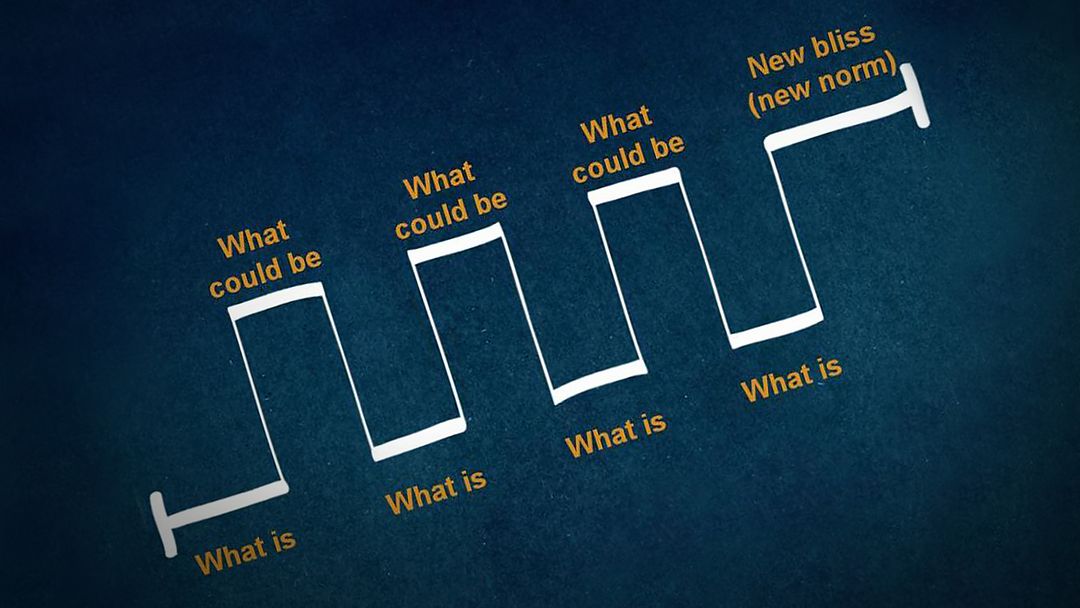
The secret structure of great talks
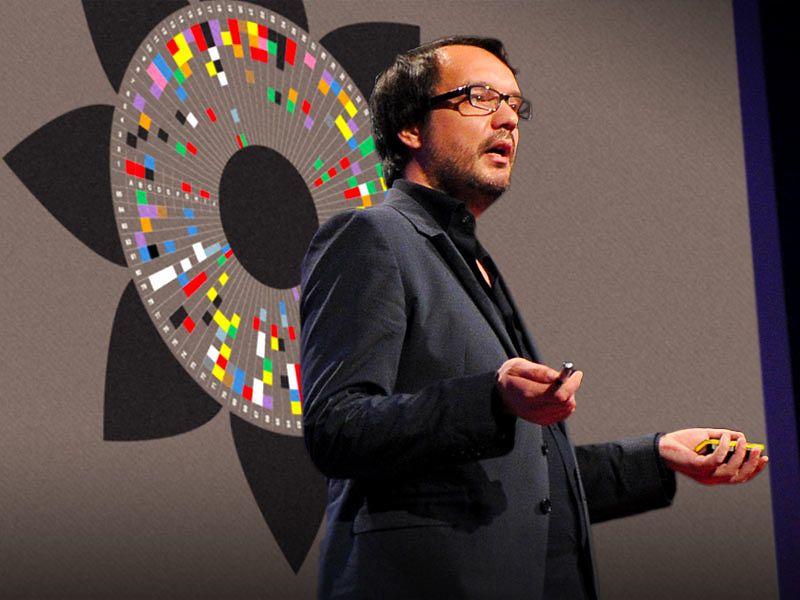
The beauty of data visualization
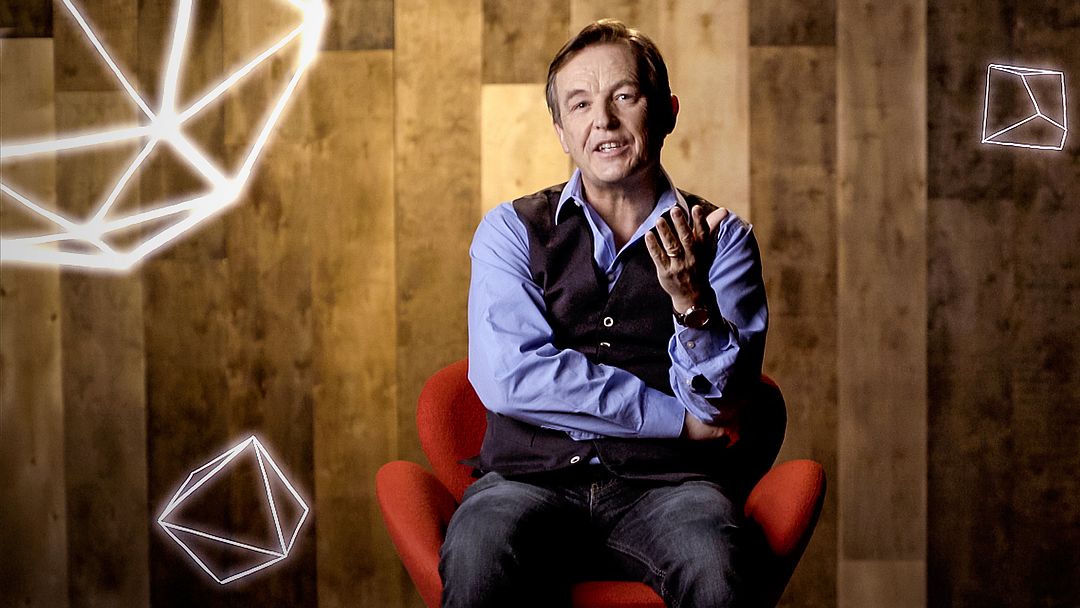
TED's secret to great public speaking
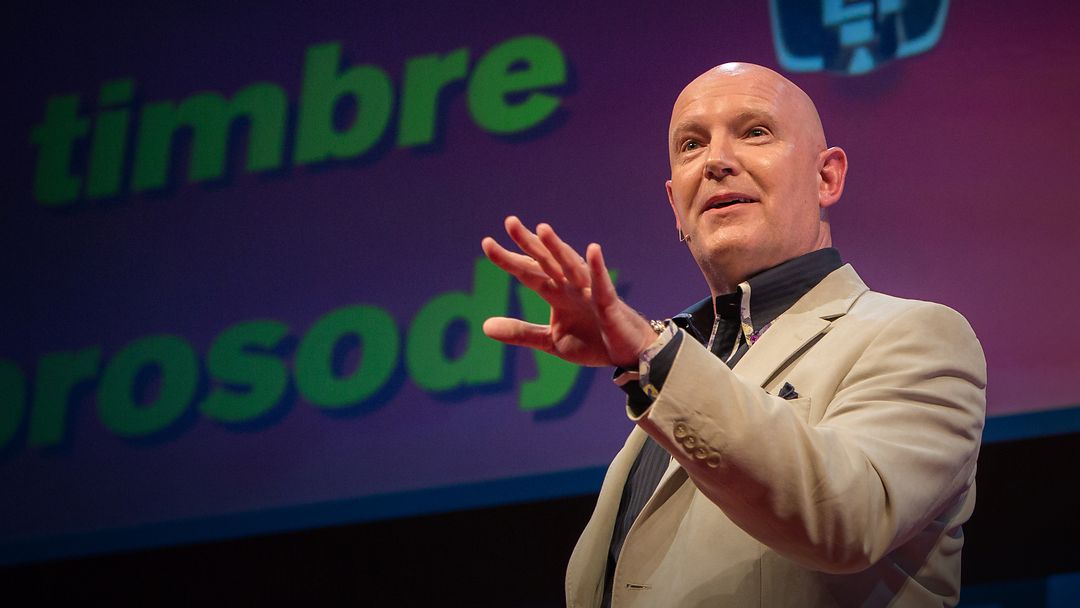
How to speak so that people want to listen
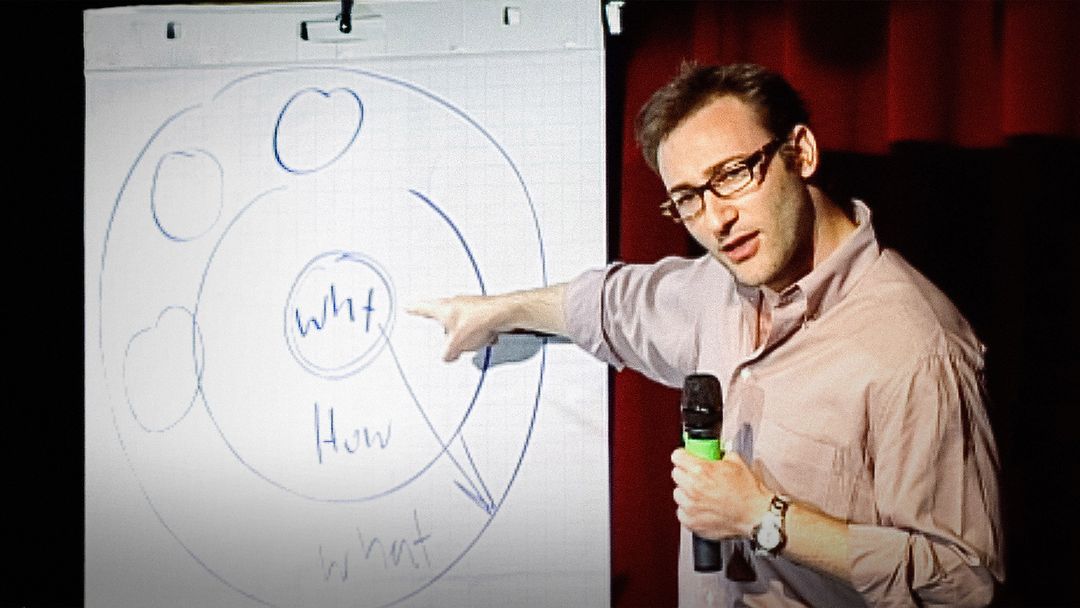
How great leaders inspire action

- Choosing Good Topics
- Controversial
- Demonstration
- Extemporaneous
- Informative
- School/College
- Special Occasion
- Public Speaking Help
- Writing a Speech
- Free Sample Speeches
- Share Your Speech
Free Sample of Speeches
in every category.

Use our free sample of speeches and speech outlines to inspire you and help you craft your presentation in all categories, including informative, persuasive, and various social events!
Why Study a Sample Speech?
1. Inspiration
Reading a sample speech can help you prepare your own speech in several ways. First, it can provide you with inspiration and ideas for creating your own speech. By reading a sample speech, you can see how others have organized and presented their ideas. You can use this as a starting point to develop your content and structure.
2. Understanding
Second, reading a sample speech can help you to understand the conventions and expectations for public speaking. By reading a speech that has been well-received by an audience, you can see how the speaker uses language, tone, and delivery to engage and persuade their audience. This can give you a sense of what works and doesn't and help you develop your style and delivery.
3. Avoiding Mistakes
Third, reading a sample speech can help you to identify and avoid common pitfalls and mistakes. By reading a successful speech, you can see how the speaker avoids common mistakes, such as rambling or repeating themselves, and you can learn from these examples to avoid making similar mistakes in your own speech.
Reading a sample speech can be a valuable resource as you prepare your own speech. You can gain insight, inspiration, and guidance for creating a successful and engaging speech by reading and analyzing a sample speech.
Make a note of what you find appealing/interesting about these speeches and apply the same tactics to your own work. You may also like to use the formats as a guide, to ensure your own speech flows smoothly and logically.
I would genuinely love it if you sent in your free speech sample to inspire others visiting here! If you would like to do this, scroll to the bottom of the page and send it on in.

Sample Speeches by Category:
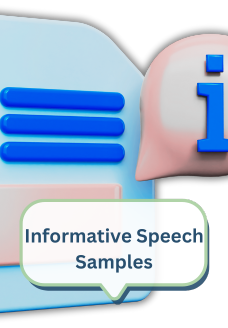
Here's my growing "free sample of speeches" list - I hope you find them useful!
Informative speech samples:.

Hybrid Animals
Childhood Obesity
How Humor Heals
Global Warming Speech
Sex Education Speech
Return to the table of contents of free samples of speeches by category.
More free samples of informative speeches coming soon!
Persuasive Speech Samples on:

Getting Civil
Energy Medicine
A Persuasive Speech & Outline
Banning Secondhand Smoke
Mandatory School Uniform Policy
Using Cell Phones Whilst Driving
More free samples of persuasive speeches coming soon!
For example, study our recent poverty persuasive speech sample with included outline, theme analysis, quality sources for information, and related speech topic ideas.

School Speech Samples :

High School Graduation Speech (1)
High School Graduation Speech (2)
High School Graduation (3)
University/College Graduation Sample Speech
Sample Speech by a Graduate from Teacher Training College
Valedictorian Sample Speech
Sample Graduation Speech
A Christian Speech from a Homeschool Graduate
Student Council Speech (1)
Student Council Speech (2)
Persuasive Speech about Bullying
Visitors on the Best Speech Topics website can use the submission form below to contribute free samples of speeches for students and others to use as a reference. Best Speech Topics will include the very best examples in the master list.
Demonstration Speech Samples and Outlines:

Outline of Scrapbooking Demonstration Speech
Demonstrative Speech Outline of Dog Grooming
Video of a Good Demonstration Speech
Controversial Speech Samples on:
Attorney-Client Privilege
Children and Cell Phones
Gender Selection
Artificial Intelligence
Alcohol vs Marijuana (Examples of both Impromptu & Extemporaneous)
Wedding Speech Samples :

Father of the Groom Speech
Free Best Man Speech
Funny Best Man Speech
Free Maid of Honor Speech
Father of the Bride Speech
Mother of the Groom Speech
Mother of the Bride Speech
Maid of Honour Speech (funny)
Maid of Honor Speech (sentimental)
Miscellaneous Speech Samples:
Eulogy Speech Sample
Free Retirement Speech
Free Welcome Speech
50th Birthday Speech
40th Birthday Speech
Farewell Speech
Retirement Farewell Speech
Sample Retirement Speech
Funeral Speech
Free Birthday Speech
Welcome Speech to an Event
Motivational Speech Sample:

Motivational Speech on Weight Loss
Visitor Submission on Pursuit of Happiness
Why You Should Donate Blood
Video Speech Samples
Guided sample student council speech video.
Guided Student Council Speech by SpeakFlight's Best Speech Topics
Guided Sample Valedictorian Speech Video
Guided Valedictorian Speech by SpeakFlight's Best Speech Topics
Sample of Speech on YouTube Informative Speech Video
How sampling transformed music | Mark Ronson
There you have it! Many of the free sample of speeches offered here at Best-Speech-Topics.com. As you can see from the developing list, the website wants more speech examples to motivate and inspire visitors. If you are inclined to submit a sample of any speech, please feel free to fill in the form below and send in a sample speech to show off your genius!
Here is a sample toast to you, our readers, as a warmup.
"Dear readers,
BST is honored to share our list of free sample speeches with you today. Best Speech Topics put a lot of thought and care into selecting these topics, and BST believes that each one has the potential to inform and engage a general audience.
We hope that you find these topics interesting and useful, and that they inspire you to learn more and engage with the world around you with your voice.
Here's to your continued learning and growth. Cheers!"
Free email delivery
MASTER INFORMATIVE SPEAKING WITH OUR FREE CHECKLIST!
We are offering you a FREE SpeakFlight Informative Speaking Preparation Checklist. This valuable resource is packed with step-by-step guidance to help you create compelling, memorable, and effective informative speeches.
Share Your Sample Speech
Have you ever prepared an original great speech for school, work, a special occasion, or a competition? Share it! If selected, your speech will appear on a Web page published as a permanent entry on the site. The written draft must be your original work and must not violate anyone else's copyright. Best Speech Topics may edit your speech for spelling, grammar, punctuation, and style.
Enter Your Speech Title
Author Information (optional)
To receive credit as the author, enter your information below.
Submit Your Contribution
- Check box to agree to these submission guidelines .
- I am at least 16 years of age.
- I understand and accept the privacy policy .
- I understand that you will display my submission on your website.
(You can preview and edit on the next page)
What Other Visitors Have Submitted
Click below to see contributions from other visitors to this page:

Click here to write your own.
You might like these
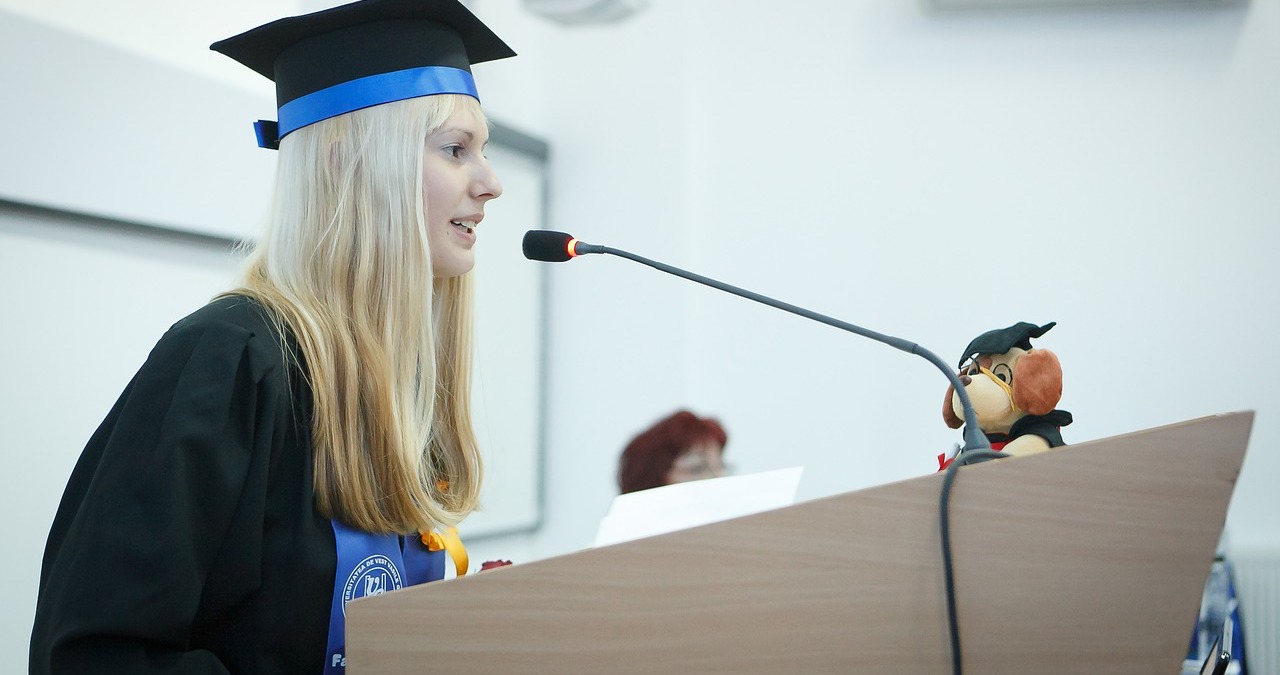
Example of a Valedictorian Speech
Use this example of a valedictorian speech to inspire you to write one of your own.

Motivational Speech on Losing Weight and Keeping it Off
Example motivational speech on losing weight to give ideas of what to include in a presentation to motivate and inspire an audience to take action.
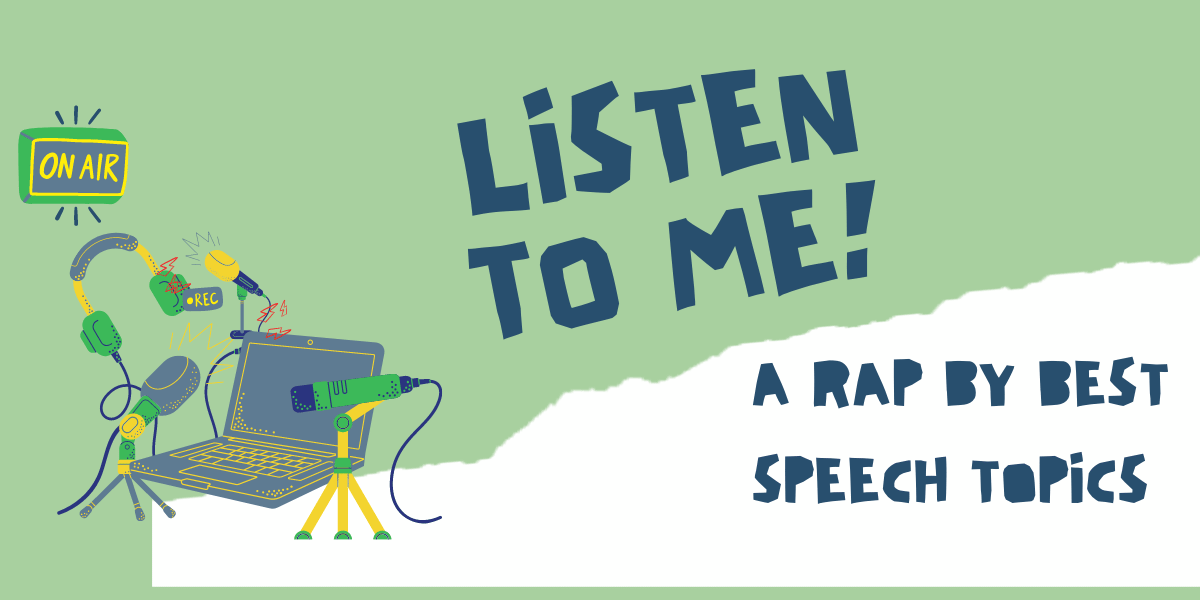
My Rap Speech Sample About Artificial Intelligence and Other Examples
In this article is we explore a recent rap speech sample as a use of rap as a bridge between music and speech. Rap provides a creative way to practice speech.
Recommended:
Tips for effective speech delivery, easily search for your speech type.
Use the search box below to find:
- Sample Speeches by Type
- Tips for a Specific Speech Type
- Topics for a Specific Speech Type
Sample Informative Speech on Caffeine and its Effects
A sample informative speech on caffeine and its beneficial and negative effects. Using topics that interest you will help make your public speaking presentation flow more smoothly. I chose caffeine as a topic because I love coffee! What are YOU passionate about?
Sample Retirement Speech Given to a Retiree
This sample retirement speech will help you to express your feelings to the retiree you are honoring on this bittersweet occasion. Use it to help create an outline of what you would like to say at the retirement party.
Return to the Top of the Page
Get to Know Us
- Privacy Policy
Attention Grabbers
- Positive Quotes for Kids
- Quotes for Graduation Speeches
- Poems & Quotes on Death
- Quotes on Retirement
Most Popular Pages
- Free Samples
- Good Speech Topics
- Hypnotize Your Audience
- Welcome Speech
Select a Speech Topic
- Argumentative
- Commemorative
- Inspirational
- Interesting
- Other Topics
Let Us Help You
- How To Write a Speech
- Demonstration Outline
- Informative Outline
- Introductions
- Using a Microphone
- Speech Help
- Speeches Made Easy

- Artificial Intelligence (AI)
- 3D & Animation
- Game Design & Development
- Graphic Design & Illustration
- UI/UX Design
- Office Productivity
- Video Editing
- Audio & Music
- Free Learning Resources
- Free Online Courses
The 10 Best Motivational Speeches To Inspire You And Get You In The Right Mindset

Recently, I have heard many close people feeling overwhelmed, uninspired and caught up in life. Hearing those stories, it hit me that even I was feeling that same way, and really wanted to find a way out of that mindset. It was then that I watched Steve Jobs' "How to live life before you die" speech that he gave at Stanford's graduation ceremony in 2005. It reminded me of the eagerness I had to conquer the world when I myself was graduating from college, and served as the perfect tool to get me inspired again.
Motivational speeches have the power to inspire you, enhance your creativity, reduce fear, offer a new outlook, and motivate you. They engage your mind and heart in a way that gets you thinking more clearly, seeing opportunities, and moving forward.

So if you need inspiration for your work, to start that project you always wanted to, or to keep going in a difficult situation, these 10 incredible motivational speeches will get you fired up and in the right mindset to succeed!
10 Great Motivational Speeches
With no further ado, here is a list of 10 amazing motivational speeches that I found very enlightening, and that perhaps also will resonate with you.
Warning: There may be some NSFW vocabulary in some of them.
How to Live Before You Die by Steve Jobs (2005)
In his 2005 commencement speech at Stanford University, Steve Jobs, the co-founder and CEO of Apple and Pixar, shared his personal life story and the lessons he learned along the way. The speech was delivered to the graduating class, to motivate the students as they embarked on their future endeavors.
Jobs divided his speech into three stories. The first was about connecting the dots, where he shared how dropping out of college and taking a calligraphy class later influenced the design of the Mac. The second story was about love and loss, where he shared the lessons he learned by being fired from Apple and starting over with NeXT and Pixar. He emphasized the importance of loving what you do and not settling.
The third story was about death. Jobs shared his experience with cancer and how facing mortality helped him make big choices in life. He encouraged the graduates to pursue their dreams, not waste time living someone else's life, and make the most of the limited time they have. Jobs concluded by urging them to "Stay Hungry. Stay Foolish," a message he discovered in his youth that encapsulated his life philosophy.
After you've listened to the speech, you'll know why it is considered one of the best motivational speeches out there.
A Memorable Quote
"Remembering that I'll be dead soon is the most important tool I've ever encountered to help me make the big choices in life.”
You Owe You by Eric Thomas (2015)
Eric Thomas, a renowned motivational speaker, delivers a powerful speech titled "You Owe You" in this video. The speech is part of his ongoing efforts to inspire and motivate people to take control of their lives and pursue their goals with unwavering determination.
In his speech, Eric Thomas emphasizes the importance of knowing what you want in life. He urges the audience to stop living life by accident and instead wake up every day with a clear purpose, spending the rest of their lives going after what they truly desire. Thomas stresses the significance of self-reflection and holding oneself accountable for the effort put into achieving one's goals.
His words come from his own life experiences. He encourages people to push themselves beyond their comfort zones and to give their all in the pursuit of their dreams. Thomas also emphasizes the need for self-discipline, and prompts to prioritize goals over temporary pleasures and distractions.
"You need to look at yourself in the mirror and say, why are you only giving 50 percent, what's wrong with you?”
Commencement Address at the 2014 Graduation by Jim Carrey
In 2014, renowned actor and comedian Jim Carrey delivered a commencement address at the Maharishi University of Management in Fairfield, Iowa. The speech was given to the graduating class of 2014, with Carrey sharing his personal journey, life lessons, and insights on finding purpose and meaning in life, with his very characteristic sense of humor.
Throughout his speech, Carrey shares the importance of following one's heart and trusting in the universe to guide them towards their true calling. He encouraged the graduates to find what the world needs that their talent can provide, as the effect they have on others is the most valuable currency there is. Carrey also touched on the idea that material possessions and accomplishments will eventually fade away, and what truly matters is love and wisdom.
Moreover, Carrey shared his personal experience of reaching the heights of success and fame, only to realize that he still needed to free himself from his own fears and limitations. He stressed the significance of letting go of concern and choosing to serve others, as this mindset allowed him to connect with people on a deeper level and inspire them to present their best selves
"What's yours? How will you serve the world? What do they need that your talent can provide? That's all you have to figure out. As someone who's done what you're about to go and do, I can tell you from experience the effect you have on others is the most valuable currency there is."
How Great Leaders Inspire Action by Simon Sinek (2009)
In September 2009, Simon Sinek, a leadership expert and author, delivered a TED Talk at TEDxPuget Sound titled "How Great Leaders Inspire Action". The speech aimed to encourage people to be great leaders, using examples from greatly leaded companies.
Sinek introduces the concept of the "Golden Circle," which consists of three concentric circles labeled "Why," "How," and "What". He argues that most companies and individuals communicate from the outside in, focusing on what they do and how they do it, but great leaders and inspired organizations think, act, and communicate from the inside out, starting with their "Why".
Sinek also explains that this pattern of communication taps into the limbic brain, which controls emotions, behavior, and decision-making. By expressing their "Why" first, leaders can create a deeper connection with their audience and inspire them to buy into their vision. Sinek says that people don't buy what you do; they buy why you do it, and this principle applies not only to businesses but also to individuals and movements.
"There are leaders and there are those who lead. Leaders hold a position of power or authority, but those who lead inspire us."
Control the Controllables by Inky Johnson (2017)
In this motivational speech, Inky Johnson, a former college football player who suffered a career-ending injury, shares his inspiring story and the lessons he learned along the way.
Johnson shares the importance of focusing on the aspects of life that one has direct influence over, such as attitude, effort, and response to challenges. He encourages his audience to let go of the things they cannot control and instead direct their energy towards what they can change. Johnson stresses that by taking ownership of one's actions and mindset, individuals can overcome obstacles and achieve their goals.
Throughout his speech, he draws from his own experiences, particularly the injury that ended his football career. Despite facing a huge setback, he chose to focus on what he could control: his attitude and his determination to move forward. Johnson's message is one of resilience and personal responsibility, urging his listeners to embrace the challenges they face and use them as opportunities for growth.
“We sometimes can forget what we have control over and how powerful that is."

6 Rules of Success by Arnold Schwarzenegge (2009)
In this motivational speech, Arnold Schwarzenegger, the renowned actor, former professional bodybuilder, and former Governor of California, shares his six rules of success. Schwarzenegger's message aims to inspire and guide individuals on their path to achieving their goals.
Schwarzenegger talks about the importance of having a clear vision, not being afraid to fail, and ignoring the naysayers. He stresses that success requires hard work, determination, and the willingness to push oneself beyond perceived limits. Then he highlights the significance of giving back to the community and using one's success to help others.
He shares his personal experiences and the challenges he faced on his journey to success. He encourages people to stay hungry, never be satisfied, and strive for improvement. Schwarzenegger also underscores the value of self-discipline, stating that it is essential to work hard consistently and stay away from shortcuts or excuses.
"Strength does not come from winning. Your struggles develop your strengths. When you go through hardships and decide not to surrender, that is strength."
“He for She” Speech by Emma Watson (2014)
In September 2014, actress Emma Watson, known for her role as Hermione Granger in the Harry Potter films, delivered a powerful speech at the United Nations Headquarters in New York. As the UN Women Goodwill Ambassador, Watson was there to launch the HeForShe campaign, a solidarity movement for gender equality.This inspiring speech motivates change both for men and women, in the context of feminism, to keep fighting for equal rights.
In her speech, Watson emphasized the importance of involving men in the fight for gender equality, extending a formal invitation to men, as gender equality is their issue too. Watson also addressed the misconception that feminism is synonymous with man-hating, clarifying that feminism is about equality and not discrimination.
Furthermore, Watson highlighted the need for women to be empowered to make their own choices, without being influenced by societal pressures or stigmas. She encouraged both men and women to embrace all parts of themselves, even those they may have abandoned due to gender stereotypes, in order to be more true and complete versions of themselves
"Both men and women should feel free to be sensitive. Both men and women should feel free to be strong… It is time that we all perceive gender on a spectrum, not as two opposing sets of ideals."
It Ain't About How Hard You Hit by Rocky Balboa (2006)
In the 2006 film "Rocky Balboa," Sylvester Stallone's character, Rocky, delivers a powerful speech to his son, Robert. Rocky and Robert are having a heart-to-heart conversation about Rocky's decision to return to boxing for one last fight. Although it is in the context of a movie, this speech is very inspiring and applicable to real life.
In the speech, Rocky explains that life is not about how hard you can hit but how hard you can get hit and keep moving forward, and that's how winning is done. Rocky also points out that if you know what you're worth, you should go out and get what you're worth, but you have to be willing to take the hits without blaming the world, saying you're not where you want to be because of someone else.
The main theme is the importance of personal responsibility and resilience in the face of adversity. He acknowledges that life is hard and will beat you to your knees if you let it, but it's about how fast you can get up and move forward. Rocky encourages his son to be willing to take the hits and believe in himself, no matter how difficult the challenges may be.
"If you know what you're worth, then go out and get what you're worth. But you gotta be willing to take the hits, and not pointing fingers(...)”.
We don't "move on" from grief. We move forward with it by Nora McInerny (2018)
Nora McInerny, a writer and podcaster, delivered a poignant and humorous speech at TEDWomen 2018 in November 2018. In her talk, she shares her personal experiences with love, loss, and grief, aiming to shift the way we approach and discuss these universal human experiences.
McInerny challenges the concept of grief, arguing that it is a natural and ongoing part of life after loss. She encourages people to embrace the complex emotions that come with grief, acknowledging that it is possible to experience joy and sorrow simultaneously.
The speech highlights the importance of supporting those who are grieving and creating space for honest conversations about loss. She stresses that a grieving person will eventually laugh and smile again, but this doesn't mean the pain disappeared. Instead, they are moving forward, carrying their love and memories with them as they navigate life after loss.
"Grief is not a problem to be solved. It's an experience to be carried."
"Carpe diem. Seize the day" by John Keating (1989)
In the 1989 film "Dead Poets Society," John Keating, an English teacher played by Robin Williams, delivers a powerful speech to his students about seizing the day, known as the "Carpe Diem" speech. The scene takes place in a classroom at Welton Academy, an elite boarding school for boys, where Keating is teaching poetry to his students.
Keating begins the lesson by having one of his students, Mr. Pitts, read the opening stanza of the poem "To the Virgins, to Make Much of Time" by Robert Herrick. The poem's central theme is the fleeting nature of life and the importance of making the most of one's time. Keating then introduces the Latin phrase "carpe diem," which means "seize the day," and encourages his students to embrace this philosophy.
To drive home the point, Keating invites his students to look closely at the faces of former Welton students in old photographs, pointing out that they are not so different from the current students. He reminds them that, like those in the photographs, each person in the room will die one day. Keating urges his students to make the most of their lives and seize every opportunity.
"Because we are food for worms, lads. Because, believe it or not, each and every one of us in this room is one day going to stop breathing, turn cold, and die."
Why Motivational Speeches Work
Motivational speeches aim to inspire and encourage a specific audience to take action, overcome challenges, and achieve their goals. These speeches are usually delivered to a particular group of people, such as students, employees, or athletes, with the intention of changing their perspective on the obstacles they face.
They can come from anyone who has valuable life experiences to share in a specific field, and are often given by successful entrepreneurs, politicians, coaches, or other public figures. However, they can also come from someone close to you, like a friend or teacher, who wants to inspire you to reach your full potential. Even fictional characters from movies or books can deliver memorable motivational speeches that resonate with audiences.
The key to a great motivational speech is that it resonates with the listener on a deep, personal level. When a speech strikes a chord with someone, they become more open to embracing new perspectives and taking action to change their life.
Motivational Speeches: Let’s Wrap it Up
These 10 incredible motivational speeches can be the spark you need to reignite your inspiration and motivation, as they offer diverse perspectives and wisdom to help shift your mindset in a positive direction.
But remember, this is just a small sampling of the many powerful motivational speeches out there. Seek out other sources that resonate with you personally to keep refreshing the way you live your life. Listen to speeches from those you admire in your field or who have overcome challenges similar to your own.

Use these speeches as a launching point to cultivate a success mindset. Believe in your own abilities, surround yourself with encouragement, and keep moving forward even in the face of obstacles. Stay hungry for motivation, and seize each day as an opportunity to create the life you desire.
About Author:
Latest posts:, cash giraffe review 2024: can you earn money playing games, is inboxdollars legit an honest inboxdollars review (2024), rosetta stone review: is the lifetime subscription worth it in 2024, lingomelo review: an in-depth look at this innovative language learning platform, more from our blog:, the 8 easiest languages to learn for english speakers (and why), 10 best legit games that pay real money instantly in 2024, how to write a whitepaper: the ultimate guide for marketers, 16 best online jobs for teens in 2024: earn money from home, 100 motivational teamwork quotes to inspire collaboration and success, the 15 best weekend jobs to grow your earnings, is cider legit honest cider clothing review 2024, 28 of the best sales books of all time to skyrocket your sales skills, featured reviews, featured posts, information.

Thank-You Speech
Thank you speech generator.
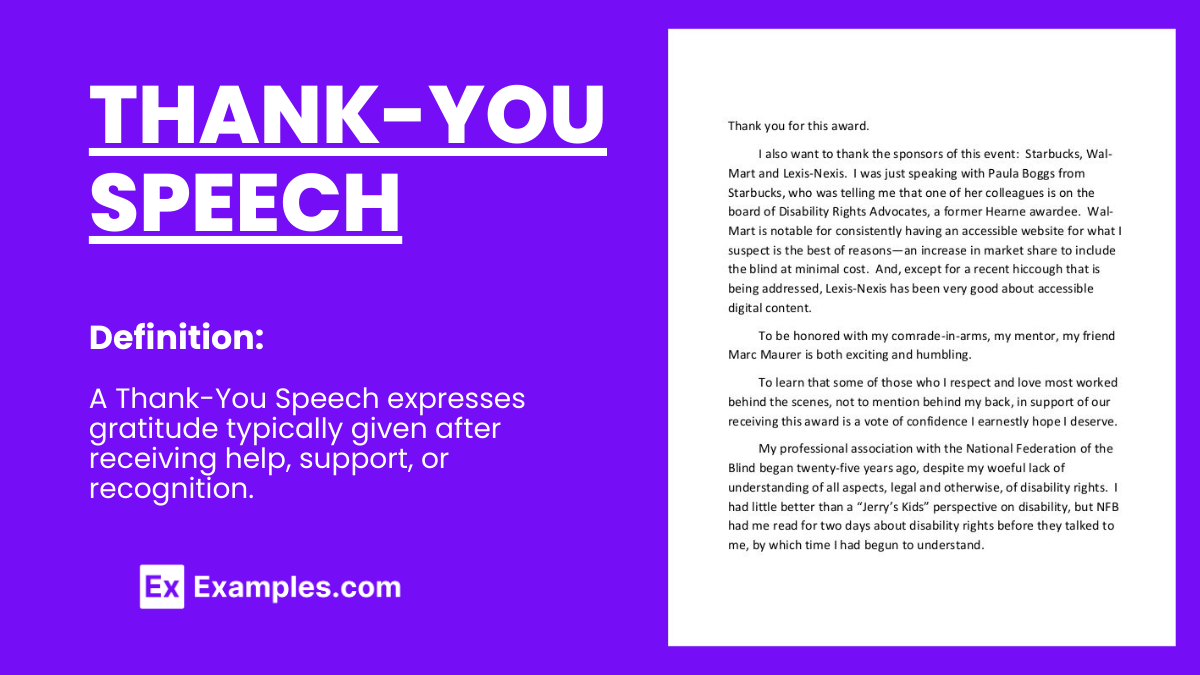
Crafting a heartfelt thank-you speech is an art that requires eloquence and sincerity. In this comprehensive guide, we delve into the nuances of expressing gratitude effectively. Discover a selection of speech examples , each tailored to inspire and assist in conveying your appreciation with impact and grace. Whether for a formal event or a personal occasion, these examples serve as a blueprint for creating a memorable and meaningful message. Let’s embark on this journey of gratitude together, exploring the art of thank-you speeches.
What is Thank You Speech? A thank you speech is a short talk where you express your gratitude towards people or organizations for their support, help, or contribution to a particular event, achievement, or occasion. It’s a way to acknowledge and appreciate the efforts and kindness of others, often highlighting specific examples of how they’ve assisted or influenced you. This speech can be given at various events, like award ceremonies, weddings, retirements, or any occasion where you want to publicly thank those who have helped you.
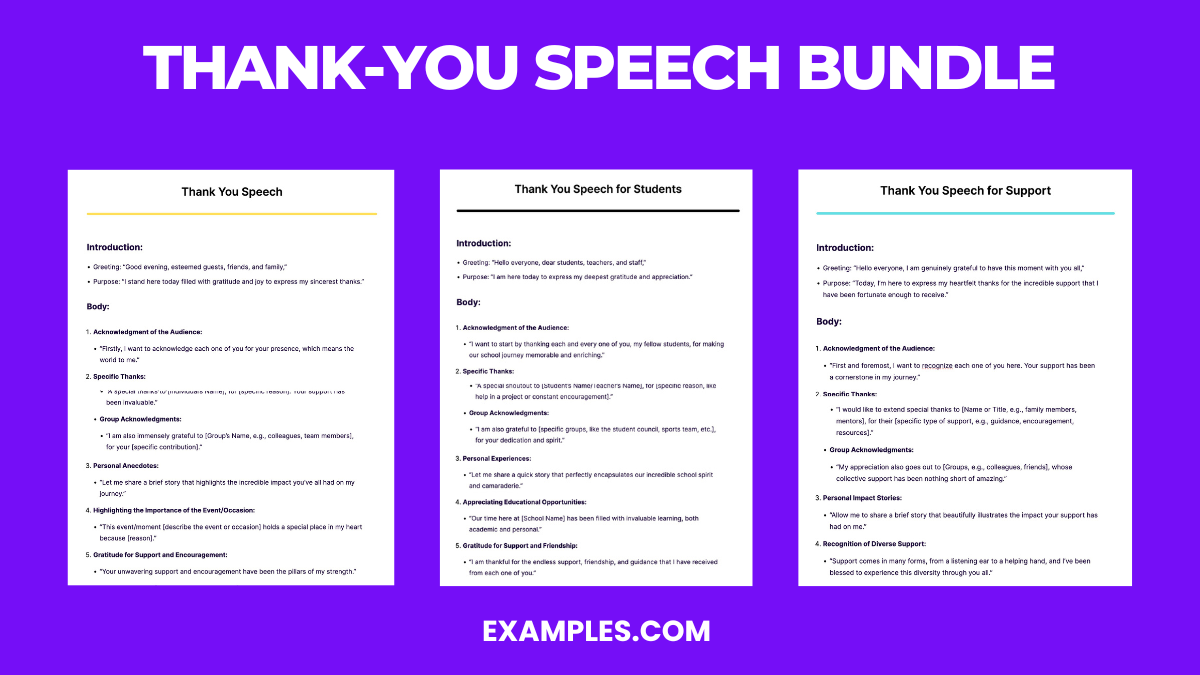
Download Thank You Speech Bundle
Have you ever heard of an old saying, “No man is an island”? We probably heard that a million times. That saying is actually true because when we became successful, we usually achieve that because someone has helped us. And our thank-you speech skills could be the best thing we can do in return. You may also see presentation speech examples. A thank-you speech template is your chance to express how truly and sincerely grateful you are to all the people who helped you along the way. It doesn’t matter how long your thank-you speech is, as long as you speak from the heart and making your thank-you speech a heartfelt and meaningful one.
Thank You Speech Format
Introduction.
Start with a warm greeting to the audience. Mention the occasion or reason for your speech.
Acknowledgment of the Audience
Acknowledge the presence of important guests, if any. Express your appreciation for everyone who has taken the time to be there.
Expression of Gratitude
Specify the person or group you are thanking. Describe the support, gift, or contribution they have made. Explain how their support was significant to you or the event/achievement.
Personal Reflections
Share a brief personal story or reflection that illustrates the impact of the support or contribution. Highlight the personal qualities of the individuals you are thanking, if appropriate.
Summarize your feelings of gratitude. End with a warm closing statement, wishing everyone well or expressing hope for the future.
Example of Thank You Speech
“Good evening, everyone. I stand before you today filled with immense gratitude. First and foremost, I want to express my deepest thanks to the organizing committee for this wonderful event and the opportunity to address this gathering. I am truly honored and humbled by the overwhelming support and encouragement from my colleagues, friends, and family. Your unwavering belief in me has been a constant source of strength and motivation throughout this journey. I also want to extend my heartfelt appreciation to the mentors and teachers whose guidance has shaped my path and instilled in me the values of perseverance and determination. A special thanks to the incredible team whose hard work and dedication made today possible. Your commitment and collaboration have been instrumental in achieving our collective goals. Lastly, to each person in this room, your presence here tonight signifies a shared commitment to our cause. Your support has not gone unnoticed, and I am deeply grateful for your continuous encouragement and belief in our vision. Thank you all for being a part of this remarkable journey. Your support means the world to me. Thank you.”
Thank You Speech Samples to Edit & Download
- Thank you Speech for Farewell
- Thank you Speech for Principal
- Thank you Speech for Science Exhibition
- Thank you Speech for Birthday Wishes
- Thank you Speech for Seniors on Farewell Party
- Thank you Speech for Teachers from Students
- Thank you Speech for Students
- Thank you Speech for Guest
- Thank you Speech for Support
- Thank You Speech to Boss
- Thank You Speech to Colleagues
- Thank You Speech after Winning Election
- Thank You Speech for Parents
- Thank You Speech to Wedding Guests
- Thank you Speech for Freshers Party
- Thank you Speech for Award
- Thank you Speech for Teachers
- Thank you Speech for an Event
- Graduation Thank You Speech
- Thank You Speech to Volunteer
Thank You Speech Examples & Templates
1. thank you speech example.
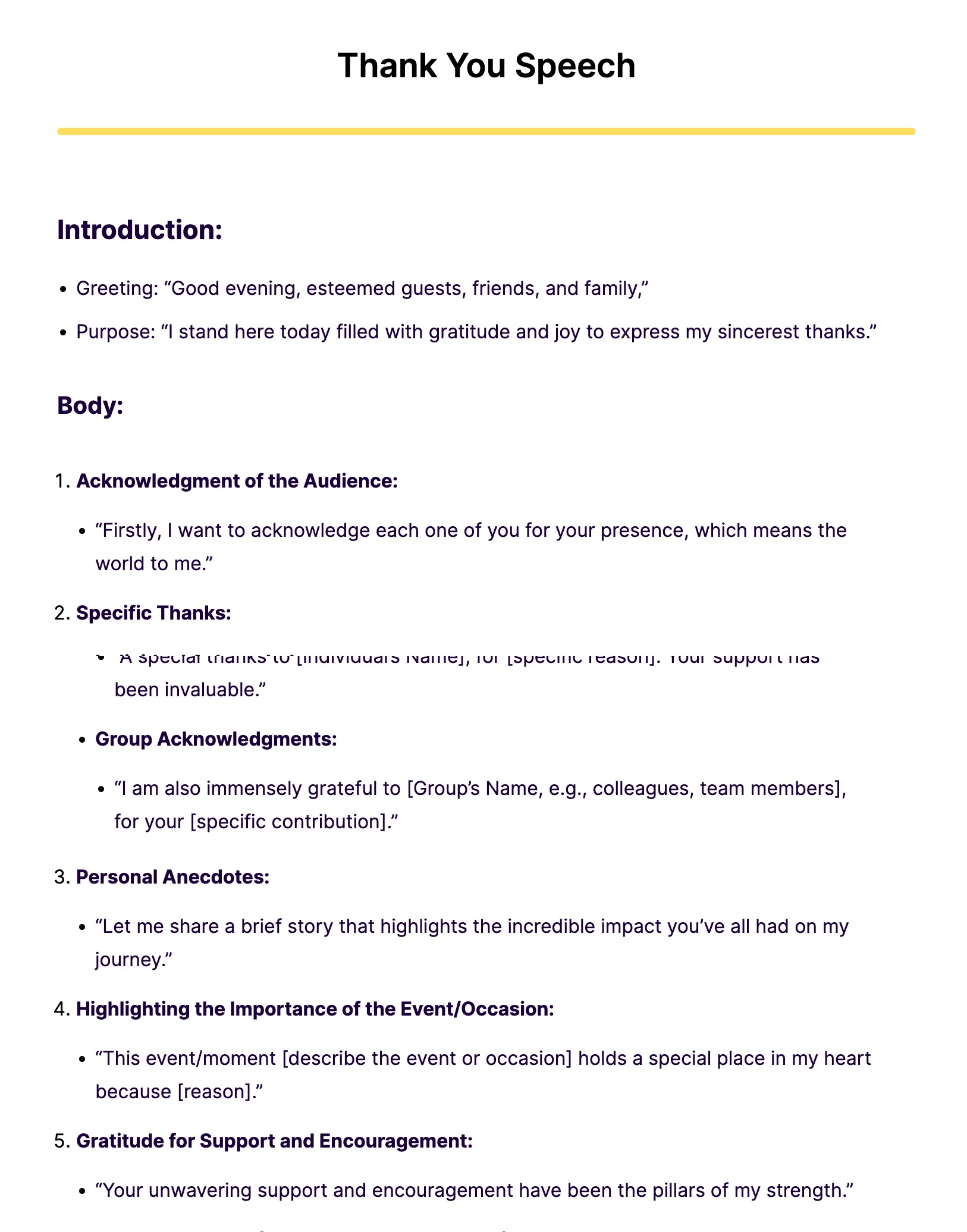
Free PDF Download
2. Thank You Speech for Students
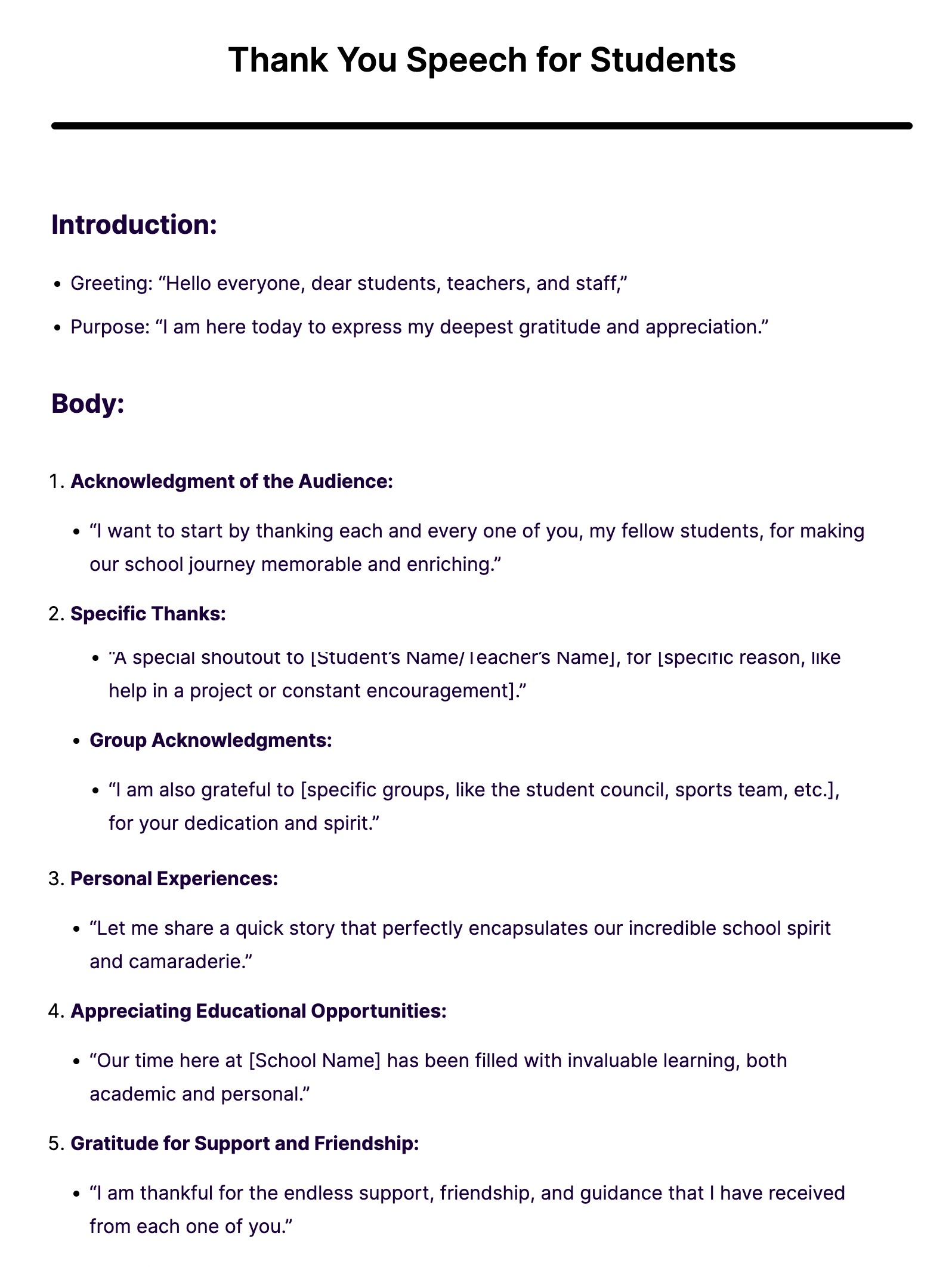
Edit & Download
3. Thank You Speech for Support
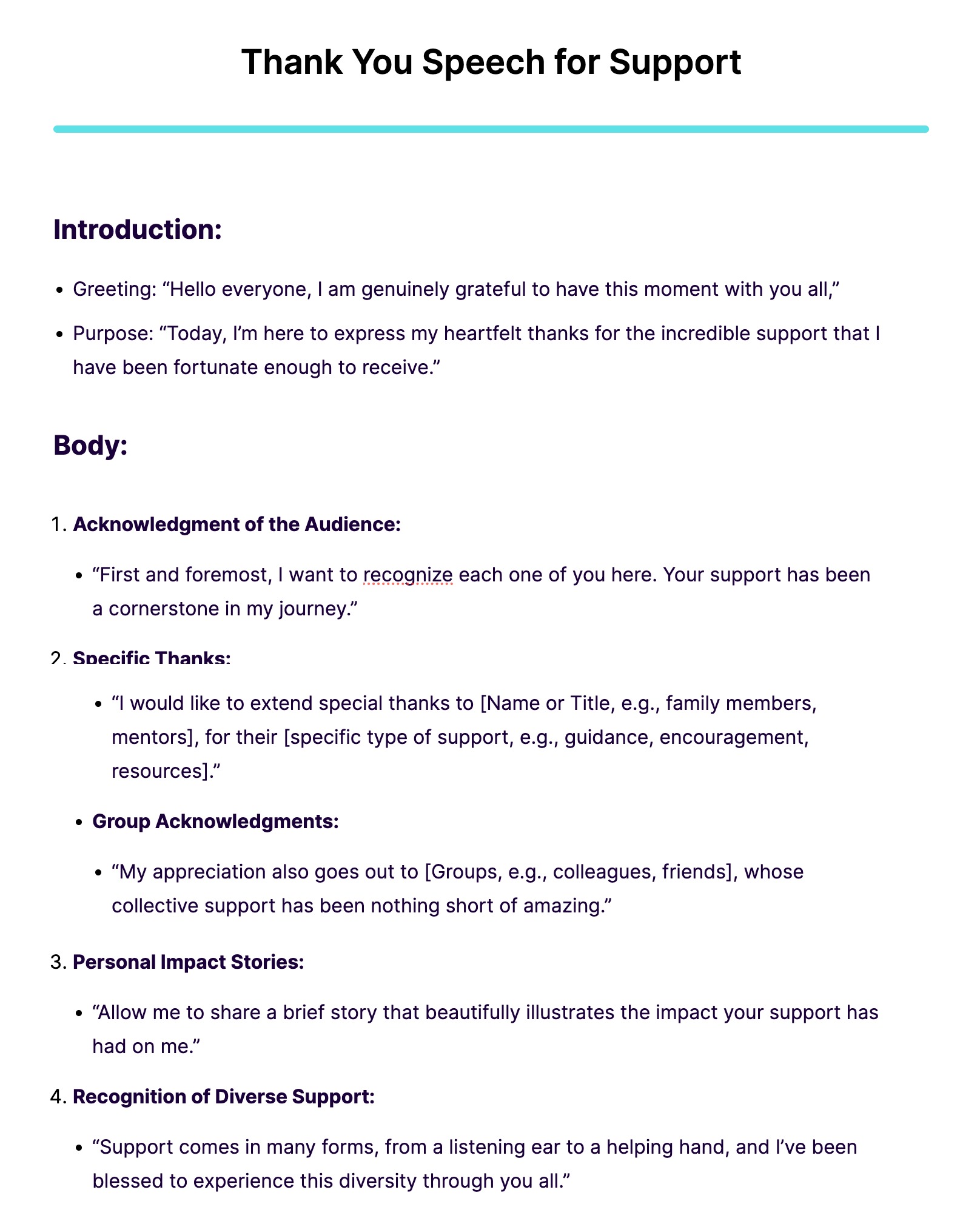
4. Short Thank-You Speech Example
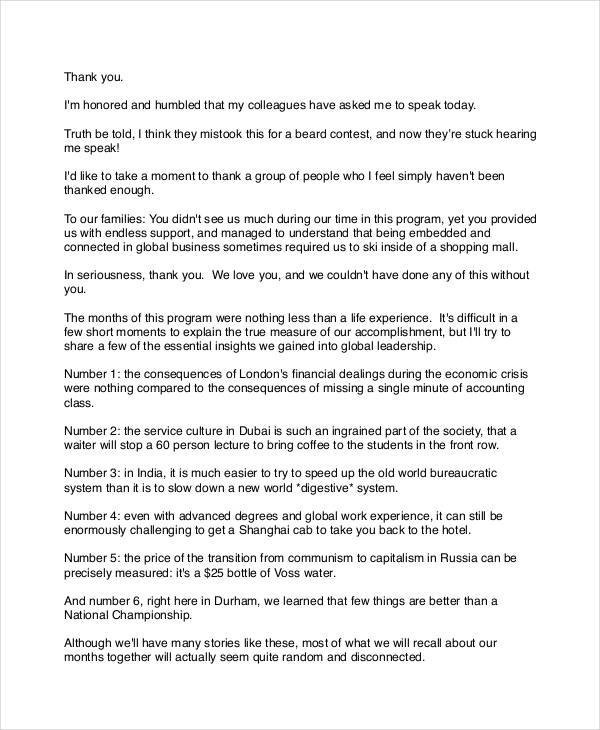
5. Wedding Thank-You Example
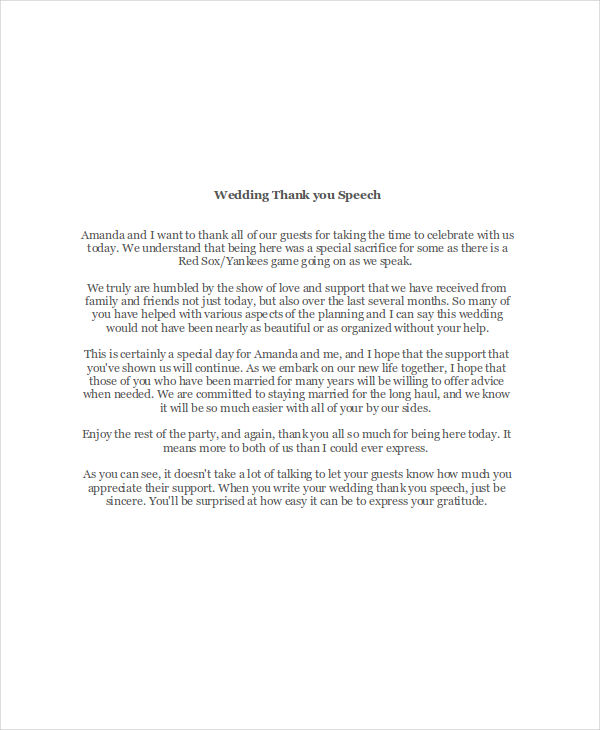
thank-you-notes.com
6. Business Speech Sample Example
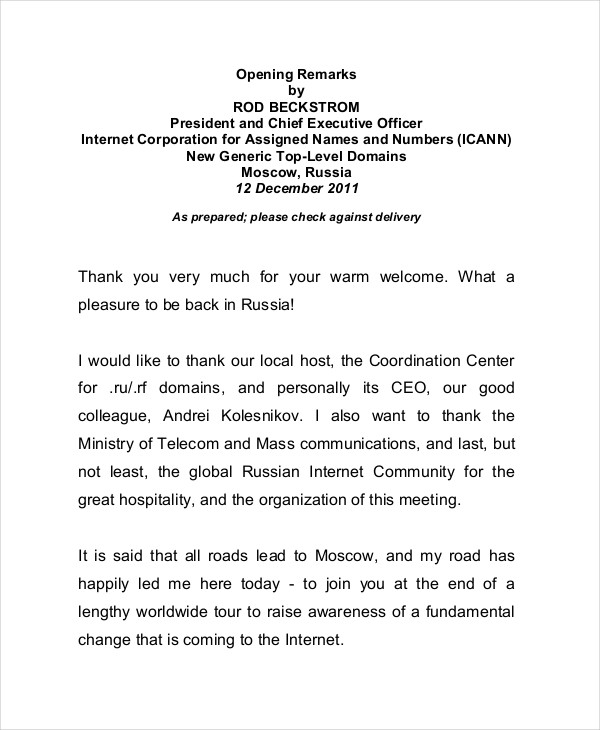
7. Retirement Thank-You Speech Example
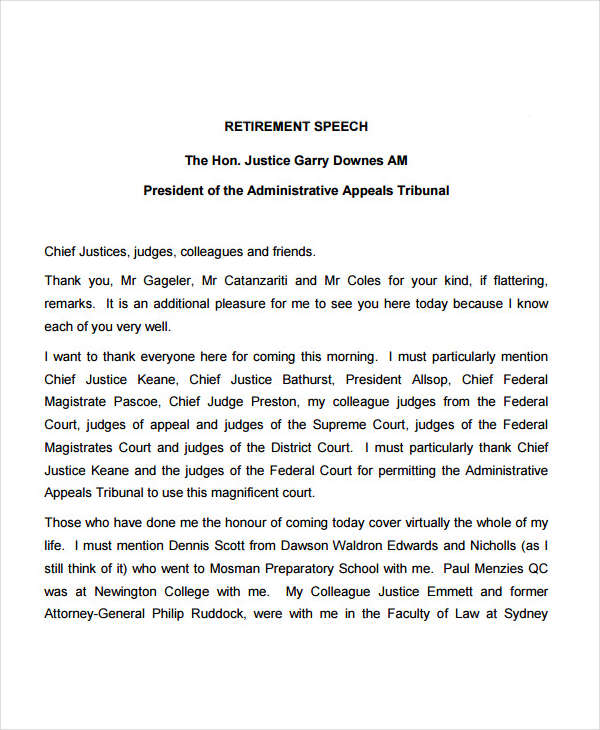
8. Teacher Thank-You Example

alanbarrell.com
9. Appreciation Short Thank You Speech
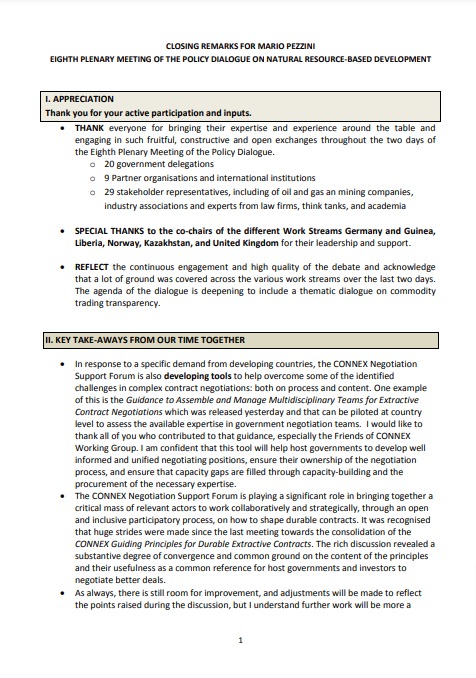
11. Formal Thank-You Speech
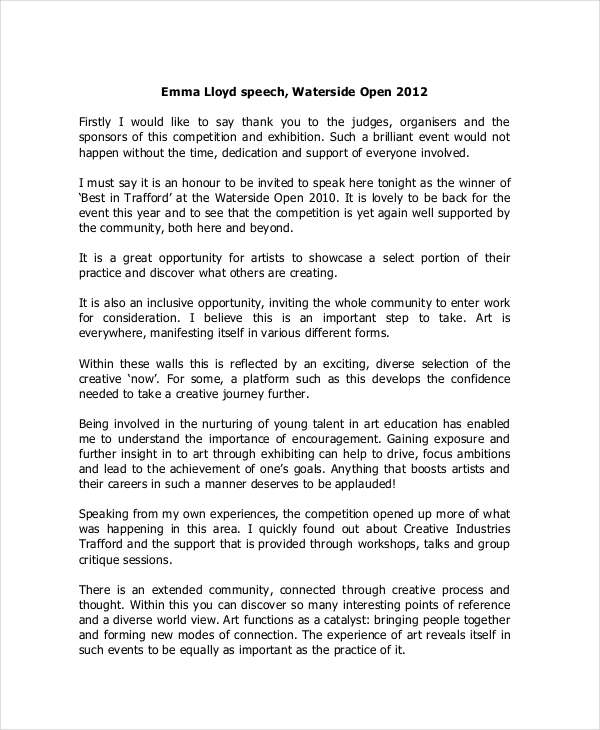
creativeindustriestrafford.org
12. Award Acceptance Speech Example
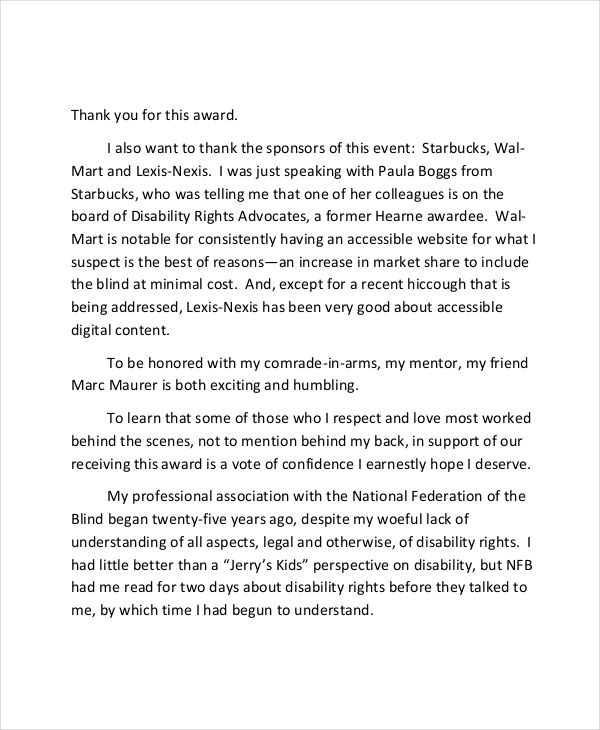
browngold.com
13. Thank-You Speech for Volunteers
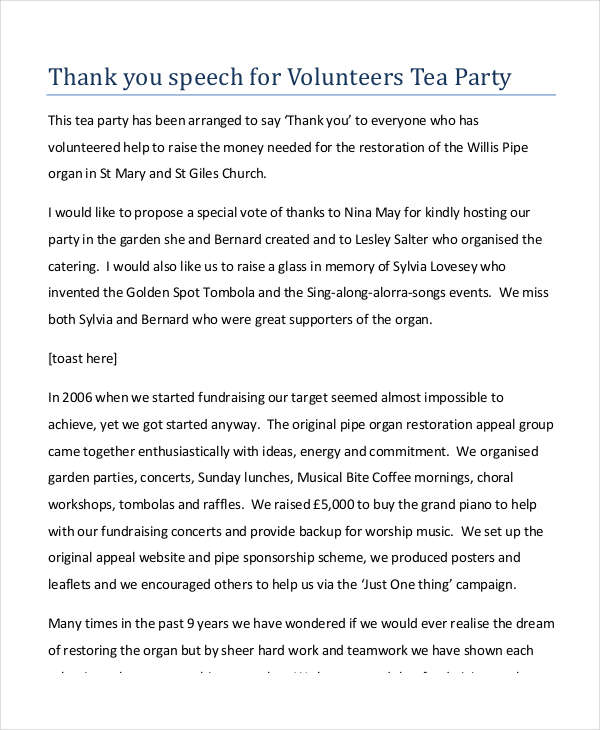
musicforallsmsg.org
10 Lines on Thank You Speech for an Event
Parts of a Thank-You Speech
Just like any other speeches, a thank-you speech has 3 main part: the introduction speech , the body of your speech, and the conclusion.
1. The introduction
In the introduction or opening of your speech, you need to tell everyone the reason why you are giving a thank-you speech. May be you just achieve a new milestone or just want to thank everyone. You may also see informative speech examples & samples
2. The body
This is where you mention the people that helped you work your way through and the things that they did.
3. The conclusion
This is the part where summarize your speech and end it by saying thanks. You may also like motivational speech examples & samples
What to Include in Writing a Thank-You Speech?
In a thank-you speech, there are three major essentials to include. You may also like award speech examples
1. Who are you thanking?
Note all the people that helped you achieve a personal or career milestone. It helps to rank them—the most important first.
2. What are you thanking them for?
Write the things that you are grateful about. It will make your thank-you speech more meaningful and significant. You may also see special occasion speech examples & samples
3. How much their gifts, lesson, time, guidance, and encouragement mean to you.
Appreciate and praise all the things people gave you that help you become successful.
How to Write a Thank-You Speech
The most exhausting part in writing a thank-you speech is that you have to remember the people who helped you along the way. But that shouldn’t stop you from giving them a thank-you. Follow these steps to write a meaningful thank-you speech for them. You may also check out appreciation speech examples & samples
- Prepare a thank-you speech outline.
- Make a complete list to all the people you should be thanking and arranged them according to their level of priority.
- Write what are you thanking them for.
- And, state your heartfelt appreciation for their gifts, time, and encouragement.
If you are looking for other kinds of speeches, we have wedding speech examples here as well.
Tips for Writing a Thank-You Speech
Your thank-you speech should be one of the most memorable keynote speeches you ever talk. That’s because it highlights the people and the things they did that means so much to you.
Do you have a thank-you speech coming up soon? Follow these tips and you’ll be fine.
- Always be prepared ahead of time.
- Write as if you are talking to one person only.
- Keep your thank-you speech short and sweet.
- Don’t be too formal. You are not writing a retirement speech . Include some funny events too.
- Practice and rewrite your speech.
How to Deliver a Thank You Speech for an Award or Special Occasion
- Begin with a warm greeting and express gratitude to the audience for their presence.
- Acknowledge the significance of the award or occasion. Express genuine appreciation for the recognition.
- Thank the individuals or organization presenting the award. Acknowledge their role and the value of the honor.
- Acknowledge and thank those who contributed to your success or the event’s success. Mention mentors, colleagues, or loved ones.
- Share briefly how the award or occasion has impacted you personally or professionally.
- Offer a brief inspirational message or reflect on the significance of the award or occasion.
- Conclude by expressing heartfelt thanks once again. Reiterate your gratitude and end on a positive note.
- Rehearse your speech to ensure a confident and sincere delivery. Maintain eye contact and speak clearly and passionately.
What do you say in a thank you speech?
- Acknowledging the Occasion: Recognize the significance of the event or award.
- Thanking the Hosts/Organizers: Express appreciation to those who organized the event or granted the award.
- Recognizing Supporters: Acknowledge the contribution of mentors, colleagues, or loved ones.
- Personal Impact: Share briefly how the occasion or award has affected you.
- Inspiring or Reflecting: Offer an inspirational message or reflect on the importance of the occasion.
- Closing with Thanks: Conclude by reiterating heartfelt gratitude and end positively.
FAQ’s
How do you start a thankful speech.
Begin a thankful speech by warmly greeting the audience, acknowledging the occasion’s significance, and expressing heartfelt gratitude toward the hosts, organizers, supporters, and attendees.
Is a thank you speech just meant for expressing gratitude?
While a thank you speech primarily expresses gratitude, it also acknowledges support, shares appreciation, reflects on significance, and inspires, fostering a deeper connection and meaningful engagement with the audience.
Does a thank you speech have to be formal?
A thank you speech can range from formal to informal, depending on the occasion. It should match the event’s tone, audience, and context while maintaining sincerity and respect.
How do you say thank you in speaking?
In spoken English, you can express gratitude by saying “Thank you,” or use variations like “Thanks a lot,” “Thank you so much,” “I really appreciate it,” or “I’m grateful.” Each phrase communicates appreciation in different levels of formality.
In the closing section, summarize your main points, reiterate your thanks, and end on a positive, forward-looking note. For detailed guidance on crafting each of these parts, you might find the following resources helpful. Harvard University offers practical tips on public speaking, which can be adapted for thank-you speeches. More information can be found on their website Harvard Tips for Public Speaking .
Text prompt
- Instructive
- Professional
Write a Thank You Speech for a community service project.
Create a Thank You Speech for donors at a fundraising event.
Purdue Online Writing Lab Purdue OWL® College of Liberal Arts
Welcome to the Purdue Online Writing Lab

Welcome to the Purdue OWL
This page is brought to you by the OWL at Purdue University. When printing this page, you must include the entire legal notice.
Copyright ©1995-2018 by The Writing Lab & The OWL at Purdue and Purdue University. All rights reserved. This material may not be published, reproduced, broadcast, rewritten, or redistributed without permission. Use of this site constitutes acceptance of our terms and conditions of fair use.
The Online Writing Lab at Purdue University houses writing resources and instructional material, and we provide these as a free service of the Writing Lab at Purdue. Students, members of the community, and users worldwide will find information to assist with many writing projects. Teachers and trainers may use this material for in-class and out-of-class instruction.
The Purdue On-Campus Writing Lab and Purdue Online Writing Lab assist clients in their development as writers—no matter what their skill level—with on-campus consultations, online participation, and community engagement. The Purdue Writing Lab serves the Purdue, West Lafayette, campus and coordinates with local literacy initiatives. The Purdue OWL offers global support through online reference materials and services.
A Message From the Assistant Director of Content Development
The Purdue OWL® is committed to supporting students, instructors, and writers by offering a wide range of resources that are developed and revised with them in mind. To do this, the OWL team is always exploring possibilties for a better design, allowing accessibility and user experience to guide our process. As the OWL undergoes some changes, we welcome your feedback and suggestions by email at any time.
Please don't hesitate to contact us via our contact page if you have any questions or comments.
All the best,
Social Media
Facebook twitter.
Communication Sciences and Disorders
Sharice clough to rejoin csd, this time as assistant professor.

The journey of Dr. Sharice Clough (MA-SLP, 2018) from a student to a professional in her field, and soon-to-be faculty member, speaks volumes about CSD’s bragging rights that they’re a department dedicated to cultivating leaders in the field of communication sciences and disorders.
“I’m excited and confident that Sharice will bring fresh perspectives, innovative ideas, and a deep commitment to excellence in her new role,” said Eric Hunter, Department Executive Officer and Harriet B. and Harold S. Brady Chair in Liberal Arts and Sciences.
After completing her master’s degree in Speech-Language Pathology at Iowa, Clough embarked on doctoral studies in Hearing and Speech Sciences at Vanderbilt University, followed by interdisciplinary post-doctoral training in the Multimodal Language Department at the Max Planck Institute for Psycholinguistics in Nijmegen, The Netherlands.
She will join us as an assistant professor in CSD at Iowa in Fall 2026.
Clough investigates acquired neurogenic communication disorders, such as traumatic brain injury, aphasia, and dementia in adults. More specifically, she strives to know more about how people use and comprehend language in rich and dynamic contexts, like those we encounter in daily life.
Real-world communication is interactive , involving a collaborative exchange between individuals. It is also multimodal , containing a variety of communicative cues like speech, gesture, facial expressions, and eye gaze. Her goal is to better understand how these flexible and social language abilities are disrupted by brain injury.
For example, in a recent behavioral experiment, she examined how adults with and without traumatic brain injury adapted their speech, gesture, and eye gaze behavior when talking to groups of listeners with different levels of knowledge based on their prior interactions. These types of social skills underlie the ability to design our communication appropriately and efficiently for different audiences (e.g., talking to a friend versus a group of coworkers).
"Although people with traumatic brain injury can have difficulty with social communication, we tend to assess language in very controlled and isolated contexts in both the clinic and lab," she said. “It’s critical that we incorporate these dynamic and rich properties of language into our practices to create assessments that sensitively detect communication difficulties and treatments that generalize beyond the clinic room into the real world.”
Clough uses a variety of methods to study the cognitive and neural systems that underlie neurogenic communication disorders, such as behavioral testing, eye-tracking, motion tracking, neuropsychological testing, and lesion mapping. In addition to advancing our understanding of the communication abilities of people with acquired brain injury, combining these methods allows her to learn more about the links between language and the brain.
“Iowa CSD is the perfect place to grow my research program and lab. My experiences as a master’s student in the department opened many doors for me and ignited a passion for science and discovery that I’m excited to pass on to future students. Iowa has all the right ingredients and an incredible community of scholars who I’m thrilled to be joining,” she said.
Hunter says he’s eager to see the research, academic, and leadership impacts Clough will undoubtedly have on the CSD program and its students.
“ Iowa CSD leans into its mission to foster a culture of growth and discovery. Our graduates –such as Sharice -- go on to achieve great things, and it’s doubly-fulfilling when those individuals return to give back to the community that supported them,” he said.
NOTICE: The University of Iowa Center for Advancement is an operational name for the State University of Iowa Foundation, an independent, Iowa nonprofit corporation organized as a 501(c)(3) tax-exempt, publicly supported charitable entity working to advance the University of Iowa. Please review its full disclosure statement.
Trump trial: After guilty verdict, former president makes statement at Trump Tower in New York
What comes next after trump's guilty verdict.
- Former President Donald Trump lashed out at New York state Judge Juan Merchan, prosecutors and the verdict in the hush money trial at a news conference at Trump Tower this morning.
- Allies of Trump rushed to his defense and condemned the outcome of the trial, in which he was convicted on all 34 felony counts of falsifying business records.
- Trump's attorneys vowed to appeal the verdict as soon as possible . Merchan yesterday scheduled Trump's sentencing for July 11, at which point he will officially become a convicted felon under state law.
- While many Democrats applauded the verdict, President Joe Biden's campaign has been careful not to strike a celebratory tone in its reaction. Biden has yet to publicly comment on Trump's conviction.
Biden slams Trump and his allies for calling the hush money verdict ‘rigged’
Alexandra Marquez is based in Washington, D.C.
In his first remarks since a New York jury found Donald Trump guilty of 34 counts of falsifying business records, President Joe Biden took a thinly veiled swipe at the former president’s attacks on the justice system.
“It’s reckless, it’s dangerous, it’s irresponsible for anyone to say this was rigged just because they don’t like the verdict,” Biden said, speaking to reporters at the White House.
The president’s comments came hours after Trump blamed him for his legal woes in remarks to the press and supporters , saying: “This is all done by Biden and his people. This is done by Washington. No one has ever seen anything like this.”
Read the full story here.
Final day of Trump trial whiplashes from sleepy courtroom to historic verdict
Katherine Doyle
For most of Thursday, there were few signs of life from the jury in Donald Trump’s hush money trial .
That all changed shortly after 4 p.m., when the panel of 12 New Yorkers delivered a note to the judge saying they had reached a verdict in the first criminal trial of a former U.S. president.
Follow live updates here.
The jury foreperson read the verdict aloud just feet from Trump, who has spent more than six weeks in court listening to testimony from 22 witnesses. Moments earlier, Trump and his legal team were in good spirits, with defense attorney Todd Blanche laughing and Trump smiling.
It took the jury less than two days to find Trump, the presumptive Republican nominee for president, guilty on all 34 felony counts of falsifying business records.
Here’s what happened on Day 23 — the final day — of Trump’s hush money trial .
‘Access Hollywood’ vs. now: How the GOP learned to stand behind Trump
Mark Murray
Almost eight years ago, key figures in the Republican Party distanced themselves from Donald Trump after the “Access Hollywood” video revealed him making lewd and aggressive comments about women.
Then-House Speaker Paul Ryan, R-Wis., disinvited Trump from a campaign event. Sen. Mike Lee, R-Utah, asked him to step down as the GOP nominee. And then-Rep. Jason Chaffetz, R-Utah, withdrew his endorsement .
“I’m out. I can no longer in good conscience endorse this person for president. It is some of the most abhorrent and offensive comments that you can possibly imagine,” Chaffetz said in October 2016.
Then Trump won the presidency just a month later.
Since then — after two impeachments, a 2020 presidential defeat and multiple indictments — today’s Republican Party has learned to stand 100% behind Trump when it is faced with bad news about its former president and current presumptive presidential nominee.
Pennsylvania voter said she was 'relieved' by Trump verdict
Emma Barnett
Kyla Guilfoil
Heather Dana, an Erie County voter, said she was "relieved" and "happy" after the jury's verdict in the Trump hush money case, but she added she was not expecting the jury to deliver a verdict by Thursday.
"I was kind of surprised that they all unanimously were able to come to that verdict," Dana said. "I kind of thought there would be — it would take a long time, it would be hard to get everyone to decide.”
"It’s kind of time to answer to some of the things he has done," she said. "He is not beyond the law’s reach" and "he’s just like everyone else.”
Trump campaign and RNC say they raised $34.8 million online on day of verdict
Ben Kamisar
Team Trump has long seen fundraising boosts pegged to Trump's legal woes and, according to a new press release from the campaign, Thursday was a massive day for Trump's election campaign.
The campaign announced it raised $34.8 million yesterday through the GOP fundraising platform WinRed. Anna Kelly, a Republican National Committee spokesperson, clarified in an email to NBC News that the total was raised into a joint fundraising committee that includes both Trump's campaign and the RNC. It's unclear how much money will go into each entity, and the national party can accept much bigger checks than the Trump campaign can. But this way of combining a nominee and the national party's fundraising haul is common in the campaign finance world.
While every indication from the Trump campaign and the RNC is that this was a massive haul, NBC News cannot independently confirm that, both because of lags in campaign finance reporting and the byzantine way the presidential campaigns (on both sides of the aisle) raise funds.
Biden campaign reacts to Trump remarks: 'This man cannot be president of the United States'
Rebecca Shabad is in Washington, D.C.
In response to Trump's remarks slamming the verdict, President Joe Biden's campaign spokesperson, Michael Tyler, said in a statement that Trump "cannot be president of the United States."
“America just witnessed a confused, desperate, and defeated Donald Trump ramble about his own personal grievances and lie about the American justice system, leaving anyone watching with one obvious conclusion: This man cannot be president of the United States," he said.
"Unhinged by his 2020 election loss and spiraling from his criminal convictions, Trump is consumed by his own thirst for revenge and retribution. He thinks this election is about him. But it’s not. It’s about the American people: lowering their costs, protecting their freedoms, defending their democracy," Tyler continued. He also said Trump "is sowing chaos, attacking the rule of law, and fighting for the only thing in the world he gives a damn about: Donald Trump.”
House 'weaponization' panel calls on DA Bragg to testify
Rebecca Kaplan
The House Judiciary Committee’s weaponization of government subcommittee is demanding that Manhattan District Attorney Alvin Bragg and prosecutor Matthew Colangelo testify before the committee on June 13, the panel said in a post on X .
The chair of the committee, Trump ally Jim Jordan, R-Ohio, is overseeing an investigation into Bragg and Colangelo, but this is the first substantive move by House Republicans since Trump's conviction yesterday.
A committee aide told NBC News that this is a request, not a subpoena. Prosecutors would be all but certain to not testify in the middle of an ongoing case, which the case will be if Trump appeals it, as expected.
‘These are bad people’: Trump unloads after his historic guilty verdict
Less than 24 hours after being found guilty on 34 felony counts , Donald Trump stood in front of a backdrop of American flags and was ready to get weeks of frustration off his chest.
The pugilistic former president spent 40 minutes unloading rambling comments peppered with mistruths and distortions to defend himself during a news conference at Trump Tower in Manhattan.
The event was the beginning of a new reality: Trump is now the first former president to be convicted of a crime.
“This is all done by Biden and his people,” Trump said opening the news conference, continuing without evidence to directly blame President Joe Biden for his legal woes. “This is done by Washington. No one has ever seen anything like this.”
Former White House deputy press secretary Hogan Gidley said many Americans believe former President Trump’s conviction in his criminal hush money trial was the result of a biased judge and jury in New York.
Trump says Nov. 5 is 'the most important day in the history of our country'
Trump finished his remarks saying that Election Day, Nov. 5, is "the most important day in the history of our country."
He then walked off without taking questions from the media.
Trump supporters outside Trump Tower

Trump calls the two impeachments against him hoaxes, disparages lawmakers who investigated Jan. 6
Trump brought up the two impeachments against him — the first in 2019 and the second not long after the Jan. 6 insurrection in 2021. He called both impeachments by the House hoaxes.
He then called the House select committee that investigated the attack on the Capitol in the last Congress a "committee of thugs."
"They call it select committee. I call it the unselect committee of thugs," he said.
Trump refuted the testimony from Cassidy Hutchinson, saying he didn't attack the Secret Service agent who didn't want to drive him to the Capitol after the "Stop the Steal" rally on the day of the insurrection.
"I supposedly went to the driver and I grabbed him around the neck," he said. "And he rebuffed me, and then I went to the other guy, who I think is a black belt in karate, and he's slightly younger than me."
Trump said a friend told him not to dispute that because it "makes you look like the toughest cookie we've ever seen."
"You should have let that go on. But the fact is, it never happened. It was all made up," he said.
Trump: 'It's not hush money'
Trump repeated his claim about the nondisclosure agreement that Michael Cohen paid porn actor Stormy Daniels for, saying the related payments were legal because they were for standard NDAs.
"It’s a big deal, the nondisclosure agreement, totally honorable, totally good, totally accepted," Trump said. "Every company has nondisclosure agreements."
"It's a disgrace," the former president continued, going on to emphasize that because the payments were made for NDAs, they should not be considered "hush money."
"So it's not hush money. It's a nondisclosure agreement. Totally legal. Totally common," Trump said.
Trump says he's going to appeal the verdict 'on many different things' and calls judge a 'tyrant'
Trump said that "the people of our country know it's a hoax. ... They get it, you know, they're really smart."
"We're going to be appealing this scam. We're going to be appealing it on many different things," he said.
The judge "wouldn't allow us to have witnesses, you wouldn't allow us to talk, you wouldn't allow us to do anything," Trump added. "The judge was a tyrant."
Trump says he's going to jail for '187 years' — he could actually face a fine, probation or up to four years in prison
Dareh Gregorian
As Trump railed against the verdict, calling the trial "ridiculous," he claimed that he is "going to jail for 187 years."
As a first-time, nonviolent offender, it is unlikely that Trump will face a long sentence — and perhaps could not even have to go jail at all.
Trump was convicted on 34 counts of falsifying business records , a class E felony that is punishable by a fine, probation or up to four years in prison per count. It’s expected that any sentence would be imposed concurrently, instead of consecutively.
Trump complains about his lawyers as they watch to speech
Trump jumped back to one of his repeated defenses that he didn't know what the case was even about, adding that he was "very upset" with his own lawyers for not being clear about the charges being brought against him.
"Even my own lawyers, I get very upset with them because they don't say what it is," Trump said.
Trump's lawyer Todd Blanche was smiling in the crowd as Trump said this and complained that the charges didn't make sense.
Trump rips judge, verdict and trial, says witnesses were 'literally crucified'
Trump questioned the DA's indictment charging him with 34 counts of falsifying business records.
"I paid a lawyer, totally legal. I paid a lawyer, a legal expense," he said.
"It's not Sheetrock construction, or any other thing. It's a legal expense. Think of that. This is what the falsification of business records were. And I said, what else are you going to call it?"
Trump said he would have testified during the trial and wanted to testify, but he said: "The theory is you never testify because as soon as you testify ... they'll get you on something that you said slightly wrong, and then they sue you for perjury, but I didn't care about that. I wanted to."
Trump continued: "This is a scam. There's a rigged trial. It shouldn't have been in that venue. We shouldn't have had that judge."
"As far as the trial itself, it was very unfair. We weren't allowed to use our election expert under any circumstances," said Trump, who said that witnesses were "crucified" by Judge Merchan.
"You saw what happened to some of the witnesses that were on our side," he said. "They were literally crucified by this man who looks like an angel but he’s really a devil. He looks so nice and soft. People always say he seems like such a nice man. No, unless you saw him in action. And you saw that with a certain witness that went through hell."
Speaker Johnson suggests justices 'deeply concerned' about Trump prosecution
Lawrence Hurley Supreme Court reporter
Kyle Stewart
House Speaker Mike Johnson said today about Trump's conviction that he believes Supreme Court justices, some of whom he knows personally, are "deeply concerned" and he urged the court to step in when the case is appealed.
In an interview on "Fox and Friends," Johnson, R-La., said the conviction was "totally unprecedented" and "dangerous to our system" because it diminishes people's faith in the criminal process and the courts.
"People have to believe that justice is fair, that there’s equal justice under law. They don’t see that right now," he said. "And I think that the justices on the court, I know many of them personally, I think they’re deeply concerned about that, as we are. So I think they’ll set this straight but it’s going to take a while."
It is unclear if he was speaking generally about justices being concerned about the administration of justice or about Trump's case specifically, or whether he had spoken to any of them about it.
Trump's initial appeal will be in the New York state court system. The U.S. Supreme Court takes up a tiny proportion of cases and will only intervene in state cases if there is a constitutional or federal law issue.
Trump begins remarks saying 'these are bad people'
Trump started his off-the-cuff remarks saying, "These are bad people. These are in many cases, I believe, sick people."
He said "millions of people are flowing in from all parts of the world, not just South America, from Africa, from Asia from the Middle East, and they're coming in from jails and prisons, and they are coming in from mental institutions and insane asylums. They're coming in from all over the world into our country."
"We have a president and a group of fascists that don't want to do anything about it because they could right now, today, he could stop it," he continued. "But he's not. They're destroying our country. Our country is in very bad shape. And they're very much against me, saying these things."
Protesters are outside Trump Tower
Protesters are demonstrating outside Trump Tower on Fifth Avenue in Manhattan ahead of Trump's press conference there. They're holding signs that say, for example, "lock him up" and "guilty" in all caps.

How Trump and his allies are spinning his historic guilty verdict
Allan Smith
Bianca Seward
Trump and his allies immediately tried to flip the script after a New York jury found him guilty of 34 felony counts of falsifying business records yesterday.
Most of their pushback on the airwaves and social media echoed the points they were making as the trial was ongoing: They felt that Judge Juan Merchan was conflicted, the jury was made up of liberals and the case amounted to election interference to boost Biden.
As the dust from the historic criminal verdict began to settle , Trump and his backers sought to flood the zone to insist that the system was rigged against him the whole time.
“We didn’t do a thing wrong,” Trump said outside the courthouse yesterday after the unanimous guilty verdict. “I’m a very innocent man.”
Here’s how Trump and his allies went on the offensive.
Can Trump vote in November now that he’s been convicted of felony charges?
Jane C. Timm
Trump is joining the millions of Americans whose voting rights depend on their criminal records after a New York jury convicted him of felony charges in a hush money case.
But experts say Trump, the presumptive Republican presidential nominee, is unlikely to be disenfranchised by the felony convictions in the New York case, noting that it would come down to whether he goes to prison as part of his sentence.
Forty-eight states prohibit some or all Americans with felony convictions on their records from voting, according to the Sentencing Project, and an estimated 4.4 million Americans — about 2% of the voting-age population — could not vote in the 2022 elections because of those laws. The group estimates that more than 1 million of them live in Florida, where Trump established his official residency in 2019.
Senate, House Republican campaign committees say they each had their best fundraising day of the cycle
The National Republican Senatorial Committee and the National Republican Congressional Committee, the official campaign arms of Senate Republicans and House Republicans, respectively, said they each had their best fundraising day of the cycle yesterday.
Following the verdict, Jason Thielman, the NRSC's executive director, said in a post on X, "Outrage over the sham verdict against Trump has spurred average Americans into action! The NRSC just had its largest online daily fundraising haul of the cycle."
And Jack Pandol, communications director for the NRCC, posted on X that his committee also "shattered" a previous record for the best fundraising day of the cycle. Punchbowl first reported the NRCC news.
Biden campaign staff asked not to share personal opinions about Trump verdict on social media, sources say
Monica Alba
An email went out to Biden campaign staff yesterday asking them not to post personal opinions or their own takes about the verdict on social media, instead suggesting they amplify the official campaign and White House statements, two sources familiar told NBC News.
In a statement yesterday after the verdict, Biden-Harris 2024 Communications Director Michael Tyler said: “In New York today, we saw that no one is above the law. Donald Trump has always mistakenly believed he would never face consequences for breaking the law for his own personal gain. But today’s verdict does not change the fact that the American people face a simple reality. There is still only one way to keep Donald Trump out of the Oval Office: at the ballot box."
Group identifies online threats against Trump jurors, judge
Ken Dilanian
Ryan J. Reilly
A group that monitors right-wing social media, Advance Democracy, says it has identified online calls to dox jurors, Judge Merchan and others.
On the far-right website 8kun, an anonymous user posted the purported personal contact information and addresses for journalists, the presiding judge and some purported jurors. Advance Democracy said it has not determined whether the posted information is accurate.
Advance Democracy said it also identified “a high volume of social media posts containing violent rhetoric targeting Justice Merchan and Manhattan District Attorney Alvin Bragg. The group said it has not identified, however, any posts that could be perceived as concrete plans to engage in violence."
The group also said it detected general calls to organize in reaction to the verdict, but not specific details or plans for in-person activity. Some of the calls to organize include violent rhetoric (for example, calls “to go to Washington and hang everyone”).
In the lead-up to Trump's guilty verdict, false reports that spread on right-wing media about the jury instructions led to threats against Judge Merchan.
GOP Senate candidate Kari Lake says husband was subpoenaed as verdict was handed down
Arizona GOP Senate candidate Kari Lake reacted to Trump’s conviction on Newsmax last night and announced that her husband was subpoenaed while the verdict was coming down.
“As this was all coming down, a process server showed up at my door and served a subpoena on my husband. They’re, they’re lawfaring me to death,” she said.
Lake faces her own legal trouble after she was accused of defaming a Republican election official in Maricopa County, Stephen Richer, after her loss in the 2022 race for governor.
“They’re going to have to kill me to stop me,” she said, painting herself as the victim of judicial warfare.
Lake said she wasn’t surprised by the verdict, using one of her favorite campaign lines: “We’re living on planet crazy right now.” She also urged Trump supporters to empty their pockets to help him win the November election.
Trump downplays paper trail and reiterates NDAs are standard practice
In a lengthy post on Truth Social, Trump downplayed the evidence presented at the hush money trial, saying he was “not involved” in writing “legal expense” on the business records and expressing incredulity that such a thing would be considered a crime.
“My bookkeeper called a “Legal Expense,” on the “tiny” description line of the Ledger, a “Legal Expense,” openly paid to my lawyer, at that time a fully accredited one. I was not involved in that designation, but what else would you have called it? It was, in fact, a LEGAL EXPENSE. That is the so-called “CRIME,” Trump wrote.
Referring to Michael Cohen's efforts to secure the non-disclosure agreement with porn actor Stormy Daniels, Trump added, “My lawyer, at the time, did virtually everything on the NDA (NON-DISCLOSURE AGREEMENT), and I assumed that what he did was correct.”
Trump reiterated that he did “nothing wrong” and said NDAs are “standard, commonly used, and LEGAL.”
“IF THIS CAN HAPPEN TO ME, IT CAN HAPPEN TO ANYONE!” he wrote.
Trump attorney Todd Blanche not surprised by verdict, vows to win on appeal
Patrick Smith
Todd Blanche, Trump’s lead attorney in the hush money case, said this morning that he's not surprised about yesterday's historic verdict, but is confident the former president's conviction will be overturned on appeal.
Appearing on NBC’s "TODAY" show, a little over 12 hours since his client was convicted on 34 counts of falsifying business records, Blanche said: "This was a verdict we were expecting. We’re going to appeal and we’re going to win on appeal," he said.
Blanche repeated the Trump team’s long-held belief that it was impossible to get a fair trial in Manhattan, where Trump has low approval ratings.
Asked whether he was surprised that not one juror questioned the unanimous verdicts, Blanche complained that the outcome may have been different if the defense team was able to submit certain evidence, such as the tax records of witnesses.
As for whether Trump could face up to four years of jail time, one of the options available at his July 11 sentencing, Blanche said he hoped it wouldn’t come to that.
"Putting aside the fact he was president of the United States, he’s a grandfather, a husband, a father. He should not, he should not go to prison," he said.
"TODAY" co-anchor Savannah Guthrie asked whether Blanche might intervene and ask his client to stop personally attacking Judge Merchan, who will decide his fate.
"It’s not just President Trump who has complained about the judge, so have I," he said, before adding "it’s not my job to tell him how to communicate to the American people."
Blanche said that in the aftermath of the verdicts, Trump remained calm and he was "shocked at how he reacted in a very positive way."
NBC News’ Shaq Brewster spoke with voters in Kenosha, Wisconsin, who explained why they would still vote for Trump despite the New York conviction.
Trump campaign newsletter attacks trial's credibility
Megan Lebowitz
A Trump campaign newsletter, the Palm Beach Playbook, urged supporters to get involved in the campaign after the verdict.
The campaign also reiterated criticisms of the trial, calling it a "sham" and arguing that the verdict "is the result of the Left shredding the Constitution in their savage pursuit of raw political power."
Trump lawyer says appeal is coming 'soon'
Trump lawyer Todd Blanche said in an interview on CNN last night that "as soon as we can appeal, we will."
Blanche said in multiple news interviews yesterday that he believed Trump did not get a fair trial, pointing to the trial's venue, timing and judge.
Trump expected to hold news conference today
Trump said yesterday that there would be a news conference at 11 a.m. today in the Trump Tower atrium.
He will deliver remarks, the campaign said.
Trump spoke outside the courtroom following his guilty verdict, but he has yet to answer questions from reporters.
How Biden and his campaign use the verdict ahead of the election
The Biden campaign reacted to the verdict yesterday by saying Trump finally got his comeuppance.
Trump "has always mistakenly believed he would never face consequences for breaking the law for his own personal gain," campaign spokesman Michael Tyler said in a statement. "But today’s verdict does not change the fact that the American people face a simple reality. There is still only one way to keep Donald Trump out of the Oval Office: at the ballot box. Convicted felon or not, Trump will be the Republican nominee for president."
The campaign also sent a fundraising text and email to supporters about the verdict.
Biden hasn't spoken publicly about the verdict, though he solicited campaign donations after the trial o n X , writing, "There’s only one way to keep Donald Trump out of the Oval Office: At the ballot box."
Yesterday was the anniversary of his son Beau Biden's death, and he spent part of the day commemorating the somber moment by going to church and visiting the cemetery where his son is buried.
It's unclear to what extent both Biden and his campaign will highlight Trump’s conviction going forward.

IMAGES
VIDEO
COMMENTS
Before you start writing your speech, it is a good idea that you go through some good speech samples. The samples will help to learn how to start the speech and put information into a proper structure. Speech Examples for Students . Speech writing is a huge part of academic life. These types of writing help enhance the creative writing skills ...
Good speech writing embraces the power of engaging content, weaving in stories, examples, and relatable anecdotes to connect with the audience on both intellectual and emotional levels. Ultimately, it is the combination of these elements, along with the authenticity and delivery of the speaker , that transforms words on a page into a powerful ...
Famous Speeches and Great Talks. This list is organized by presenter name and then speech topic. Click the links below to jump to a specific speech. ... The course includes a 20-page PDF workbook (including templates and cheatsheets), plus new examples and applications that you can't find in Atomic Habits. ...
Analyze their response and tweak the joke accordingly if necessary. Starting your speech with humour means your setting the tone of your speech. It would make sense to have a few more jokes sprinkled around the rest of the speech as well as the audience might be expecting the same from you. 4. Mohammed Qahtani.
Examples of great persuasive speeches include Martin Luther King Jr.'s "I Have a Dream" and Steve Jobs' final speech. These show different ways to inspire and motivate people. Practice makes perfect. Learning from powerful speeches helps improve speaking skills and confidence in delivering messages that persuade others.
What makes this a great speech? - At only 404 words long, the speech is impressively economical with language. Its short length means that every word is significant, and commands its audiences' attention. - This is a great example of how speechwriters use superlatives. George VI says that this moment is "the most fateful in history".
Tell them (Body of your speech - the main ideas plus examples) Tell them what you told them (The ending) TEST before presenting. Read aloud several times to check the flow of material, the suitability of language and the timing. Return to top. A step by step guide for writing a great speech.
Farewell speeches: from a colleague leaving and to a colleague leaving. Golden wedding speech. Icebreaker speech for Toastmasters. Introduction speeches: for a guest speaker, and for oneself. Maid of honor speeches: 3 examples, including one for a sister. One minute speeches.
To organize your speech effectively, start by choosing a clear and specific topic that resonates with your audience. Next, create an outline with a strong introduction, main points supported by evidence or examples, and a memorable conclusion. Make sure to use transitional phrases to guide the flow of your speech.
10 Famous Speeches with Examples of a Good Speech. Great speeches have the power to move people, to inspire and motivate, and to create lasting change. They have the ability to capture the attention of an audience and leave a lasting impact. In this blog post, we will be discussing the power of speeches and how they can influence personal growth.
17. 1965 Cambridge Union Hall Speech by James Baldwin. "What is dangerous here is the turning away from - the turning away from - anything any white American says. The reason for the political hesitation, in spite of the Johnson landslide is that one has been betrayed by American politicians for so long.
The content, of course, but also the structure. All great speakers overlay their content on a well-known structure. Your speech structure is the glue that binds your points together. Without it, you cannot really have the impact you desire to have on the audience. The beauty of this is that a good structure is so subtle it is almost invisible.
Making your speech easy to understand Repeat crucial points and buzzwords. Especially in longer speeches, it's a good idea to keep reminding your audience of the main points you've made. For example, you could link an earlier main point or key term as you transition into or wrap up a new point.
13. Dwayne The Rock Johnson's eulogy for father Rocky Johnson, 'The show must go on'. Dwayne 'The Rock' Johnson was the source of two of the great speeches of 2020, one political, his 'where are you' critique of Trump in the aftermath of George Floyd's death, and one personal, an emotional tribute to father Rocky.
For example, people use one writing tool to put the speech's theme in a 15-20 word short poem or memorable paragraph, then build your speech around it. 3. Have a Clear Structure. When your speech has a clear structure to it your speech becomes more memorable. When writing your speech, have a clear path and a destination.
Let's take a closer look at ten of the best and most famous speeches from great moments in history. Abraham Lincoln, ' Gettysburg Address ' (1863). The Gettysburg Address is one of the most famous speeches in American history, yet it was extremely short - just 268 words, or less than a page of text - and Abraham Lincoln, who gave the ...
Example 1. Write a speech to be delivered in the school assembly as Rahul/ Rubaina of Delhi Public School emphasises the importance of cleanliness, implying that the level of cleanliness represents the character of its residents. (150-200 words) "Cleanliness is next to godliness," said the great John Wesley.
4. Make them laugh. Injecting a little humor into your opening line puts everyone at ease and makes your speech more memorable. Just make sure your joke is relevant and doesn't offend your audience. Example: "They say an apple a day keeps the doctor away, but if the doctor is cute, forget the fruit!". 5.
The secret structure of great talks. From the "I have a dream" speech to Steve Jobs' iPhone launch, many great talks have a common structure that helps their message resonate with listeners. In this talk, presentation expert Nancy Duarte shares practical lessons on how to make a powerful call-to-action. 18:00.
Opening Lines of the Top 10 Greatest Speeches of All Time. #1: Socrates - "Apology". "How you, men of Athens, have been affected by my accusers. I do not know.". #2: Patrick Henry - "Give Me Liberty or Give Me Death". "Mr. President, it is natural to man to indulge in the illusions of hope.".
Use our free sample of speeches and speech outlines to inspire you and help you craft your presentation in all categories, including informative, persuasive, and various social events! Why Study a Sample Speech? 1. Inspiration. Reading a sample speech can help you prepare your own speech in several ways.
20 Public Speaking Tips to Make You a Better Speaker. Tip #1: Know Your Audience. Tip #2: Prepare a Visually Appealing Presentation. Tip #3: Practice In Front of a Mirror & In Front of Others. Tip #4: Make Enough Rehearsals. Tip #5: Speak From the Heart. Tip #6: Use Props for Effect. Tip #7: Be Candid.
10 Great Motivational Speeches. With no further ado, here is a list of 10 amazing motivational speeches that I found very enlightening, and that perhaps also will resonate with you. ... The speech aimed to encourage people to be great leaders, using examples from greatly leaded companies.
Discover a selection of speech examples, each tailored to inspire and assist in conveying your appreciation with impact and grace. Whether for a formal event or a personal occasion, these examples serve as a blueprint for creating a memorable and meaningful message. ... Example of Thank You Speech "Good evening, everyone. I stand before you ...
Mission. The Purdue On-Campus Writing Lab and Purdue Online Writing Lab assist clients in their development as writers—no matter what their skill level—with on-campus consultations, online participation, and community engagement. The Purdue Writing Lab serves the Purdue, West Lafayette, campus and coordinates with local literacy initiatives.
UN Secretary-General António Guterres The theme of this year's World Environment Day is "land restoration, desertification, and drought resilience.". Humanity depends on land. Yet, all over the world, a toxic cocktail of pollution, climate chaos, and biodiversity decimation are turning healthy lands into deserts, and thriving ecosystems into dead zones.
For example, in a recent behavioral experiment, she examined how adults with and without traumatic brain injury adapted their speech, gesture, and eye gaze behavior when talking to groups of listeners with different levels of knowledge based on their prior interactions. ... Our graduates -such as Sharice -- go on to achieve great things, and ...
Your Excellencies, I wish to thank the government of Korea for the kind invitation to attend this first Korea-Africa Summit. Korea is a great example of what can happen when vision is matched with determination and a resolve to develop, with resilience, against all odds. The 'Hunan River miracle' was powered by Korea's determination to develop with pride.
Former President Donald Trump lashed out at New York state Judge Juan Merchan, prosecutors and the verdict in the hush money trial at a news conference at Trump Tower this morning. Allies of Trump ...